This is Essential Politics, our daily look at California political and government news. Here’s what we’re watching right now:
- Gov. Jerry Brown told the Times Wednesday that a decision by President Trump to withdraw from the Paris Accord on climate change would be “tragic.”
- Legislators at the state Capitol will winnow down the hundreds of bills pending by Friday afternoon, quietly killing some of them which have been sitting in what’s called the “suspense file.”
- African Americans in the California Democratic Party want an apology made to Rep. Maxine Water (D-Los Angeles) after her microphone was cut off at last weekend’s convention.
Be sure to follow us on Twitter for more, or subscribe to our free daily newsletter and the California Politics Podcast.
- Share via
Sen. Kamala Harris says she hasn’t considered running for president
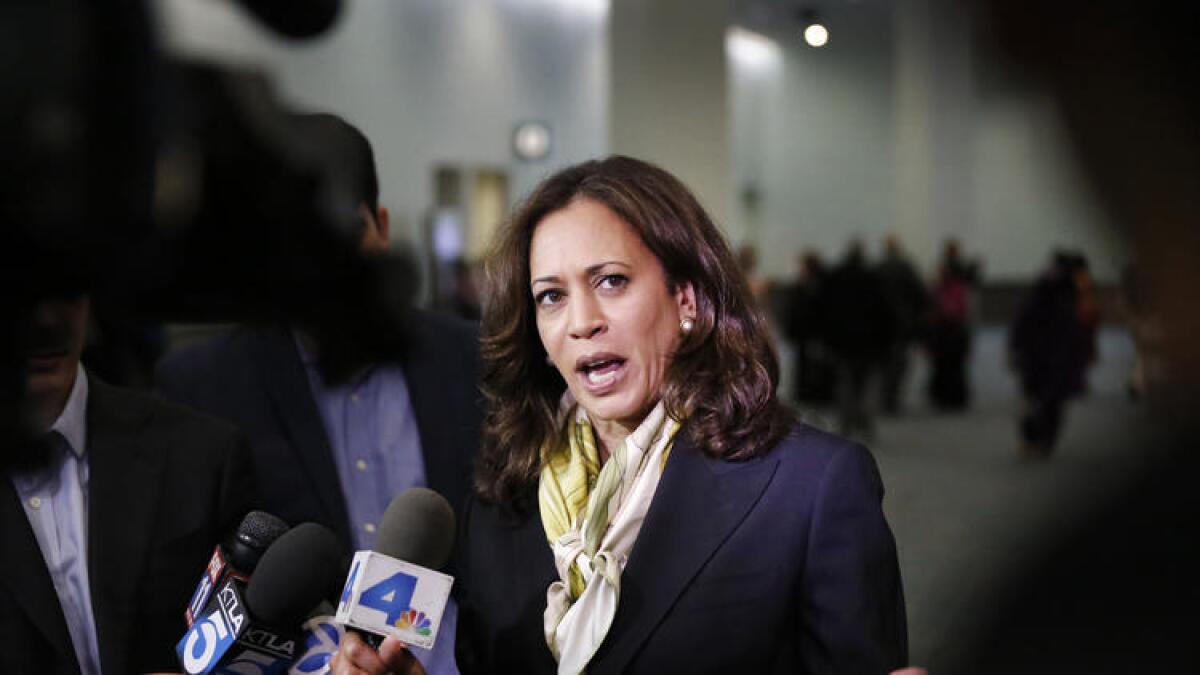
Despite swirling speculation, California’s U.S. Sen. Kamala Harris said she’s not giving “any consideration” to running for president in 2020.
Harris was appearing at the annual Code Conference hosted by the tech news site Recode in Rancho Palos Verdes on Wednesday night when site co-founder Kara Swisher asked if she had eyes on the White House.
“I’m not giving that any consideration. I’ve got to stay focused,” said Harris, a Democrat who was elected to the Senate in November after serving as California’s attorney general. After she won the seat vacated by former Sen. Barbara Boxer, Harris quickly gained a reputation as a potential presidential candidate in 2020.
Harris took questions from Swisher alongside Laurene Powell Jobs, a philanthropist and the widow of Apple founder Steve Jobs.
Though she brushed off the presidential rumors, Harris urged Democrats to try harder to make convincing arguments on issues such as climate change instead of just criticizing those who disagree with them.
She told the audience at the posh Terranea Resort where the conference is being held that it would be a mistake to dismiss the concerns of Americans who supported Trump in the November election. She said the issues that concern them — good jobs and the future of their families — are the concerns of all working-class Americans.
“There is a healthy number of people in our country who are feeling displaced, rightly,” Harris said. “I think we have to deal with that.”
Still, Harris dished out plenty of jabs at the Trump administration. She criticized Atty. Gen. Jeff Sessions for “resuscitating the war on drugs” and told him to “leave Grandma’s medical marijuana alone.” Harris also criticized the Trump administration’s more hard-line immigration policies, and said she was concerned about allegations of collusion between Trump’s campaign and the Russian government.
“These are serious times. These are not issues we can just sit around with a glass of Chardonnay debating and philosophizing about,” Harris said. “The decisions that are being made right now are impacting real human beings.”
Watch the entire interview:
- Share via
Trump wouldn’t release his tax returns, so lawmakers move to make it mandatory for California’s primary
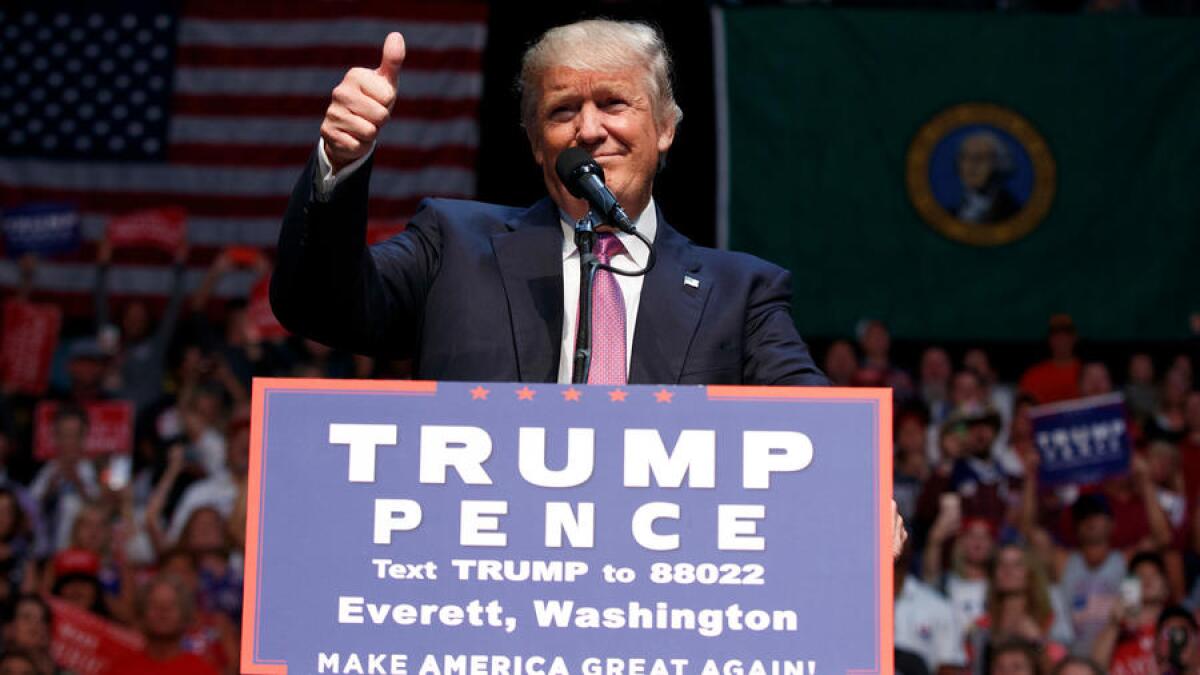
Legislation to require presidential candidates to disclose their tax returns in order to gain a spot on California’s presidential primary ballot won passage in the state Senate on Wednesday, but only after a tense debate that largely centered on President Trump.
Senate Bill 149 was approved on a strict party-line vote, 27-13. The bill now moves to the state Assembly, and was one of the last bills debated during a marathon session at the state Capitol to consider bills before a Friday deadline for action.
The bill would require presidential candidates to file copies of their income tax returns with state elections officials for the five most recent taxable years. Failure to do so would mean their name wouldn’t appear on California’s presidential primary ballot. The legislation was introduced in December, in the wake of Trump’s refusal to disclose his tax returns during the 2016 campaign. The president has continued to reject calls for the information.
“He’s shaping international policy which could enrich himself, and the American public has no way to know,” state Sen. Mike McGuire (D-Healdsburg) said of Trump during Wednesday night’s floor debate. “This legislation will help make transparency great again.”
Republicans denounced the bill as another in a long line of efforts by Democrats in the Legislature to lash out at the election of Trump and the defeat of Hillary Clinton.
“I get it that some people hate Trump,” state Sen. Joel Anderson (R-Alpine) said. “We’ve got to move ahead. We’ve got to get over it.”
Tensions flared after Anderson tried to amend the bill on the floor — first, to require statewide and legislative candidates to also release their tax returns, and then to require a birth certificate from candidates who want access to the state’s primary ballot. Both were rejected by Democrats.
A legislative analysis of SB 149 said some legal scholars believe the plan, which would be the first of its kind in the nation, would pass muster with the U.S. Constitution. Nonetheless, the analysis concluded that it would probably be challenged in court if signed into law.
- Share via
California Senate moves forward with bill that would overhaul Los Angeles County MTA
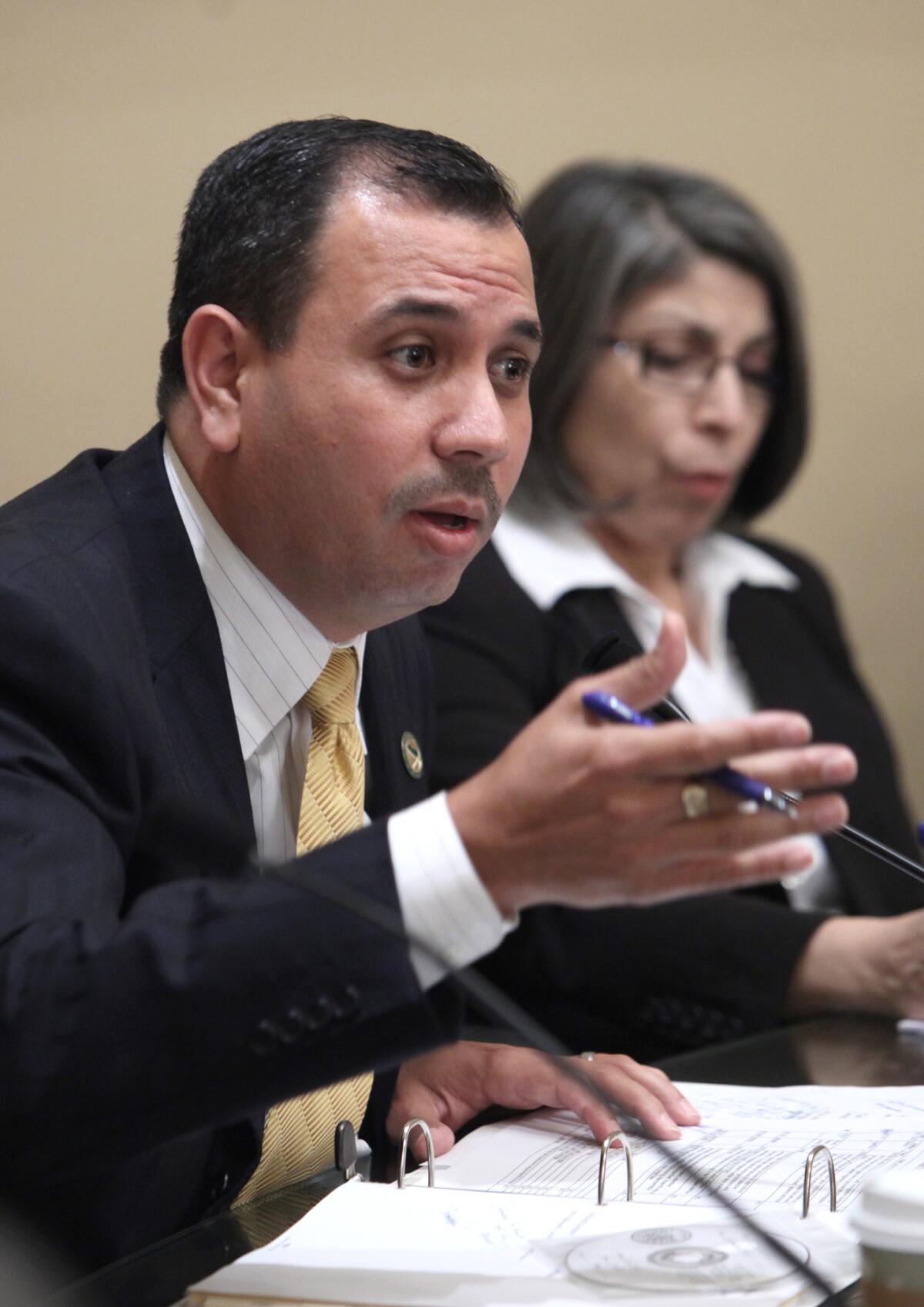
The state Senate on Wednesday approved a bill that would expand and reshape the agency that oversees mass transit in Los Angeles County.
Opponents of the measure include Los Angeles Mayor Eric Garcetti, the city and county of Los Angeles and the Los Angeles Area Chamber of Commerce.
The bill by Sen. Tony Mendoza (D-Artesia) was sent to the Assembly for consideration after squeaking by with a 22-11 vote in the Senate.
The measure would expand the Los Angeles County Metropolitan Transportation Authority board from 12 to 15 members. It would also reduce the number of county supervisors on the board from five to two, remove the appointment of two public members and increase Los Angeles City Council member appointments by the mayor from two to five.
“This will allow for proportional and fair representation,” Mendoza told his colleagues, adding that the board currently is made up of “haves and have-nots fighting to get their share.”
Sen. John Moorlach (R-Costa Mesa) opposed the measure because he said he saw it as Sacramento meddling in local policymaking.
But Sen. Scott Wilk (R-Palmdale) supported SB 268.
“Too much power is concentrated in too few people,” he said of the current board.
- Share via
Single-payer healthcare is popular with Californians — unless it raises their taxes
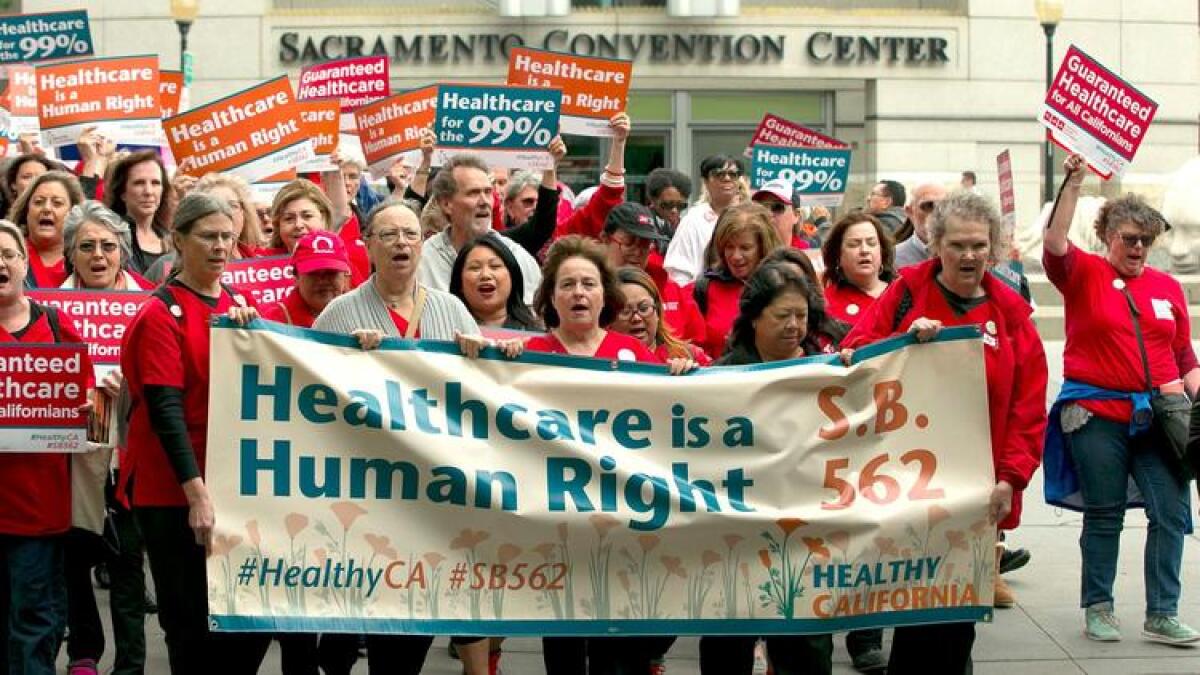
Almost two of every three Californians in a new statewide poll said they like the idea of a single-payer, government healthcare system, but far fewer support the idea if it includes a tax increase.
The poll released Wednesday night by the nonpartisan Public Policy Institute of California found that 65% of adults surveyed support the creation of a single-payer state healthcare program to cover all of the state’s residents, and 56% of likely voters approved of the idea. Opinion was sharply divided between Democrats (75% support) and Republicans (66% oppose) who were surveyed.
The single-payer proposal under consideration in the state Capitol, Senate Bill 562, assumes at least $50 billion in new taxes to fund the healthcare system. Asked about taxes, support drops to 42% of the adults surveyed and 43% of likely voters. While a majority of Democrats in the PPIC poll continued to support the idea if it means more taxes, support drops substantially among unaffiliated “independent” voters.
The state Senate is expected to consider the single-payer bill before the end of the week. A legislative analysis put the estimated total cost of a new healthcare system that covers all Californians at $400 billion, while an analysis released on Wednesday by supporters provided a $331-billion estimate. The pending legislation by state Sen. Ricardo Lara (D-Bell Gardens) does not identify what taxes would be raised but makes the enactment of the plan contingent on a full funding proposal.
- Share via
Knowingly exposing others to HIV should no longer be a felony, state Senate says
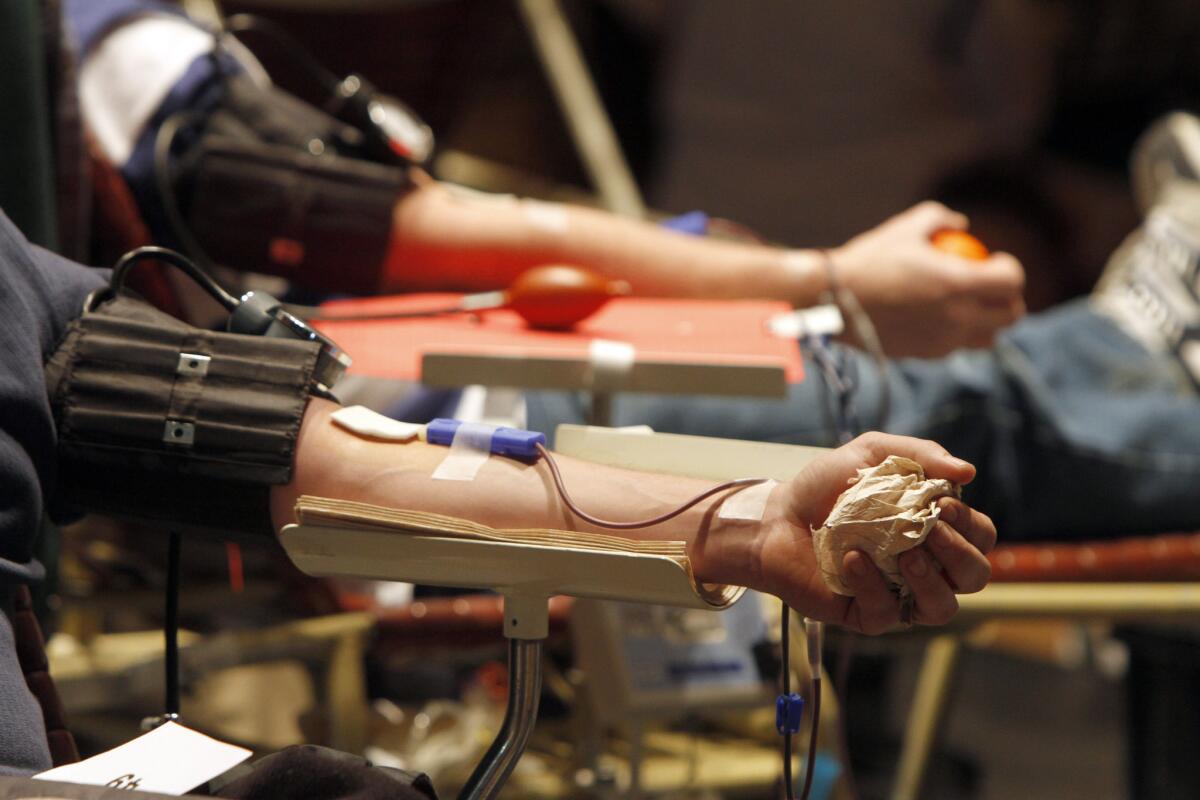
The state Senate on Wednesday voted to no longer make it a felony for someone infected with HIV to knowingly expose others to the disease by having unprotected sex without telling his or her partner about the infection.
The crime would be downgraded to a misdemeanor, and the bill would also apply to people who donate blood or semen without telling the blood or semen bank that they have acquired immunodeficiency syndrome, or AIDS, or have tested positive for human immunodeficiency virus, or HIV, the precursor to AIDS.
The measure, which next goes to the Assembly for consideration, was introduced by Sen. Scott Wiener (D-San Francisco), who said it is unfair to make HIV/AIDS the only communicable disease given such harsh treatment by prosecutors.
“These laws are irrational and discriminatory,” Wiener told the Senate, adding that the current felony status is “creating an incentive not to be tested, because if you don’t know your status you can’t be guilty of a felony.”
The measure was widely opposed by Republican lawmakers including Sen. Joel Anderson of San Diego. “If you intentionally transmit something that is fundamentally life-threatening to the victim, you should be charged and go to jail,” he said.
Sen. Jeff Stone (R-Murrieta) said, “My friends, it’s not a gay issue. It’s a public health issue. We shouldn’t allow someone to play Russian roulette with other people’s lives.”
Sen. Richard Pan (D-Sacramento), a physician, voted for the bill and argued that it undermines public health to imprison those with HIV under the current law.
- Share via
Hillary Clinton: ‘I was the victim of a very broad assumption I was going to win’
Hillary Clinton said on Wednesday that she has no plans to run for office again, but she plans to remain involved in civic life, particularly helping the Democrats’ efforts to regain control of the House in 2018.
“I’m not going anywhere,” Clinton said at the annual Code Conference in Rancho Palos Verdes. “I have a big stake in what happens in this country. I am very unbowed and unbroken about what happened because I don’t want it to happen to anybody else. I don’t want it to happen to the values and the institutions I care about in America.
“And I think we’re at a really pivotal point,” she said. “And therefore I’m going to keep writing and keep talking and keep supporting people who are on the front lines of the resistance.”
The 2016 Democratic presidential nominee said she woke up on election day expecting to win. Clinton told the gathering that she was responsible for every decision the campaign made, though she did not believe they caused her surprise loss. She attributed that to several things, including alleged Russian interference in the election and “weaponizing” stolen information and fake news. She also pointed a finger at the Democrats for falling behind the GOP in using technology and data to target voters, the media for covering her e-mail controversy “like it was Pearl Harbor,” misogyny and the high expectations many had for her candidacy.
“I was the victim of a very broad assumption I was going to win,” she said, adding that she always expected the race to be close.
Trump responded on Twitter, saying that Clinton still refused to accept that she lost because she was a “terrible candidate.”
Clinton, who has increasingly jabbed President Trump, including at last week’s commencement address at Wellesley College, blasted his reported plan to pull out of the Paris climate accord as “really stupid” because of the economic implications. She described his personality as “impulsive” and “reactive.”
And she joked about his peculiar overnight tweet about “constant negative press covfefe,” saying she thought it was “a hidden message to the Russians” to laughter from the audience.
Going forward, Clinton said that she believes that it was “realistic” for Democrats to retake the House in 2018, notably by focusing on Republican congressional districts she won — including seven in California. She sounded less optimistic about the Senate.
Updated at 6:06 p.m.: This post was updated to add President Trump’s response to Clinton’s remarks.
This post was first published at 5:41 p.m.
- Share via
California lawmakers take aim again at establishing statewide rules for drones
A state senator from Santa Barbara is taking another shot at establishing statewide regulations for the use of drones after the budding industry thwarted her efforts to pass similar legislation last year.
Senate Bill 347, introduced by Democratic Sen. Hannah-Beth Jackson, would limit disruptive drone use near private property and prohibit the weaponization and reckless operation of the unmanned aerial vehicles. It also would require pilots to obtain insurance and to license, register and mark the aircrafts per federal regulations.
The bill moved out of the Senate on Wednesday with a 26-13 vote. It heads to the Assembly for consideration.
Speaking on the Senate floor, Jackson urged support for what she called comprehensive drone legislation, saying California needs “common-sense rules that provide certainty for everyone and keep the public safe.”
“Washington is not going to be acting on this issue very soon,” she said, citing a federal appeals court decision that this month found the Federal Aviation Administration doesn’t have the authority to regulate the use of drones by hobbyists.
Debate has raged in recent years over just where federal authority begins and ends. And Jackson’s attempts at drone legislation last year were blocked amid opposition from lobbyists who argued against creating a patchwork of laws that varied by state.
Under Jackson’s new proposal, violations would be punishable by a fine of up to $250 or a misdemeanor, and the California Department of Transportation would be tasked with developing liability insurance requirements.
It has the support of the California State Assn. of Counties, the League of California Cities and the Los Angeles County Professional Peace Officers Assn, but it once again faces tough industry opposition.
- Share via
School districts would be prohibited from ‘shaming’ students whose parents haven’t paid for school lunches
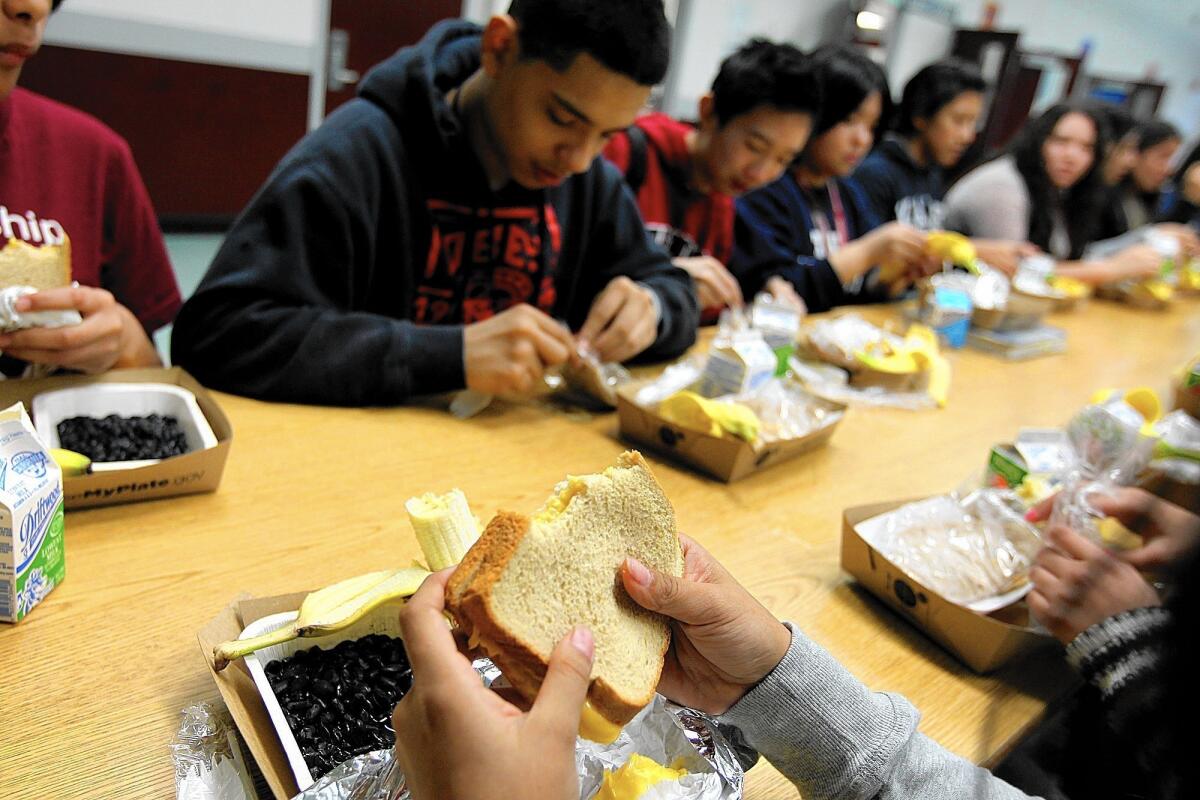
Students whose parents have not kept their school lunch bills current would no longer go through “shaming” that includes marking their hand so they cannot be served, under legislation approved Wednesday by the state Senate.
The measure by Sen. Bob Hertzberg (D-Van Nuys) would require school districts to ensure that any student whose parent has unpaid school meal fees is not treated differently, or delayed or denied a nutritiously adequate meal.
Hertzberg introduced the legislation after hearing of school districts taking lunch trays from students whose accounts were not current and throwing the food in the trash, embarrassing the students in front of their friends.
“No more shaming,” Herzberg told his colleagues. “Don’t visit the failures of the parents on their kids.”
The measure passed on a 39-0 vote and was sent to the Assembly for consideration.
- Share via
Emilio Huerta, undaunted by 2016 loss, is back to challenge Rep. David Valadao
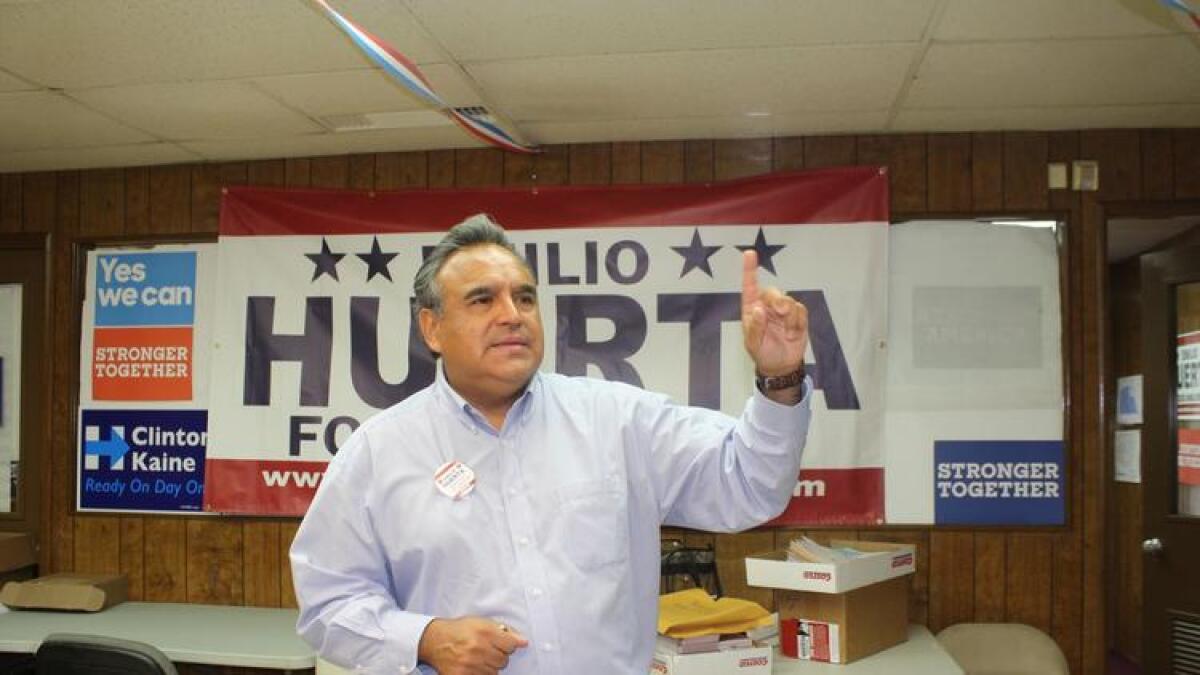
Bakersfield lawyer Emilio Huerta came more than 13 percentage points short of winning California’s 21st Congressional District seat in 2016, but he plans to try again in 2018.
Huerta, 59, blames his loss to Rep. David Valadao (R-Hanford) on inexperience and a rash of negative ads at the end of the campaign.
“We learned a lot in the last campaign. As a first-time candidate there was certainly a lot to learn and I think we did a good job,” Huerta said Wednesday.
The son of labor icon Dolores Huerta, he has worked for the United Farm Workers union — which his mother co-founded — throughout the Central Valley district.
Huerta said Valadao’s vote for the Republican healthcare plan shows he’s “ignoring Valley residents” needs because it would end the expansion of the MediCal program, which many of the district’s residents use for healthcare.
“It’s going to be a pretty significant issue,” he said.
He is the first Democrat to announce a bid for the seat.
Democrats are heartened by the fact that, while Valadao won the seat with 56.74% of the vote, the district has continued to trend Democratic in voter registration and chose Hillary Clinton for president with 54.72% of the vote.
“That tells me that there were die-hard Democrats, committed Democrats that vote, Democrats that were not convinced that my campaign should be supported and I think a lot of that has to do with me being a first-time candidate,” Huerta said.
The Democratic Congressional Campaign Committee has made the seat a target for 2018.
The majority-Latino district includes parts of Fresno, Kern, Kings and Tulare counties.
- Share via
Gov. Jerry Brown and Democrats say Trump is going ‘backwards’ if he pulls out of Paris climate pact
Gov. Jerry Brown warned Wednesday that a decision by President Trump to withdraw the United States from a 2015 global climate change agreement could be “tragic,” and vowed to keep California’s ambitious efforts in place and on track.
“Here we are, in 2017, going backwards,” Brown said in an interview with the Los Angeles Times. “It cannot stand, it’s not right and California will do everything it can to not only stay the course, but to build more support — in other states, in other provinces, in other countries.”
The governor also criticized efforts to the president to dismantle climate change initiatives launched by former President Barack Obama.
“Trump is going against science. He’s going against reality,” the governor said. “We can’t stand by and give aid and comfort to that.”
News that the president had either made the decision to pull the country out of the Paris Accord on climate change or was on the verge of doing so drew swift condemnation from California leaders. Brown and other top lawmakers attended the talks in late 2015 that resulted in the international agreement, and insisted on Wednesday that it would not hurt the state’s own efforts to sharply curtail greenhouse gas emissions.
“As with so many other matters, from human rights to healthcare, the Trump administration has continued to surrender our nation’s longstanding role as a global leader,” Senate President Pro Tem Kevin de León (D-Los Angeles) said.
Others pointed out that a decision to remove the United States from the agreement would leave it in rare company among other nations. Lt. Gov. Gavin Newsom tweeted that such a decision by Trump would be more than just “dumb + destructive.”
Brown, who leaves Friday for a weeklong visit to China to encourage more climate-change cooperation, predicted any decision to step away would suggest the country’s priorities aren’t clear.
“It sends a very muddled message,” the governor said during an interview in his state Capitol office. “Is the message [that] we like dirty cars and gas guzzlers? And we’re going to have a coal future? That can’t happen.”
And Brown again suggested that California’s experience on the issue offers a road map for others.
“If we want to retain and enhance manufacturing, we have to do what California is doing, in clean energy and clean technology,” he said. “That’s the future of jobs, the future of sustainability. And we better get on board. And California will be right there with the best of them.”
- Share via
Antonio Villaraigosa questions whether a state single-payer healthcare system is affordable in California
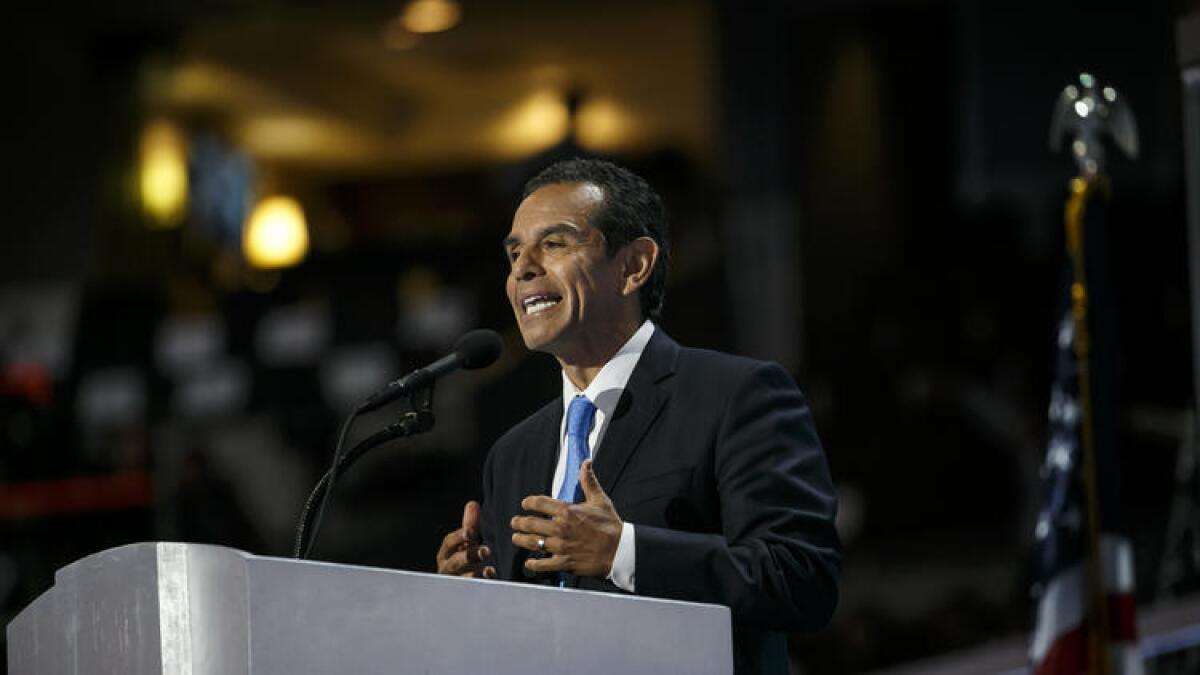
Democratic gubernatorial candidate Antonio Villaraigosa said he supports universal healthcare but advocates for a state-sponsored single-payer system may be “creating false expectations” given the enormous costs involved.
The former Los Angeles mayor, speaking on KPPC’s “AirTalk” with Larry Mantle on Wednesday morning, said California’s top priority should be to replace the estimated $20 billion in federal money the state may lose for healthcare programs if the Affordable Care Act is repealed.
The comment came after Mantle asked Villaraigosa if he supported a bill in the California Legislature that would create a single-payer health system for California. According to a legislative analysis, the cost of the proposed healthcare system would be $400 billion annually.
Villaraigosa said he supports the ideal of single-payer health care but was skeptical about California being able to afford a state-run program. Supporters first have to explain how the state can pay for it, he said.
To afford the program, California also would need waivers from the federal government so it can use Medicare and Medi-Cal funds, which is not likely given the state’s hostile relationship with the Trump administration, he said.
Villaraigosa also chided Lt. Gov. Gavin Newsom, a Democratic rival in the 2018 governor’s race, for voicing his support for a state single-payer system.
“Let’s not sell snake oil,” Villaraigosa said.
In March, Newsom said he plans to propose a universal healthcare system for the state modeled on a city program he supported while he was mayor of San Francisco.
- Share via
This Orange County congressman’s immigration town hall turned chaotic and led to three arrests
The majority of calls into Rep. Lou Correa’s Orange County congressional office are about immigration worries and what the Trump administration’s enforcement policies mean for Correa’s many Latino constituents.
“There’s a lot of fear in my district,” he said.
So the freshman Democrat has held seven town halls, all focused on immigration and explaining immigrants’ rights. They’ve been peaceful, with representatives from groups such as the Coalition for Humane Immigrant Rights of Los Angeles and the Mexican Consulate invited to help Correa answer questions.
But as the crowd of about 100 people gathered at Santa Ana’s Delhi Center on Tuesday evening, Correa knew this time would be different.
“We had some people there, probably a dozen of them, that immediately had signs that were not complimentary to yours truly,” he said.
Two women arguing about immigration issues had already gotten into an altercation outside the town hall. They were cited for assault and battery, and barred by police from going inside.
Correa told the crowd inside he would give a short presentation about immigration policy coming out of Washington and then have a question-and-answer session.
About a dozen people were having none of it. Some of the most tense moments came when Correa started talking about green card holders who served in the U.S. military and have since been deported.
“Ma’am, I’m trying to be courteous here,” he said as a woman kept speaking over him.
“As soon as I started speaking, it became very clear they were not going to let me speak,” Correa said Wednesday. “They just got louder and louder.”
Video of the town hall posted on social media shows people in the crowd yelling “Americans first” and “Illegals have no rights.”
Correa repeatedly asks them to let him speak. “Are you guys going to cooperate, or am I going to have to ask you to leave?” he said.
About 15 minutes in, as some in the crowd continued to shout and their attention turned to berating a group of counter-protesters, Correa declared the meeting over.
A handful of people circled around Correa as he tried to leave, yelling “Shame, shame” and “You guys all want welfare.” One woman’s voice can be heard repeatedly yelling “Coward!”
Police emptied the room amid chants of “USA.” The crowd streamed into the parking lot, where confrontations quickly started between supporters of President Trump and others who appeared to be focused on Native American rights.
Videos posted on social media show men shouting at one another, their faces so close their noses are practically touching. Police officers kept trying to separate the groups.
(Warning: The video below includes language that some readers might find offensive.)
Santa Ana Police Department spokesman Anthony Bertagna said a man struck a Trump supporter on the head with a pole bearing an anti-fascism flag. He was arrested on suspicion of assault with a deadly weapon, Bertagna said.
The man was brought to police headquarters, and a group of about 10 people followed along to protest, he said.
Shortly after, the town hall peacefully resumed in a different room with a much smaller crowd, Correa said.
Several California members of Congress have held similar immigration-specific town halls or workshops in the last few months as questions swirl about changes to federal immigration policies and enforcement.
The purpose of the town halls is to “let people know how to follow the law, let them know their legal rights and responsibilities,” Correa said. Protesters have characterized it as teaching people who are in the country illegally how to avoid deportation and get federal benefits.
- Share via
California plan for 100% renewable energy by 2045 clears key hurdle
California will receive all of its power from renewable energy, such as solar and wind power, by 2045 under legislation that passed the state Senate on Wednesday.
Senate President Pro Tem Kevin de León (D-Los Angeles) touted his bill, Senate Bill 100, as the most ambitious program in the world.
“Clean energy is the future,” De León said. “SB 100 ensures that California leads into the future.”
The measure would also speed up the state’s goal of reaching 50% renewable energy, changing the deadline from 2030 to 2026.
SB 100 passed over objections from Republican senators. Sen. Jeff Stone (R-Temecula) criticized the measure as government getting ahead of technological capacity.
“What if we can’t make that mandate that we’re putting into law today?” Stone said. “What it’s going to do is drive up electricity bills for our businesses.”
De León’s bill now moves to the Assembly.
- Share via
A new proposal on California’s cap-and-trade program emerges as vote is delayed
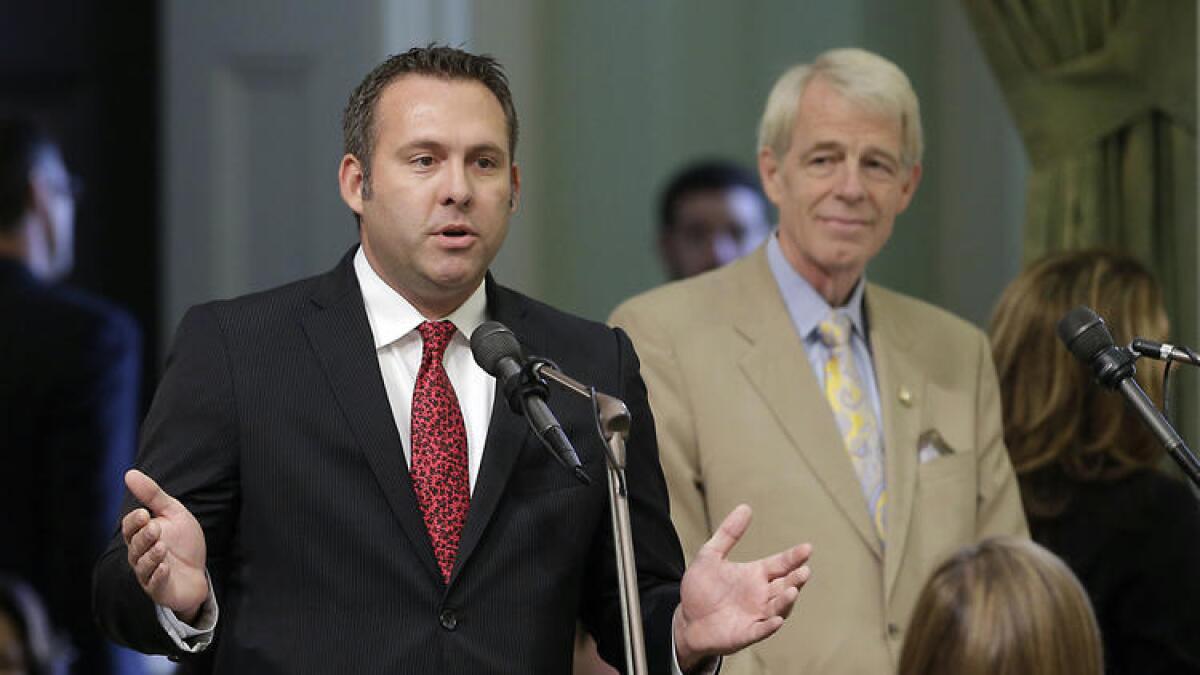
A coalition of business-friendly Democrats is detailing their own ideas for cap and trade, a centerpiece of California’s fight against global warming, the latest bid in a crowded field of efforts to extend the program.
Cap and trade requires polluting companies to buy permits to release greenhouse gas emissions, and lawmakers have been considering a push from Gov. Jerry Brown to extend the program beyond 2020.
The new plan would force the program to sunset in 2025, earlier than previous proposals from other lawmakers. It would also direct revenue from the program toward improving air quality and helping agricultural and trucking companies lower their emissions by replacing aging equipment.
The plan is also aimed at keeping costs down for industries regulated by cap and trade, allowing them to support green projects known as offsets instead of reducing their own emissions.
“California must continue to lead the world by implementing a strong climate policy that ensures both a healthy environment for future Californians and growth in all sectors of our economy,” Assemblyman Adam Gray (D-Merced) said in a statement.
The pro-business Democrats’ plan is the fourth such effort announced by various factions within the state’s ruling Democratic Party this year with two others emerging from the Assembly and one from the Senate. The plans offer varying degrees of changes to the existing program, either to prioritize pollution reductions in disadvantaged communities or eliminate offsets. Republican lawmakers also have said they want to be part of the cap-and-trade debate.
Brown has pushed for a two-thirds supermajority vote of the Legislature to extend the program by the state budget deadline next month. But Senate President Pro Tem Kevin de León (D-Los Angeles) said at a Wednesday news conference that that wasn’t going to happen.
“Cap-and-trade is a very complex issue,” De León said. “It’s very arcane. We want to make sure we get it right.”
De León said he hoped for a deal by the end of the year.
- Share via
Richard Riordan endorses Robert Lee Ahn against Jimmy Gomez in L.A. congressional race
- Share via
Estimated cost for single-payer healthcare in California reduced by billions in analysis sponsored by supporters
With a state Senate vote possibly imminent on a single-payer health system for California, supporters Wednesday released a study estimating it would cut spending on healthcare in the state by 18% and cost tens of billions of dollars less than the state’s estimate for the plan.
Extra costs could be covered by tax increases, according to the analysis sponsored by the California Nurses Assn./National Nurses United, the leading supporter of legislation.
A legislative analysis had estimated the cost of the proposed system to be $400 billion annually, but a study released by the nurses Wednesday estimates the yearly cost would be $331 billion as of 2017.
The estimate was made by the Political Economy Research Institute at the University of Massachusetts Amherst, in a study partly financed by the nurses association.
State Sen. Ricardo Lara (D-Bell Gardens) authored a bill that would provide a Medicare-for-all-type system and said the study shows the plan can guarantee health coverage for all Californians without the out of pocket costs that leave a third of all state residents underinsured.
“The good news is that California can get a lot more for our money,” Lara said at a Capitol news conference. “Families will pay less for healthcare.”
The study estimated the amount spent on healthcare will drop up to 9% for middle-class voters who are currently insured, and 5% for low-income residents.
Senate Bill 562 is eligible for a vote by the state Senate this week, although Lara said he planned to meet with supporters on how to incorporate the findings of the new financial report into the proposal. The financial review proposes to cover part of the cost of the single-payer system with a 2.3% increase in both the state sales tax and its gross receipt tax applied to California businesses.
The new plan could use public healthcare revenue sources that are currently covering some 71% of all healthcare funding in the state, including Medicare, MediCal and tax subsidies for healthcare, said Robert Pollin, the institute’s director.
Polon was an economic advisor to Gov. Jerry Brown’s campaign for president and Lara said he hoped his involvement would convince Brown to support the legislation.
If the state can obtain waivers in all of the present areas of public health funding, it will provide $225 billion of the cost of a single-payer program.
“That means that the remaining $106 billion to fund Healthy California will need to be provided by new revenue sources in the state,” the study says.
The rosy picture was disputed by Rick Coburn, president of the California Association of Health Underwriters, who said abolishing the use of options delivered by private insurance companies would increase unemployment.
“Senate Bill 562 proponents assume federal funding will cover 70 percent of the annual $400 billion cost estimate,” Coburn said. “California has no authority over federal programs and cannot assume the federal government will grant the necessary waivers.”
The proposal is also opposed by Charles Bacchi, president and CEO of the California Association of Health Plans.
“This new analysis doesn’t change the fact that a single payer health care system is unaffordable and would be incredibly disruptive to the ninety percent of California’s residents who currently have health insurance,” Bacchi said in a statement.
To ease the tax burden, the proposal would exempt the first $2 million in receipts for all businesses, meaning companies that average up to nine employees will have no gross receipts tax obligation. The sales tax would exempt spending on housing, utilities and food at home.
“What this new study proves is that we can finally achieve the dream of guaranteeing healthcare for all Californians, without the punishment of crippling out-of-pocket costs,” said RoseAnn DeMoro, executive director of the California Nurses Assn.
Meanwhile, the nurses association released a poll it sponsored that says 70% of Californians support the legislation and 58% remain supportive after hearing opposition arguments. The poll was conducted by the Tulchin Research firm, and involved the survey of 600 likely California voters.
Updated at 5:30 p.m. This post was updated with a statement by Charles Bacchi, president and CEO of the California Association of Health Plans.
This post was originally published at 11:35 a.m.
- Share via
Senate fails to back bill to delay the Aliso Canyon reopening, but lawmaker will try again
- Share via
California state Senate advances bill to ban smoking and use of e-cigarettes in government housing
Californians would no longer be able to use tobacco products, including electronic cigarettes, in public housing and within 25 of those buildings under a measure approved Tuesday by the state Assembly.
Assemblyman Jim Wood (D-Healdsburg) said the measure builds on a smoking ban approved last year for federal public housing projects by the U.S. Department of Housing and Urban Development.
In addition to applying the smoking ban to state housing, expansion to include e-cigarettes makes sure the law cover new technology in tobacco use. The bill takes effect by July 30, 2018. Wood said tobacco-related diseases cost taxpayers significant funds each year.
“This bill will save money but will more importantly save lives,” Wood told his colleagues before the vote.
The measure is opposed by the Western Center on Law and Poverty, which worries it will lead to more evictions.
- Share via
Californians would not be able to buy more than one rifle a month under bill approved by state senators
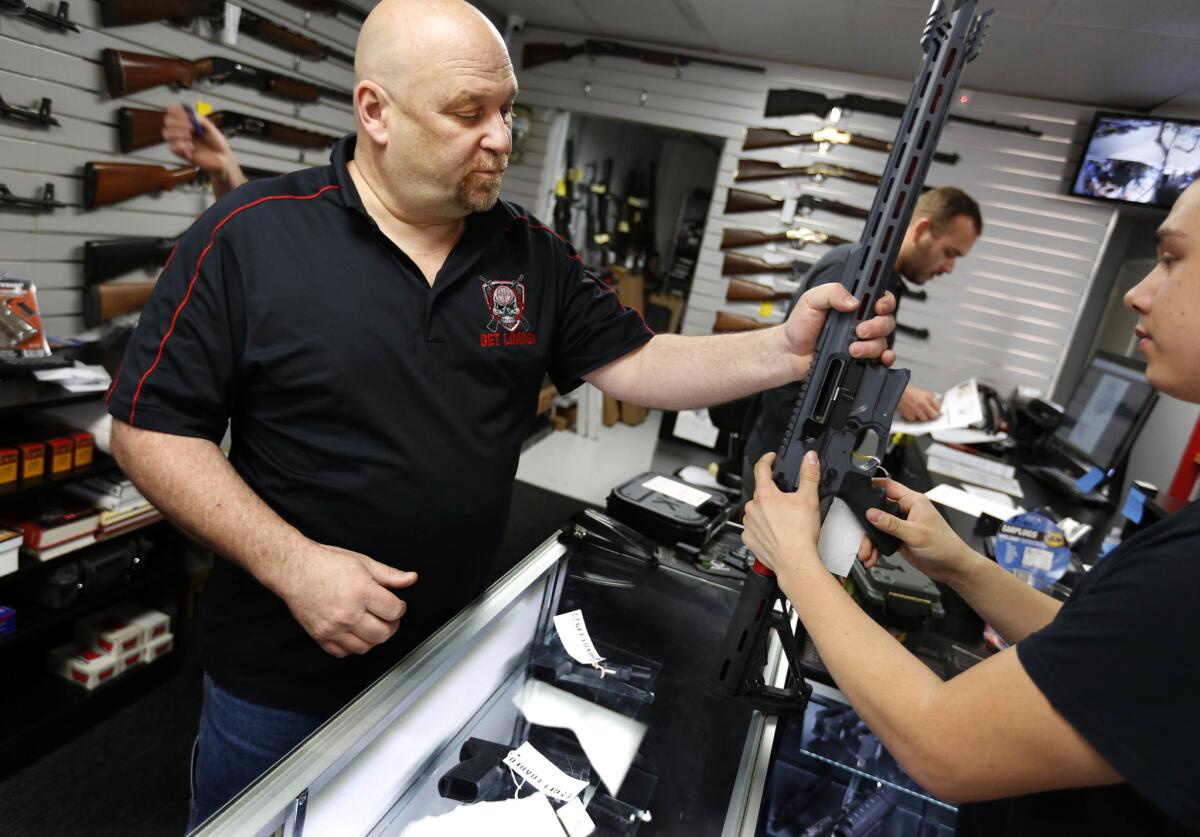
Californians would be prohibited from buying more than one firearm in any 30-day period under a measure approved Tuesday by the Senate to reduce straw purchasing and circumvention of gun laws.
California already bars people from buying more than one handgun a month. The bill by Sen. Anthony Portantino (D-La Cañada Flintridge) expands the limit to also cover long guns, including rifles and shotguns.
The measure, which next goes to the Assembly for consideration, seeks to address concerns that some people buy large quantities of guns and then sell them on the underground market to criminals and others not eligible to own guns.
“There is no need or reason why a person would need to purchase more than one gun a month,” Portantino said during the floor debate.
Republicans, including Jeff Stone of Murrieta, opposed the legislation.
“This is yet another example of the government trying to infringe on the 2nd Amendment rights of law-abiding citizens,” Stone said.
Sen. Jim Nielsen (R-Chico) said he has seen no proof that past gun-control measures approved by the state have made the state safer.
‘It’s more of the same that will not decrease violent crime,” Nielsen said.
- Share via
California state senators want to stop the public from smoking at California beaches and parks
Californians would be barred from smoking or using electronic cigarettes in state parks and at beaches under a bill approved Tuesday by the state Senate.
Sen. Steve Glazer (D-Concord) said his bill would address the health problems caused by smoking but also the harm done to the environment by discarded cigarette butts and the fire danger posed by the practice.
“Cigarette butts contain more than 150 toxic chemicals and although small in size, have a huge negative impact on the environment and the animals that live in them,” Glazer told his colleagues.
A legislative analysis said the bill does not address the concerns raised by Gov. Jerry Brown when he vetoed a similar bill last year.
The veto message read, in part, “The complete prohibition in all parks and beaches is too broad. A more measured — and less punitive — approach might be warranted.”
- Share via
School day wouldn’t begin before 8:30 a.m. in California under bill that clears the state Senate
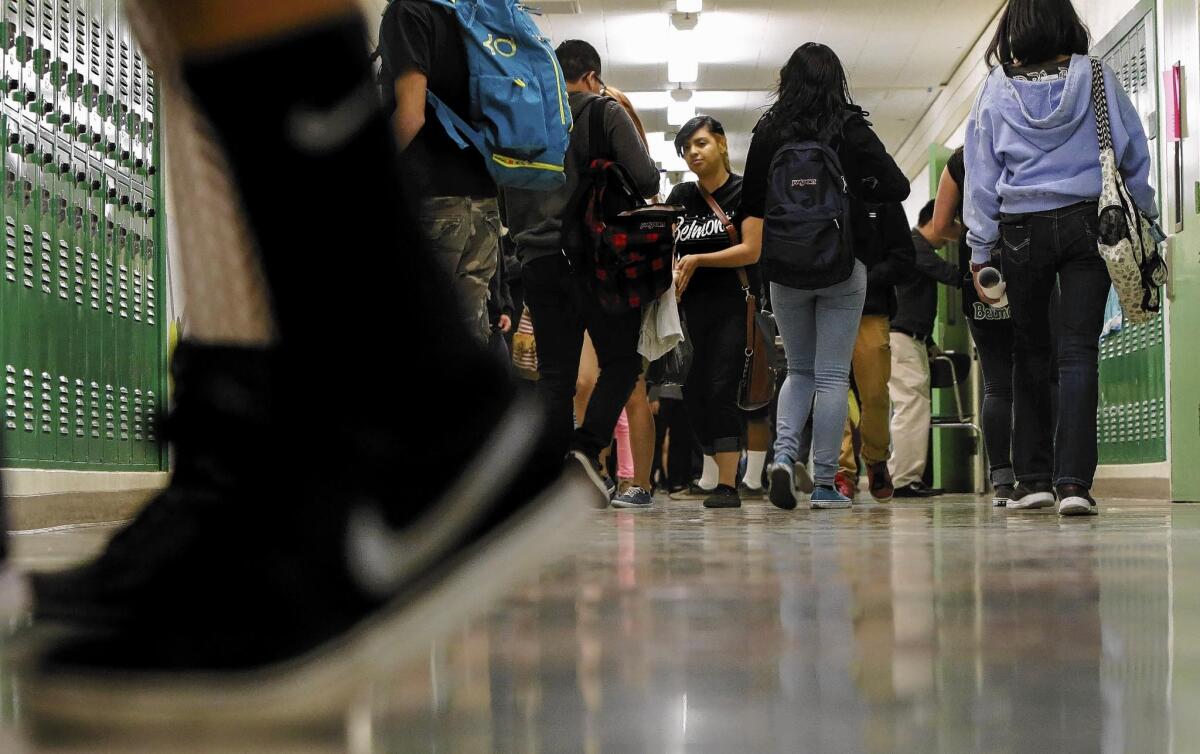
California teenagers wouldn’t be required to start their school day before 8:30 am under a bill approved Tuesday by the state Senate.
The legislation by Sen. Anthony Portantino (D-La Cañada Flintridge) would not fully take effect until 2020, and sparked a lively floor debate over the science on the sleep patterns of middle and high school students, and whether they simply need to go to bed earlier.
“I expect this would only dispose them to stay up later,” said state Sen. Jim Nielsen (R-Gerber). Another Republican lawmaker, Sen. Jean Fuller (R-Bakersfield), said students need to learn what it’s like in the workforce.
“Job preparation is what schooling is all about,” Fuller said. “Unless you’re a musician or someone who works nights, you probably did not start in the later morning.”
Opponents also said the later start time could affect collective bargaining agreements with teachers and other school employees.
Supporters, however, pointed to a recommendation for later start times from the American Academy of Pediatrics. A University of Minnesota study linked school start times to sleep deprivation and the rate of car crashes among teenage drivers.
“The morning sleep time is the most valuable for student health,” said Portantino. “Their test scores go up, their attendance goes up, their graduation rates go up.”
The bill would allow rural school districts to obtain a waiver if they couldn’t make the change.
Senate President Pro Tem Kevin de León (D-Los Angeles) ended the debate with a simple request of the senators on behalf of teenage students.
”Let’s just let them sleep in a little bit,” he said with a smile.
- Share via
More transparency proposed for prescription drug price increases under bill passed by California Senate

Alarmed by skyrocketing prices for some prescription drugs, the California Senate on Tuesday approved a measure aimed at increasing pressure to hold down costs to consumers by requiring more public reporting of price hikes.
The lawmakers approved a bill that would require drug manufacturers to notify health plans and state purchasers such as the prison department of increases in the wholesale cost of drugs in writing at least 90 days before the new costs were to take effect.
The measure also requires that health plans and insurers notify state regulators of pricing information for the most costly drugs.
“We’re not saying that they can’t raise the price. We’re just saying notify us,” Hernandez said during the floor debate. “And if [the price] goes up a significant amount, we should be able to question why.”
The measure passed by a 26-10 vote with some Republicans, including Sen. Ted Gaines of El Dorado Hills, opposed.
Gaines said the pharmaceutical industry’s pricing of drugs helps it pay for development of new medications. “It funds their research,” Gaines said during the debate.
The measure next goes to the Assembly, where a similar bill last year failed to win passage.
Hernandez said more opponents are talking to him this year about possible compromises, although the bill is opposed by the Pharmaceutical Research and Manufacturers of America.
Hernandez said the bill is needed, adding that current regulations allow pharmaceutical companies to reap “obscene profits at the expense of the entire healthcare system.”
- Share via
California Senate advances bill to make pot use in cars an infraction
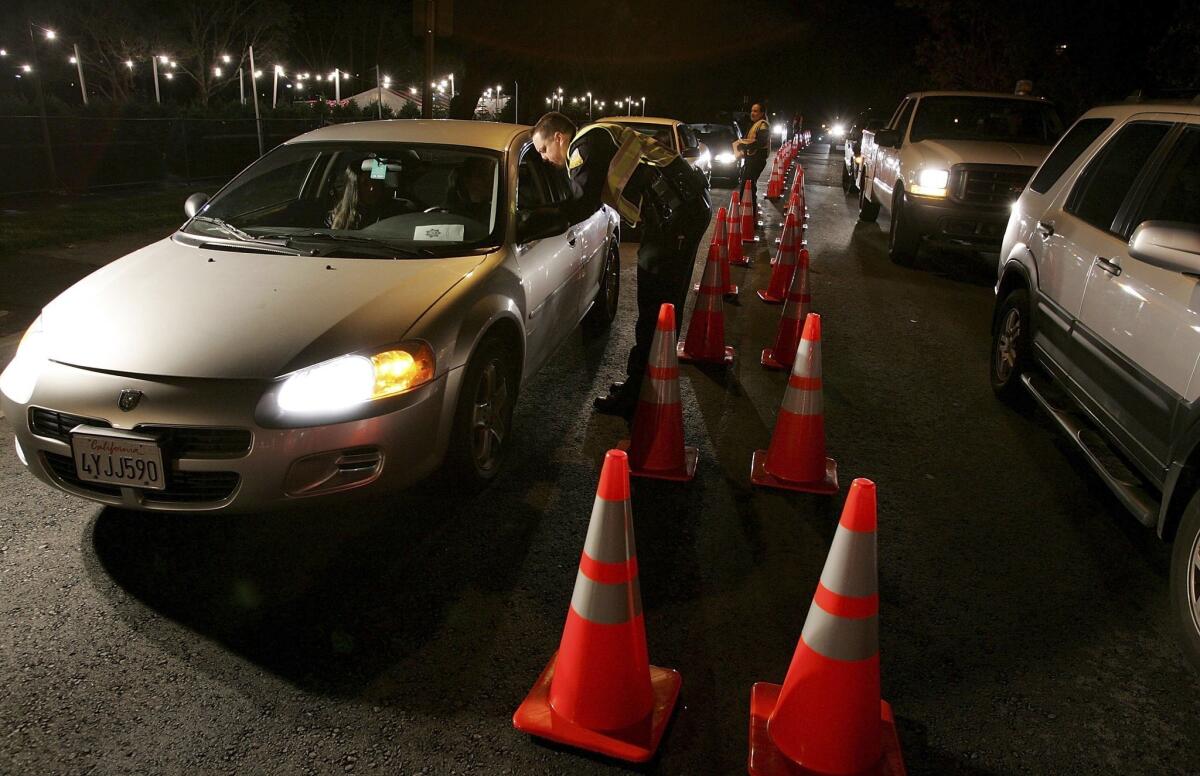
Just months after state voters legalized the recreational use of marijuana, the state Senate on Tuesday voted to prohibit its use in automobiles because of concerns over drugged driving.
A bill by Sen. Jerry Hill (D-San Mateo) makes it an infraction for drivers and passengers to use marijuana in motor vehicles. Stiffer penalties already exist for motorists found to be driving while impaired by drugs.
California voters legalized recreational use of marijuana in November although the state does not plan to begin issuing licenses for its legal sale until January.
In Washington state, which previously legalized pot, the AAA Foundation for Traffic Safety found that the number of drivers who had recently used marijuana before fatal accidents doubled from 2013 to 2014, Hill told his colleagues.
“Washington serves as an eye-opening case study for what other states may experience with road safety after legalizing the drug,” Hill told his colleagues before the unanimous vote to approve the measure and send it to the Assembly for consideration.
- Share via
California lawmakers want to give parents at smaller companies 12 weeks of protected family leave
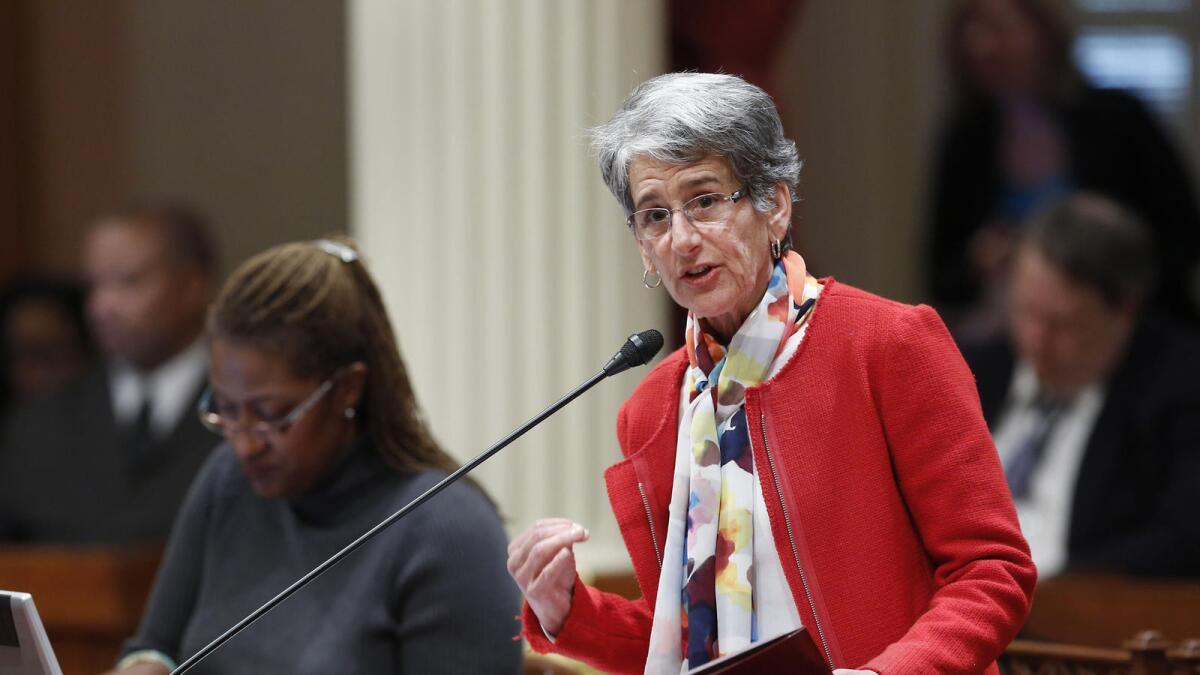
California lawmakers are once again seeking to expand the state’s paid family leave program to smaller businesses after Gov. Jerry Brown vetoed a similar measure last year.
SB 63, authored by Sen. Hannah-Beth Jackson (D-Santa Barbara), on Tuesday moved out of the state Senate with a 25-13 vote. It now heads to the Assembly for consideration.
The legislation, a priority bill for the California Legislative Women’s Caucus, would allow parents at companies with 20 to 49 employees to take 12 weeks of leave to care for a newborn or newly adopted child — without fear of losing their jobs. Under the current state law, only workers at businesses with 50 or more workers can take advantage of program.
On the Senate floor Tuesday, the debate on the issue echoed that of last year. Republican lawmakers argued the bill would kill jobs and hurt small businesses already struggling in California. Those in favor argued progressive family leave policies attracted a strong and healthy workforce.
Jackson said her bill would impact only 6.3% of California companies, while helping 16% of its workforce, a population of 2.7 million residents across the state.
“With so many women in the workforce than ever before, and with so many struggling, two-income families, this is a critical moment in time,” she said.
- Share via
Kimberly Ellis files formal challenge over result of state Democratic Party chairperson election
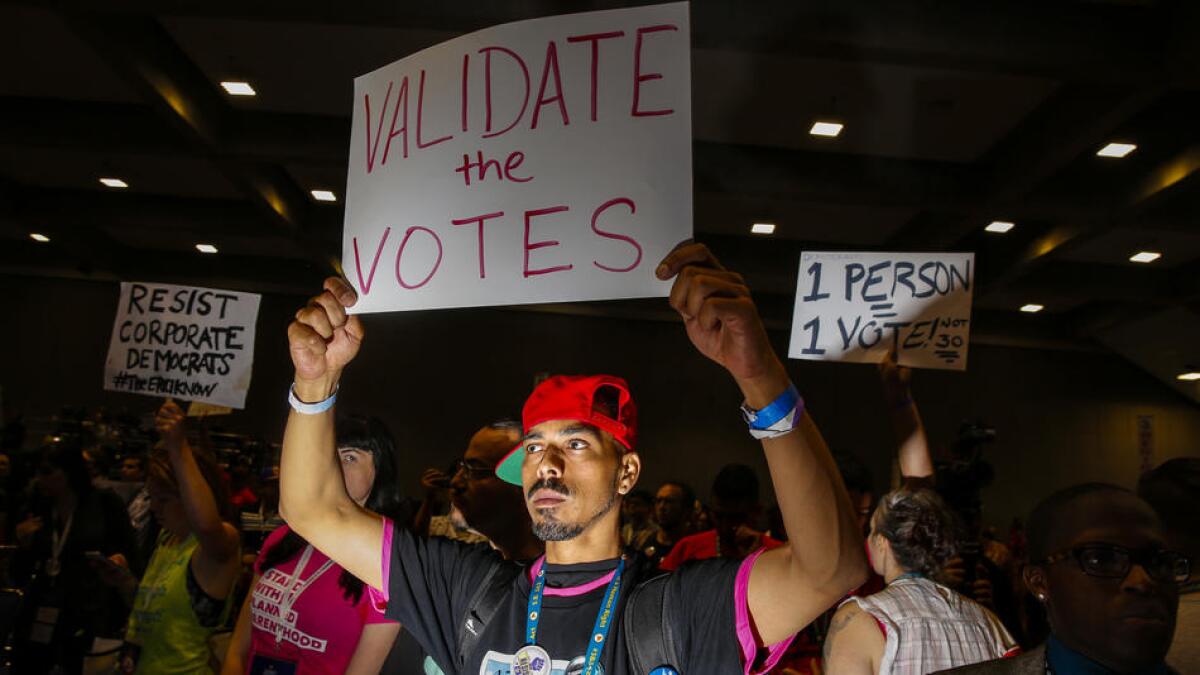
The candidate who narrowly lost the race to be the next leader of the California Democratic Party on Tuesday filed a formal challenge of the election result.
Kimberly Ellis’ campaign, which was already in the process of reviewing the ballots cast during the state party’s convention two weekends ago, said they were filing the challenge to meet a requirement in the party bylaws that such an action must be taken within seven days of the contested act.
“Our review process is ongoing. It’s critical that all formal processes outlined by the CDP’s bylaws are followed at this time so that there can be no concern about raising issues in the manner prescribed by our party,” said Hilary Crosby, immediate past controller for the state party and an Ellis supporter.
Ellis’ campaign said challenges were also being filed in races for a vice chair, secretary and multiple regional directors.
Chris Masami Myers, state party executive director, acknowledged receiving the challenges and said in a statement that they would be reviewed “in accordance with the standard practices described in the bylaws.”
The party’s compliance review commission, made up of six members who were appointed during former Chairman John Burton’s tenure, will review the evidence and take oral or written testimony before issuing a ruling in mid- to late June.
The state party chair race was the most heated and contentious. Longtime party leader Eric Bauman entered the race with advantages, but Ellis made the contest competitive.
In the election, held this month at the state party convention in Sacramento, Bauman beat Ellis by just over 60 votes. But amid allegations levied by her supporters of ballot-box stuffing and ripped-up ballots, she refused to concede the race. Her campaign has been reviewing individual ballots for a week.
Bauman did not immediately respond to requests for comment.
Updated at 4:57 p.m.: This post was updated to add additional information about how the review will be conducted.
Updated at 3:35 p.m.: This post was updated to add a comment from a state party official.
This post was originally published at 2:37 p.m.
- Share via
Darrell Issa gets on his office roof to take a picture of protesters. A mild hubbub ensues
It began when one of Rep. Darrell Issa’s 2018 opponents, Mike Levin, posted an image on Twitter, saying the Vista congressman was hiding on his office roof from hundreds of protesters on the street below.
The photo of Issa standing on the roof ricocheted around Twitter, with many comparing it to a scene from the popular television show “The Office,” and left-leaning media outlets quickly publishing headlines like “Darrell Issa Appears to Flee to Building Roof to Avoid Protesters.”
Like most things, what happened at Issa’s office appears to have been a bit more nuanced.
Issa soon tweeted that he had “spent the morning talking with constituents gathered outside the office today, then popped upstairs to take a quick pic!.” Multiple images, including one from Levin’s account and from Issa’s account, show the congressman on the street with protesters.
The protests occur weekly outside Issa’s Vista district office, and the congressman has come out to speak with the group at least twice since President Trump’s inauguration. Issa narrowly won reelection in 2016 over a novice opponent, and Democrats are targeting his seat in 2018.
Issa’s staff said he tried to speak with all the protesters using their sound system, but was rebuffed. Rally organizer Ellen Montanari said she decided not to hand over the protesters’ microphone so Issa could take questions from the crowd because he refused to shake her hand before the protest began.
“He refused to do that, and he said, ‘Step away, you are a protester.’ And I said ‘I am a constituent,’ ” Montanari said. She said he also made “disparaging remarks” about the protesters and the signs they carry.
Issa’s spokesman, Calvin Moore, said Montanari “can’t simultaneously organize people to stand outside our office with ‘Where is Darrell?’ signs and feign outrage how he won’t answer her questions — and then deny him the ability to answer his constituents’ questions,” he said.
- Share via
State Senate Democrats pass bills designed to protect against Trump’s possible changes
- Share via
Rep. Adam Schiff says alleged Russian meddling in election was an effort to destroy American democracy
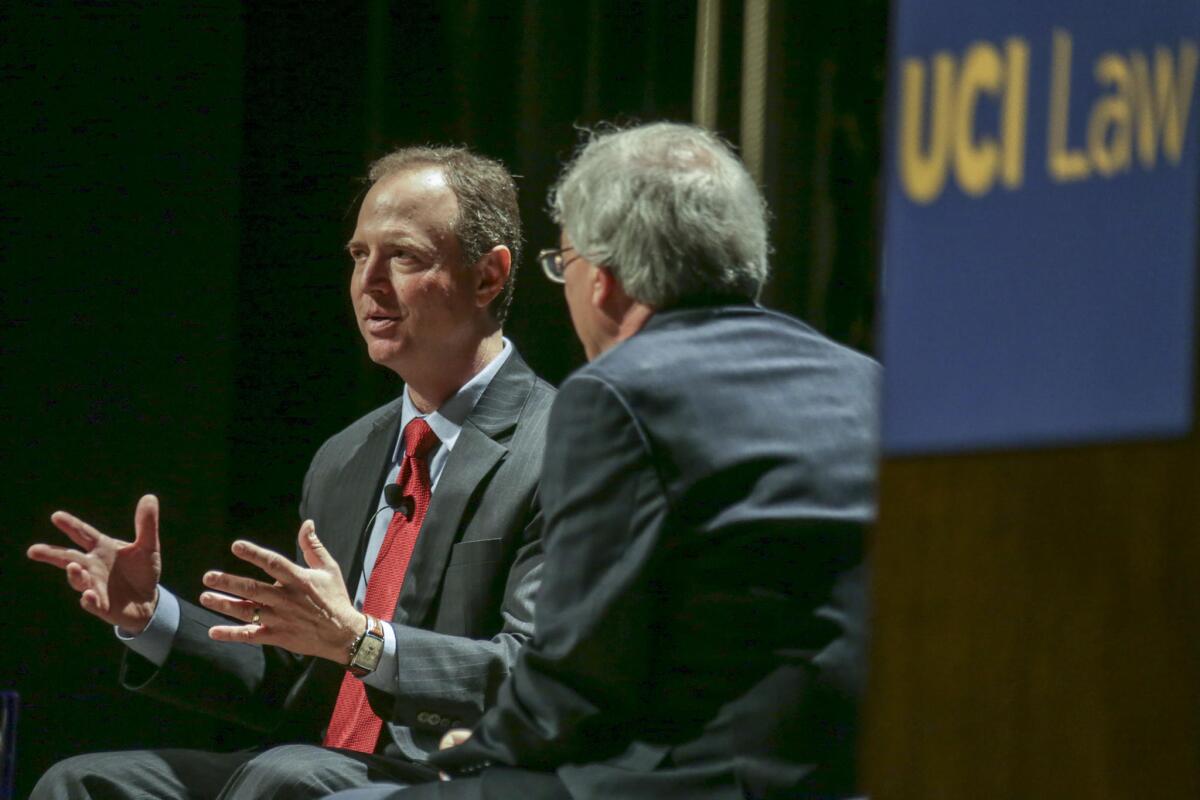
Rep. Adam Schiff (D-Burbank) said Tuesday that the alleged Russian meddling in last year’s presidential election was about far more than favoring one candidate over another. He said it was an effort to undermine the foundation of American democracy in order to prop up an authoritarian regime in Moscow.
“Now if you look at this as just a one-off intervention, you might be inclined to dismiss the greater significance of it, or if you listen to the president, you might be inclined to dismiss this as simply efforts to relitigate a lost election,” Schiff told several hundred people at UC Irvine. “But the significance is really far greater. Quite separate and apart from the desire of the Russians to help Donald Trump and hurt Hillary Clinton was a more fundamental objective, and that was really to tear down at our democracy.”
Schiff is the ranking Democrat on the House Intelligence Committee, which is investigating allegations of Russian intervention in the presidential election, including the leaking of hacked Democratic emails and contacts between Trump associates and Russians.
Trump has declared the investigation the “single greatest witch hunt of a politician in American history” on Twitter. Rep. Devin Nunes (R-Tulare), the former chairman of the committee, recently told hundreds of Republicans at a fundraiser that the investigation is about nothing more than Democrats trying to justify Clinton’s loss. Nunes stepped down from his position after allegations arose that he mishandled classified information.
Schiff said Russian President Vladimir Putin would have reasons for wanting to see Clinton fail and Trump succeed – he believed that the CIA and Clinton were secretly behind mass demonstrations in Russia in 2011, and because Trump’s positions on issues such as the North Atlantic Treaty Organization were more favorable to Russia than Clinton’s.
But Schiff argued the larger point was sowing discord in the U.S., so Putin could argue that American democracy is no better than his government. Talk of rigged elections and surveillance, questioning the independence of the judiciary and freedom of the press — as Trump has done — boost Putin’s message, Schiff said. And the efforts are not limited to the United States, he added, pointing to allegations that the Russians made an effort to interfere in France’s recent election.
“The reality is there is new ideological struggle. It’s not communism versus capitalism anymore. It is authoritarian versus democracy,” he said. “This is the broader challenge we are facing.”
Schiff also warned that there is no way to prevent Russian cyber-spying and that future attempts to interfere with American elections will only be more sophisticated, so voters must be educated.
“One of the most important conclusions the intelligence agencies have reached is the Russians will do this again,” he said. “The only real defense is to inoculate ourselves, to educate ourselves about what the Russians have done, why they are doing [it and] what they may do in the future and somehow we have to develop a consensus regardless of which party it helps and which party it hurts — that we will reject it.”
- Share via
Rep. Devin Nunes: Democrats are using Russia investigation to justify Clinton’s loss
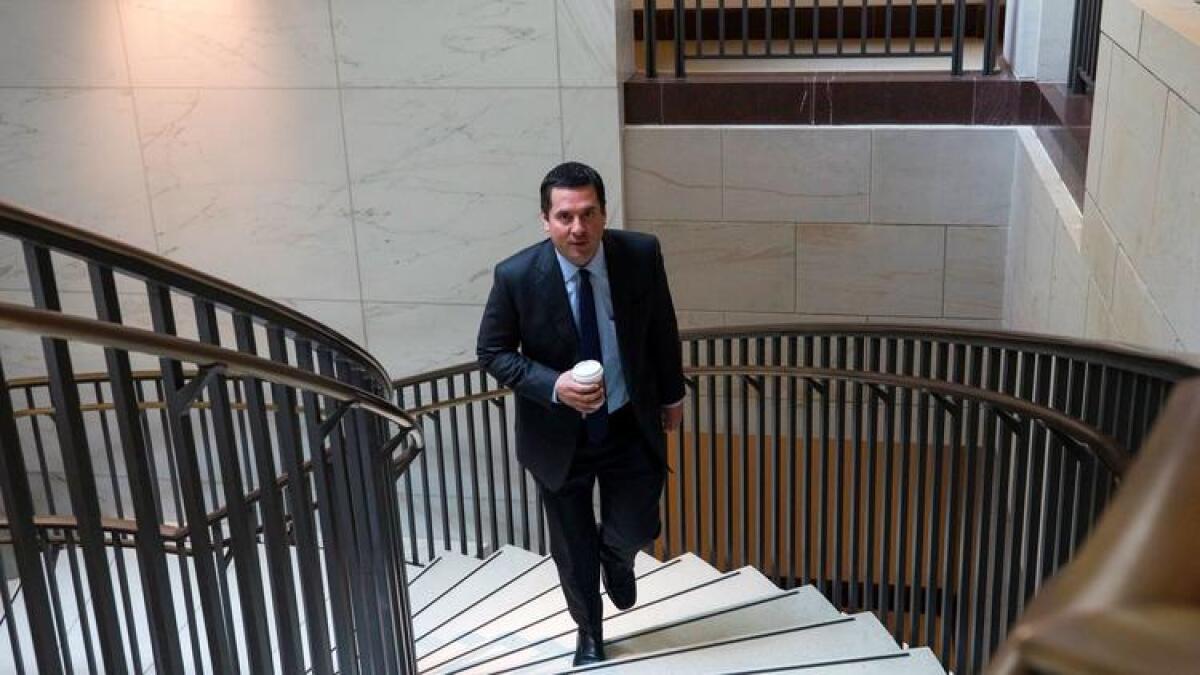
House Select Intelligence Committee Chairman Devin Nunes told hundreds of local Republicans at a recent private fundraiser that congressional investigations into Russia’s interference in the 2016 election are about Democrats trying to justify Hillary Clinton’s loss.
“The Democrats don’t want an investigation on Russia. They want an independent commission. Why do they want an independent commission? Because they want to continue the narrative that Vladimir Putin and Donald Trump are best friends, and that’s the reason that he won, because Hillary Clinton would have never lost on her own; it had to be someone else’s fault,” Nunes told Republicans the day after he stepped away from leading the House investigation.
His remarks were recorded on video and provided to The Times.
- Share via
California’s embattled tax board would lose power over staff and funding under lawmaker’s plan
Following months of accusations about mistakes and improper use of power by its elected members, the state Board of Equalization could lose substantial power and gain an independent overseer under legislation introduced in the state Assembly.
The bill by Assemblyman Sebastian Ridley-Thomas (D-Los Angeles) would shift much of the power over staff and spending authority away from the independent tax board and create a new inspector general to watch over its actions.
“What we’re trying to do is make sure that the reform is transparent,” Ridley-Thomas said. “That’s what I think the moment demands.”
The plan, introduced as an amended bill just before the Memorial Day holiday, comes in the wake of audits alleging the tax agency made multimillion dollar miscalculations on revenue allocations and that some of its elected members improperly used staff members who were supposed to be focused on tax collection. Earlier this month, Gov. Jerry Brown called the situation a “mess” and in April asked for an investigation by the state Department of Justice.
Four members of the Board of Equalization are directly elected by voters. The fifth, state Controller Betty Yee, serves in an ex officio capacity.
The Assembly bill would transfer significant staff decisions to the agency’s executive director and would require the Board of Equalization’s members to have their operations funded in detailed line items included in the state budget. It would also create an inspector general office and would require the board’s members to disclose all ex parte communications with those seeking action by the agency.
“I think that these issues can be addressed if we keep them in the sunlight,” said Ridley-Thomas.
- Share via
New advertising campaign targets lawmakers over votes for climate change policies
A coalition of California businesses launched a new advertising campaign on Saturday to pressure lawmakers against enacting tighter policies on climate change and air pollution.
The campaign includes online videos and television advertising that warn of higher costs for business and residents. It arrives as Gov. Jerry Brown and lawmakers are debating whether to extend the cap-and-trade program, which requires companies to buy permits to release greenhouse gases, and how restrictive the system should be.
The first lawmaker being targeted is Assemblyman Ken Cooley (D-Rancho Cordova), accusing him of allowing “unelected state employees” to raise “hidden taxes” on gasoline and electricity because he voted last year for a tougher target to reduce emissions by 2030. Other lawmakers could face similar advertisements.
“We’re locked, loaded and ready to go statewide,” said Rob Lapsley, president of the California Business Roundtable, which is funding the campaign through an advocacy group called Californians for Affordable and Reliable Energy.
The roundtable represents the state’s largest corporations, including oil refineries and manufacturers who have been critical of climate policies.
A dollar figure was not disclosed for the advertising campaign, which will represent a balancing act for the roundtable. It supports the cap-and-trade program as an alternative to more restrictive regulations, but it opposes some of the current proposals to extend it.
One measure would tie the program to air quality, targeting a wider range of pollutants than just greenhouse gases, and another would make it function more like a tax and charge higher prices for emission permits.
“We’re at a tipping point here,” Lapsley said. “We need to get this information out into the public in order to try and create balanced policies.”
Although polls show broad support for fighting global warming in California, concerns about higher costs for constituents could be influential with some lawmakers who recently passed legislation to raise gas taxes to fund road repairs. Sen. Josh Newman (D-Fullerton) is facing a recall campaign over his vote.
Nonpartisan legislative analysts have said cap and trade could boost the price of gasoline by 24 cents to 73 cents by 2030. Environmentalists have said it’s inaccurate to tie any single policy to fluctuations in gas prices.
- Share via
California Politics Podcast: The debate among Democrats didn’t end at their convention
The official gathering of California Democrats lasted only three days, but the lingering debate and simmering tensions could keep going well into next year’s elections.
On this week’s California Politics Podcast episode, we look back at the line in the sand drawn at last week’s California Democratic Party convention by some of the party’s most passionate progressive activists -- including the blunt speech delivered by an influential labor union leader last weekend.
We also discuss big new developments this week on the topic that energized those Democratic activists: a single-payer healthcare system for California. On Monday, a fiscal analysis put a large price tag on legislation to enact that sweeping healthcare change.
I’m joined this week by Times staff writer Melanie Mason.
- Share via
California lawmakers quietly refuse to stop unlimited cash flowing from political parties to their campaigns
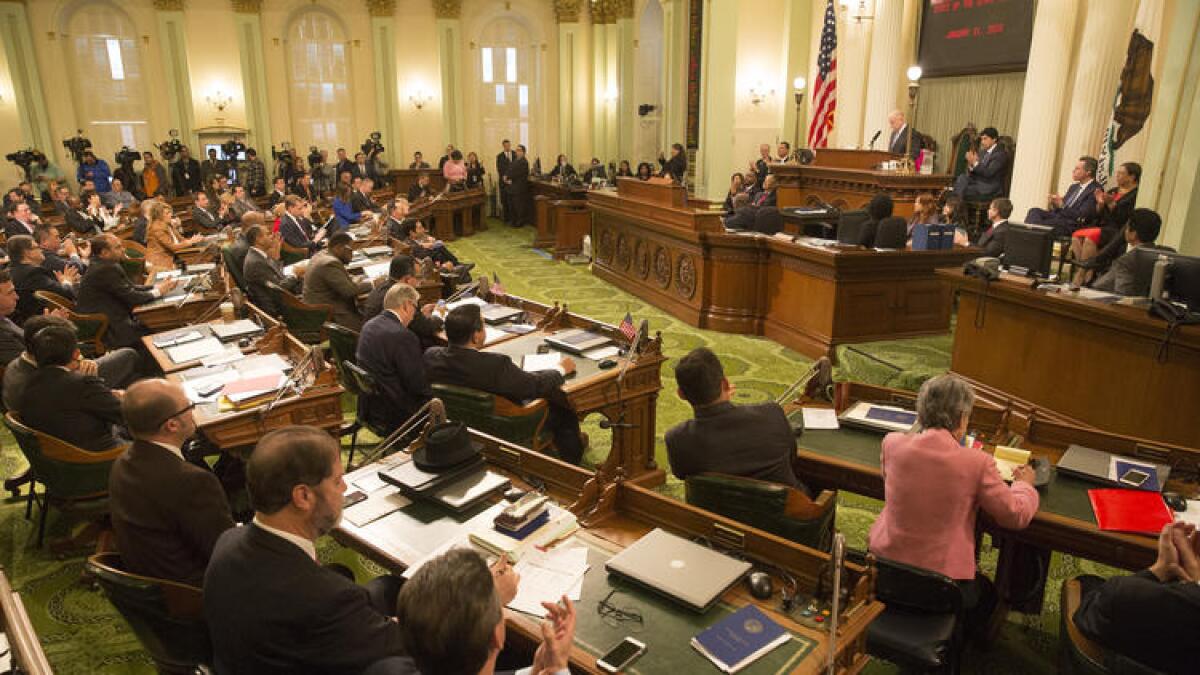
An ambitious effort to close a widely used loophole that allows large donations from political parties to be funneled into California races was rejected on Friday.
The bill by Assemblyman Marc Levine (D-San Rafael) would have made political party money donated to statewide and legislative candidates subject to the same contribution limits as individuals. Under the language of a voter-approved initiative, Proposition 34, money from political parties is exempt from those existing limits.
“It’s a money-laundering scheme that has completely duped voters,” Levine said last fall when he first promised to introduce the bill.
The proposal was quietly killed, without a formal vote, by the Assembly Appropriations Committee during its biannual session to act on bills placed on the so-called suspense file due to their estimated costs. Committee staff estimated that Levine’s AB 1234 would have six-figure costs both for enforcement and for placing the issue before voters in 2018.
- Share via
Veteran Democratic operative criticizes Kimberly Ellis for refusing to concede party chair race
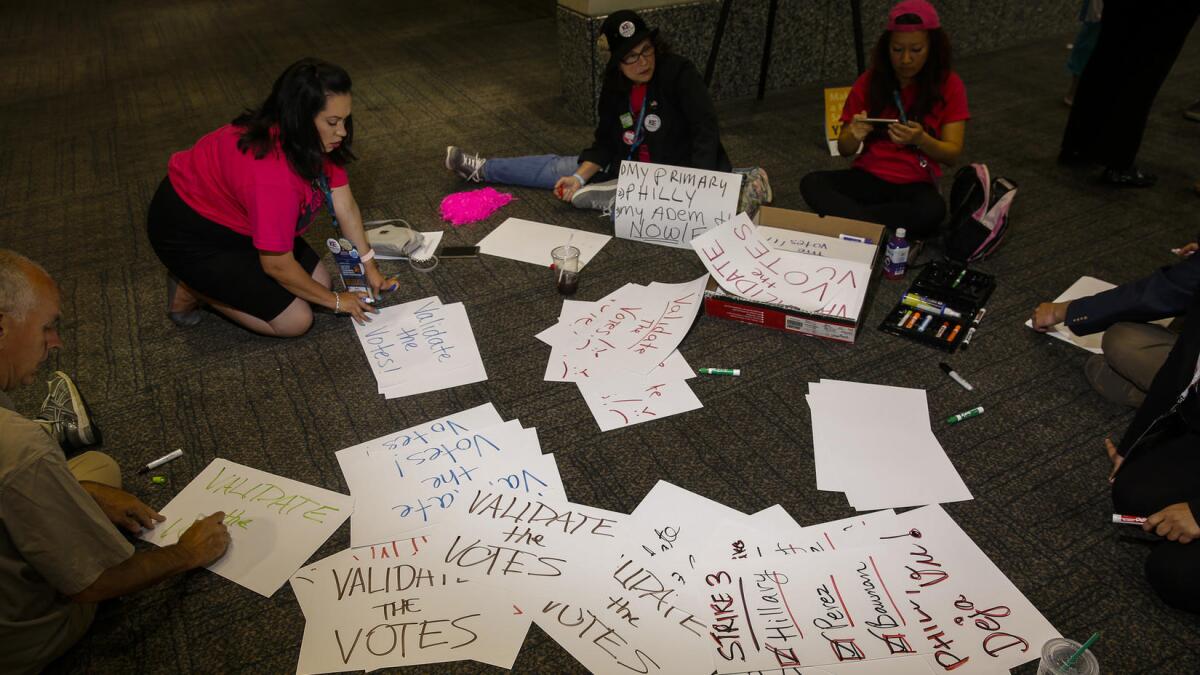
Veteran Democratic operative Bob Mulholland slammed infighting among California Democrats, and urged Kimberly Ellis, who came up short in a nasty party chair election, to work to unify the party.
“I … and others did not understand some of your supporters’ … attacks on those of us who have spent decades or years building the Democrats in California as the most successful political Party in the country,” he wrote in an open letter to Ellis on Thursday.
He sent the email in the aftermath of the party’s rancorous convention last weekend that featured a bitter leadership battle between Ellis, a favorite of newer members including the backers of Bernie Sanders’ failed presidential bid, and longtime party leader Eric Bauman.
After Bauman was declared the winner by a razor-thin margin of just over 60 votes, Ellis refused to concede and demanded an audit of the vote as some of her backers floated rumors of ballot-box stuffing and discarded ballots.
Ellis demurred when asked about Mulholland’s scathing letter.
“While our review continues, we are refraining from making any statement that might cause further division,” Ellis said. “If we hope to truly unify this party, it will require patience by all.”
Officials with the Ellis campaign have been reviewing ballots this week. A spokesman said they had looked at about two-thirds by the end of Friday and hope to be done by the middle of next week.
Joe Macaluso, Ellis’ strategist, declined to discuss the results and said her team needed to review additional documentation beyond the ballots.
“We’re trying to stay true to our process and not release anything, but we’re in it,” he said. “It’s an extensive process.”
Mulholland argued in his public letter that the convention should have showcased the party’s message, not intraparty spats.
“Our annual Conventions should take care of internal business (Platforms, election of Officers, Resolutions, etc.), but more importantly a communication to voters, especially moderate Democrats and Independents about their concerns and issues,” Mulholland wrote. “If such busy people had a minute to read some news about our Convention, they saw Democrats yelling and arguing about ballots being stuffed, sounding like a Trump event. This Convention failed them.”
Mulholland listed the party’s successes in the state, including Democrats’ lopsided voter registration edge, its nearly three-decade record of supporting Democratic presidential candidates, its election of female senators since 1992 and its hold of every statewide office, supermajorities in both chambers of the Legislature and nearly three-quarters of the congressional delegation.
“Over the last 29 years, that’s a [1.000] batting record,” he wrote.
Mulholland called on Ellis to hold a news conference with Bauman once she is satisfied with her audit of the vote. Then, he wrote, “let’s move on.”
- Share via
California lawmakers block proposals meant to make it easier to track and report hate crimes
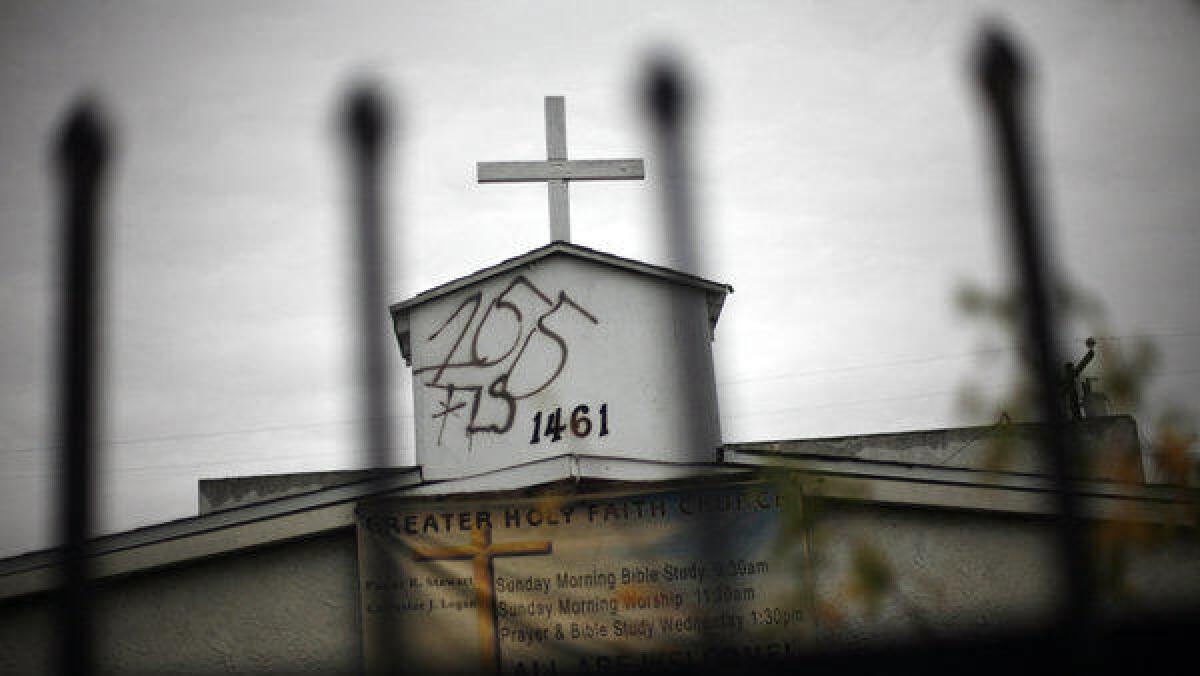
California lawmakers Friday stalled measures meant to help report and track hate crimes across the state, proposals filed amid a wave of incidents reported after the 2016 presidential election.
The state Assembly Appropriations Committee shelved bills that would have created new hate-crime reporting requirements for police and a hotline under the attorney general’s office for victims wishing to report an attack.
Of those bills, a proposal filed by Assemblyman Raul Bocanegra (D-Pacoima) initially sought to develop a state government database with the names of felons convicted of hate crimes related to race, religion and sexual orientation.
That proposal was amended to instead require every law enforcement agency to forward a summary of a reported hate crime, upon conclusion of an investigation, to the human relations commission within its jurisdiction. But a committee analysis found it could cost the state more than $150,000 to help agencies redact personal information from their records.
The committee also shut down bills that would have required police to update policies to address hate crimes and include a checkbox on the front pages of reports that would prominently provide an option to indicate whether a crime was bias-related.
Local law enforcement officials have reported a recent rise in reported hate crime incidents. Existing state laws require local and state law enforcement officials to compile hate crime information. California jurisdictions reported a 10.4% statewide increase in those incidents last year.
- Share via
Obama staffer Buffy Wicks running for California Assembly
- Share via
Here were the top six moments from last night’s L.A. congressional race debate
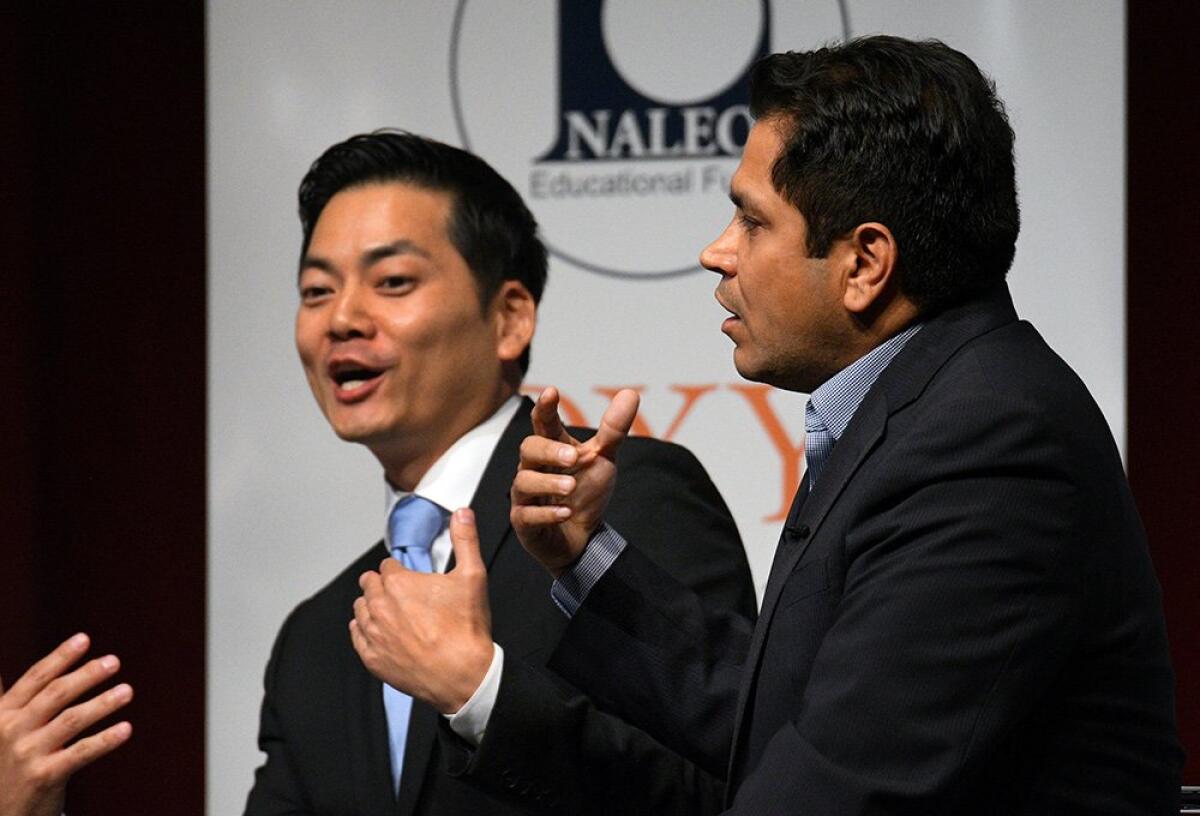
Attorney Robert Lee Ahn and Assemblyman Jimmy Gomez sparred Thursday night at the first and only debate in the runoff race for the 34th Congressional District seat.
The candidates, both Democrats, offered little in the way of policy differences. Both agreed President Trump has “racist tendencies,” that keeping the Affordable Care Act is a top priority, and that they would fight to protect immigrants’ rights.
Ahn came out swinging, repeatedly calling Gomez an “insider” who’s “sponsored by special interests,” while Gomez pointed to his work supporting progressive policies in the Legislature and endorsements he’s received from left-leaning groups.
Here are the top six exchanges:
- The numbers problem: Gomez again criticized Ahn for a response he gave in an L.A. Times questionnaire that suggested he would negotiate with Republicans to protect parts of Obamacare. Gomez said Democrats need to take a “hard line” and that Ahn was too soft on support for Medicaid. “In case you haven’t noticed, we have a numbers problem in Congress,” Ahn shot back. “Until we’re able to take back the House, we’re going to have to talk to the other side.”
- Gomez fact-checks Ahn’s name-check: Ahn made the case that voters should send an attorney to Congress to help in the legal battles against the Trump presidency. “I will join fellow attorneys and Congress members Ted Lieu and Adam Schiff in the fight,” Ahn said to the crowd. Gomez, who spent much of the evening bringing up his legislative experience and vast array of endorsements, responded: “I hate to mention it, but, you know, Adam Schiff and Ted Lieu have endorsed me.”
- Getting more personal: In discussions about immigration and healthcare, Gomez and Ahn delved a little deeper into their backgrounds. Gomez talked about his young nephew who feared that his mother, a permanent resident, might be deported after Trump was elected. Ahn told the story of how his parents came to the United States with $700 each and cobbled together enough money to open a hamburger stand, eventually building their “piece of the American Dream.”
- Ahn on the attack: Ahn repeatedly criticized Gomez for taking money from corporate interests. “Special interests, big pharma, big bankers. ... It’s all payback time [for Gomez donors] on Day One,” Ahn said. “On Day One, I owe the people of the 34th District and that’s it.” Ahn pitched himself as an outsider who understands the district and whose small-business experience will help him relate to the problems facing everyday residents.
- ‘A litmus test’: Gomez fought back against the idea that he’s a “corporate Democrat,” primarily by pointing to several endorsements he’s received from left-leaning groups. “If I was so establishment, I don’t think Our Revolution ... would actually endorse me,” Gomez said of the Bernie Sanders-affiliated group. “If you want a litmus test, that’s a litmus test if you’re a progressive ... if you’re actually able to take on the status quo.”
- Gomez gets skewered on gas tax: As part of his argument that he has fought for the “little guy,” Ahn expressed outrage that California’s gas taxes will increase July 1, saying there’s “nothing progressive” about the gas tax hike Gomez voted for. “We already paid 38 cents per gallon. Where is that money going?” Ahn said, echoing a line many legislative Republicans have used. “Sacramento politicians, this is what they do, they take our money and they spend it and there’s no accountability.” Gomez responded by saying public safety was at stake and that fixing roads was the “responsible” thing to do.
If you missed it, you can watch the entire thing here.
The election is set for June 6.
- Share via
Rob Reiner, Hollywood bigwigs and Netflix co-founder team up to give Villaraigosa’s campaign a major cash boost
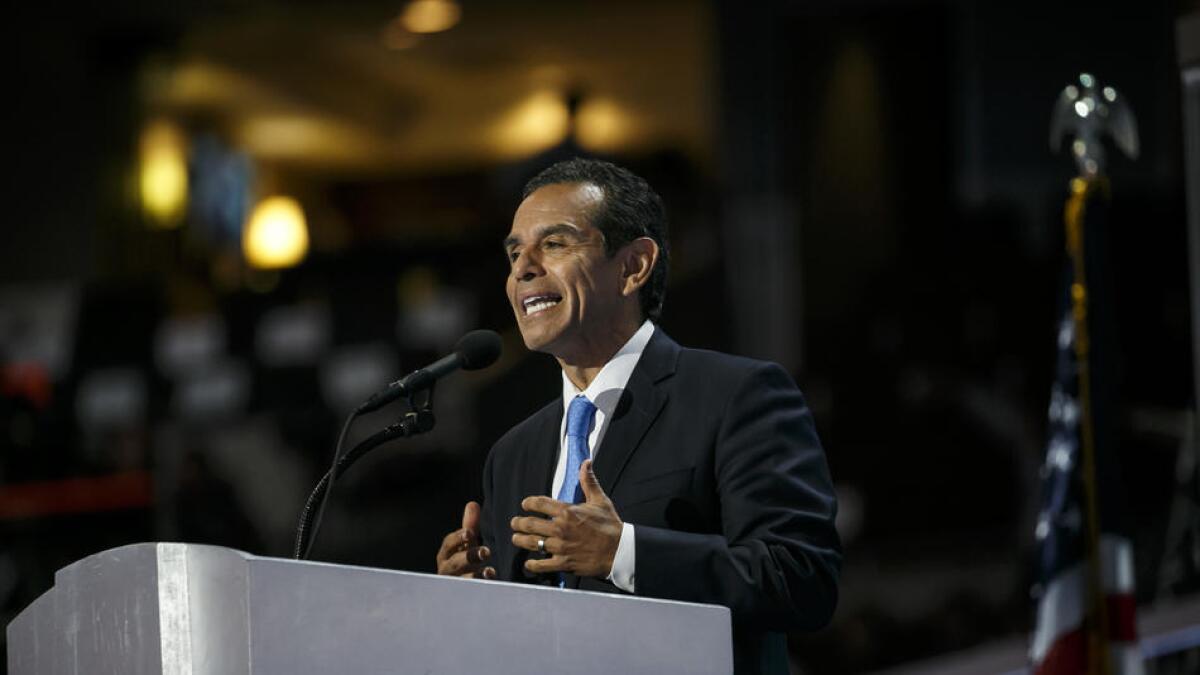
Hollywood heavyweights are set to host a major fundraiser for Antonio Villaraigosa’s gubernatorial campaign on June 15, ensuring an infusion of large contributions shortly before a key fundraising deadline.
Donors are being asked to contribute up to $29,200 to attend a “summer reception” at the home of media executive Peter Chernin and his wife Megan, the site of a celebrity-studded fundraiser for President Obama in 2013.
Co-hosts include Paramount Pictures chief Jim Gianopulos, Netflix co-founder Reed Hastings, video game honcho Robert Kotick, comedian George Lopez, Sony chief Michael Lynton, NBCUniversal vice chairman Ron Meyer, producer Rob Reiner, super-agent Rick Rosen, producer Orly Adelson, former U.S. Ambassador to Spain James Costos, former White House decorator Michael Smith and attorney Michael Tuchin.
Villaraigosa, the former mayor of Los Angeles, entered the governor’s race in November. Through the end of 2016, he raised $2.7 million, a respectable haul in a short time period when Democratic donors were reeling from the presidential election and distracted by the holidays.
But his fundraising lags behind that of his top rivals, Lt. Gov. Gavin Newsom and state Treasurer John Chiang. So political observers will be scrutinizing his next financial disclosure report, which will cover the first six months of 2017. The fundraiser occurs 15 days before the fundraising period closes on June 30.
- Share via
A delay on cap-and-trade vote would be a victory for Donald Trump, Gov. Jerry Brown’s office says
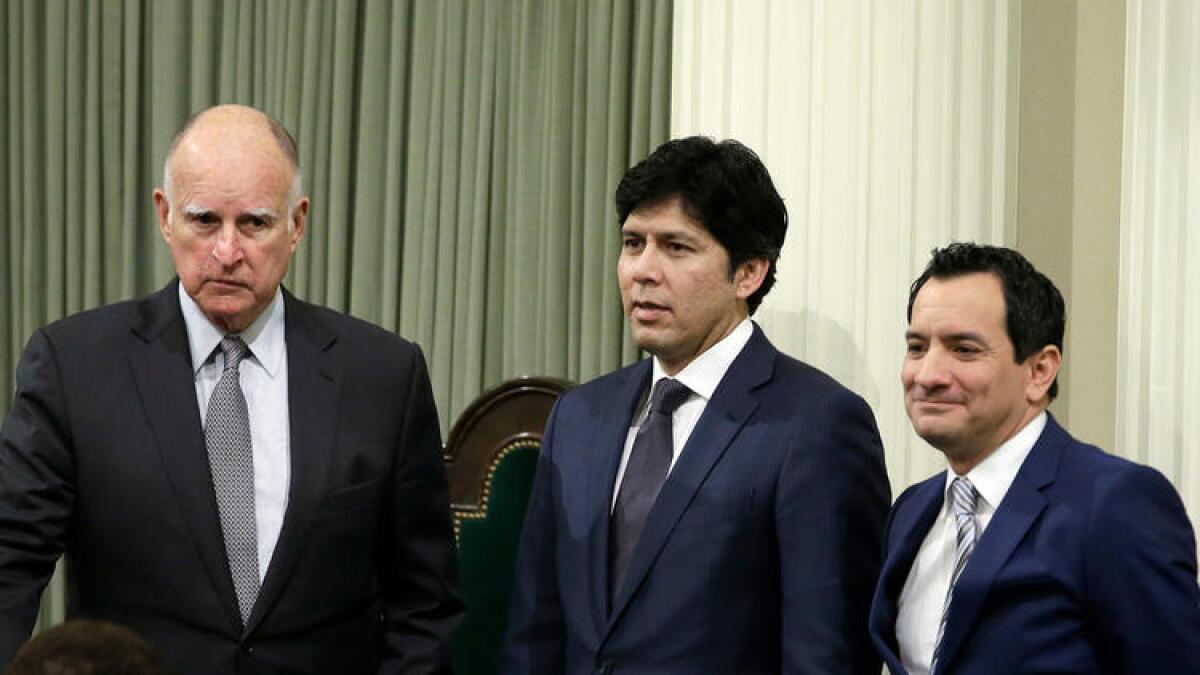
Despite hesitance and resistance from state lawmakers, Gov. Jerry Brown is refusing to budge from his goal of reaching a deal next month to extend California’s cap-and-trade program.
The latest tug-of-war on the issue came this week in an email exchange circulated among Capitol staff members and advocates working on climate change policies.
Kip Lipper, an environmental advisor for Senate leadership, wrote in a Thursday email that there were “no plans to take up a cap and trade reauthorization bill anytime soon.”
Echoing concerns that have percolated among lawmakers, Lipper said senators were “gas tax weary” about the possibility of another difficult vote after deciding to raise gas taxes to pay for road repairs earlier this year.
The cap-and-trade program, which is a cornerstone of California’s fight against global warming, requires companies to buy permits to release greenhouse gas emissions and could boost the price of gasoline.
With votes hard to come by, Lipper wrote, the issue “should not be rushed.”
Camille Wagner, Brown’s legislative secretary, responded on Friday saying there was no reason to delay.
“We’ve all been meeting for months on this issue,” she wrote. “We know the areas of agreement and disagreement – now is the time to work through those.”
She added that “NOTHING is more important” than getting a deal as soon as possible.
“This is not a time for retreat or a time to give aid and comfort to Donald Trump by undermining a pillar of California’s bold program to arrest climate change,” Wagner wrote. “If California’s Cap and Trade falls because we fail to act, climate denial wins.”
Brown had already faced resistance to his push to reach a deal on cap and trade in June, when the state budget is due. Assembly Speaker Anthony Rendon (D-Paramount) previously said “we don’t have to extend it this year.”
The disagreement over the timeline for reaching a deal is only one of the disputes surrounding cap and trade.
Assembly leaders have raised the possibility of pushing legislation with only a majority vote, an idea the governor’s office rejected. Brown wants a two-thirds vote to insulate cap and trade from legal challenges.
There are also varied ideas about how the program should function in the future. Assembly legislation would modify cap and trade so it also targets local pollution, rather than just greenhouse gases. Senate legislation would make the program function more like a carbon tax.
- Share via
California lawmakers shelve bills that would have broadened the state’s legal definition of a ‘violent crime’
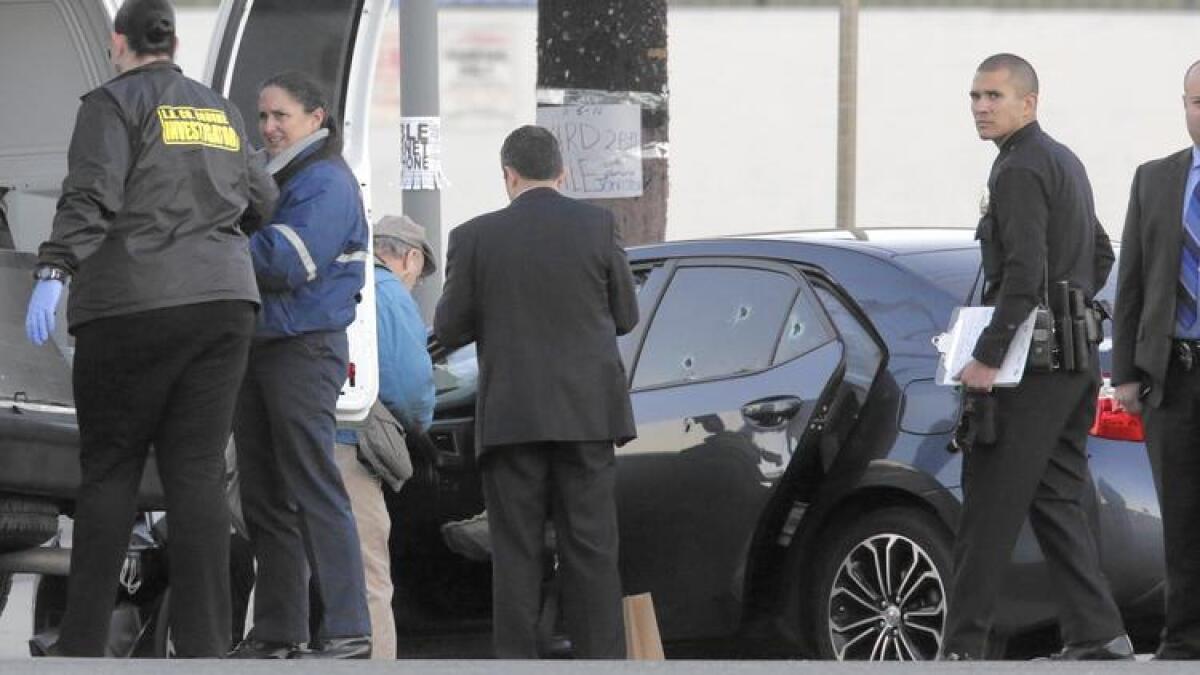
California won’t be expanding its legal definition of a violent crime soon.
The Assembly Appropriations Committee on Friday shelved the last of several bills that sought to broaden the number of violent-felony offenses under the California penal code. The legislation would have added to the list additional forms of rape, sodomy and human trafficking. It carried a heavy price tag.
A bipartisan proposal filed by the committee’s chair, Lorena Gonzalez (D-San Diego), and Assemblywoman Melissa Melendez (R-Lake Elsinore), would have cost the state more than $1 million in corrections expenses. It would have increased the length of incarceration for more than 100 prisoners.
Another bill by Assemblyman Freddie Rodriguez (D-Pomona) was estimated to add annual costs in the millions for increasing the sentences of more than 200 inmates. They joined two other legislative proposals shelved in the Assembly Public Safety Committee this year.
The bills sought to change the legal definition of a violent crime as California undergoes a massive overhaul of its parole system.
Gov. Jerry Brown’s Proposition 57, which voters overwhelmingly approved in November, will expand good behavior credits and give new power to the state parole board to consider the early release of prisoners who have served the full term of their primary sentences, and whose crimes are not designated as “violent” under the California penal code.
But opponents have argued that list is both short and porous.
- Share via
The effort to make tampons tax free in California has been delayed until 2018
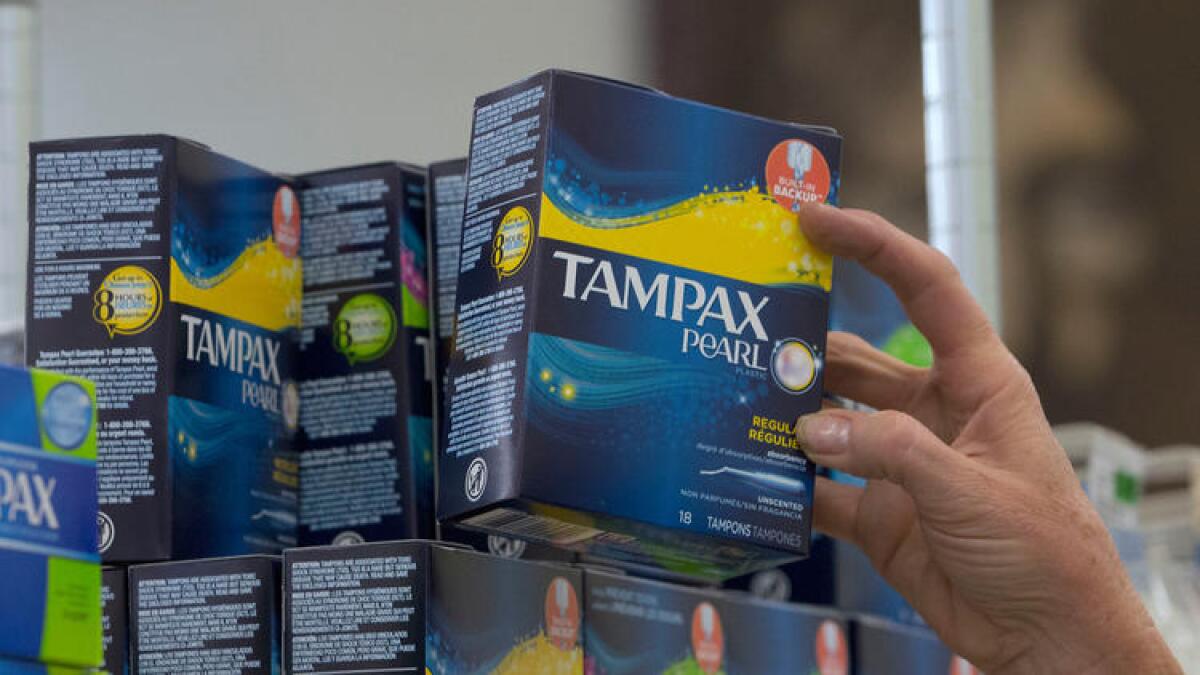
Legislation to eliminate California sales taxes on the purchase of tampons was delayed Friday by the Assembly’s fiscal committee until 2018, a blow to advocates who say the tax is an unfair burden on low-income women and families.
The delay imposed on AB 9 is the second setback this month for efforts to eliminate taxes on products for women and children. A separate bill that included a tax-free provision for diapers was killed in a legislative committee on May 8.
The bill that was held back on Friday, written by Assemblywoman Cristina Garcia (D-Bell Gardens), would have excluded tampons, sanitary napkins and other menstrual products from sales taxes. A legislative committee analysis estimated the proposal would reduce state general fund revenues by $10.5 million a year.
Dozens of other bills with a cost to state government were killed by the Assembly Appropriations Committee, while AB 9 was instead reclassified as a “two-year bill,” meaning it is eligible to be heard again in the second year of the legislative session.
Gov. Jerry Brown last year rejected a similar measure that sought to make tampons tax-free, writing in his veto message that “tax breaks are the same as new spending – they both cost the general fund money.”
- Share via
Outside money spills into L.A. congressional race as election day nears
Spending by outside groups hoping to influence Los Angeles’ congressional race is picking up, with less than two weeks to go before the runoff for the 34th Congressional District.
Assemblyman Jimmy Gomez and attorney Robert Lee Ahn, both Democrats, are competing to fill the former seat of Xavier Becerra in the June 6 election. Becerra stepped down months ago to become the state’s attorney general.
Spending separate from the candidates’ campaigns is reaching into the six-figure range, with most of the outside money going to support Gomez, the heavy favorite of establishment Democrats.
One group funded primarily by an Ahn donor, Citizens for a Better Government, has spent $40,264 on data, printing and postage for mailers, and $8,000 on treasury services to support Ahn’s bid.
The Latino Victory Fund, which has endorsed Gomez, recently spent $29,640 on direct mail and $30,000 on phone banking and voter canvassing for the candidate. Billboard company Outfront Media LLC has spent $1,973 on billboards for him.
Also backing Gomez is a group called Middle Class Values PAC. The group spent $19,653 on mailers supporting Gomez despite not having reported receiving any major contributions so far this year.
The group’s biggest donors last year were a handful of Nevada casino owners and developers, but most of that money appears to have been spent on Democrats running for Congress in Pennsylvania and Nevada.
Outside spending in the 34th Congressional District race has been dwarfed by candidate spending. As of March 31, Gomez had spent $446,455 and Ahn had dropped about $767,315 on his run.
New campaign finance figures from both candidates are due at midnight Friday.
- Share via
Gov. Jerry Brown’s budget team drops its hotly debated plans to redefine the state’s spending limit
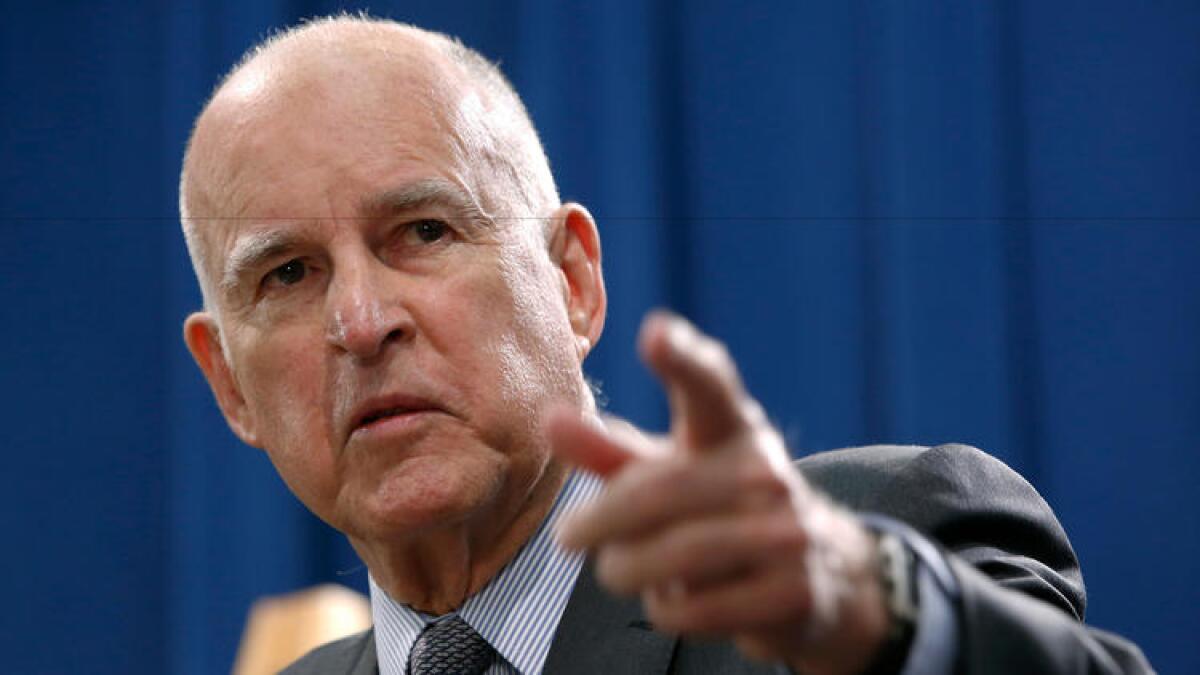
With questions mounting about the legal justification for omitting some $22 billion in expenses from California’s long-standing spending cap, Gov. Jerry Brown’s administration dropped the plan Thursday while promising to work on the issue again later this year.
Brown’s advisors told the Assembly Budget Committee that this could include some changes in state law to clarify the rules surrounding what’s known as the “Gann limit,” a cap on state spending growth imposed by voters in 1979. The cap has rarely come into play in state budgeting in recent years, as it was loosened by a subsequent ballot measure in 1990. The governor’s administration said it continues to worry about how the law interacts with other mandates related to school funding.
“School financing has changed significantly since the limit was first established in 1979,” said H.D. Palmer, Brown’s budget spokesman. “Because of that, we continue to believe we need statutory clarifications related to these school funding changes.”
Legislative analysts warned lawmakers in April that the governor may have been overestimating how much room for spending was left under the cap, a dispute that continued for weeks while lawmakers began drafting plans for formal budget negotiations next month.
Earlier this week, state senators again raised concerns about the complex estimates used to determine how much spending the Gann law would allow in the budget year that begins July 1. And they provided an analysis by the Legislature’s lawyers that suggested Brown’s proposal could be unconstitutional.
The spending limit is enforced over two fiscal years, which means Brown and lawmakers have time to reconcile different estimates. But absent changes similar to those advocated by the governor, a portion of future tax revenues would have to be split between schools and rebates to taxpayers.
- Share via
California Senate, Assembly advance their own plans on how to spend tobacco tax revenue
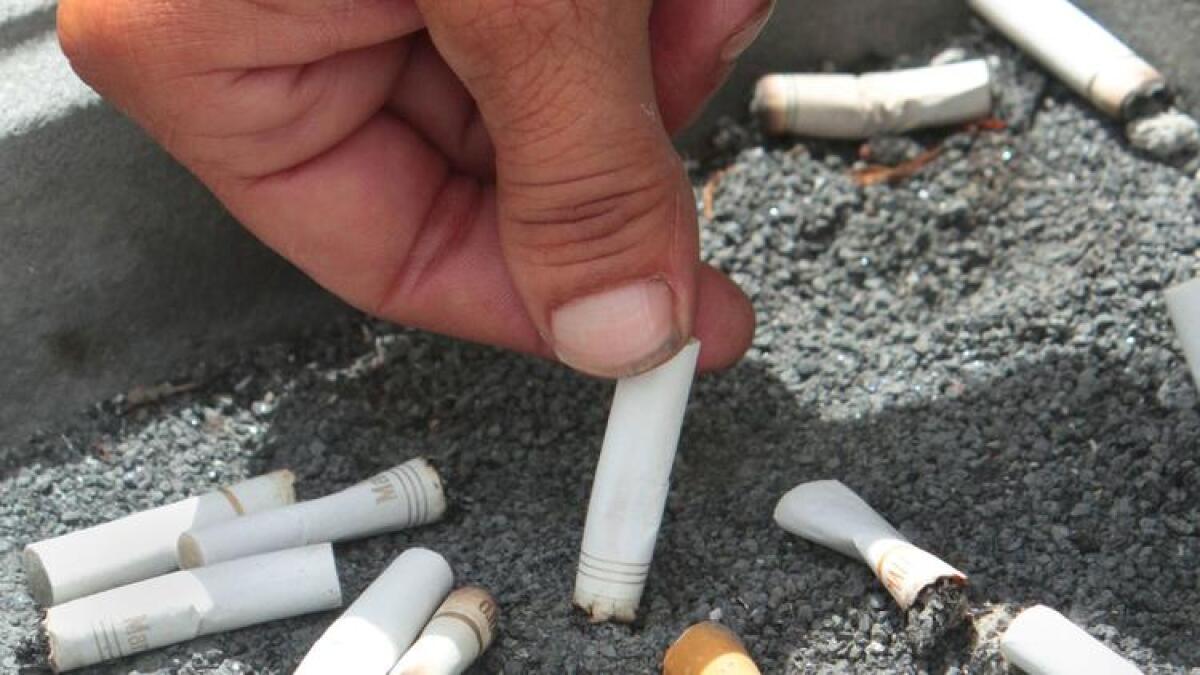
Perhaps the biggest budget skirmish that remains unsolved this year is how California should spend revenue from the tobacco tax voters approved last fall.
Gov. Jerry Brown wants to put that money to expand overall spending on Medi-Cal, which provides subsidized healthcare for the poor. But the some of initiative’s backers, namely doctor and dental groups, have cried foul, arguing that money is meant to go to increasing payments for providers.
Now, the Senate and Assembly are weighing in. In plans approved in their respective budget committees this week, both houses stray from Brown’s proposal to put the money toward general Medi-Cal costs and lay out their own ideas on how to divvy up the revenue.
But while both houses reject Brown’s approach, there are key differences between their proposals. Most significantly, the Assembly would allocate all $1.1 billion in projected tax revenue in the next budget year. The Senate, meanwhile, would spend just under $350 million next year, gradually ramping up spending to $1.1 billion by fiscal year 2020-21.
Both houses also would increase provider payments, but in different ways. The Assembly would put around $857 million toward once-yearly “incentive payments” to physicians and dentists that would be tied to their Medi-Cal and Denti-Cal caseloads.
The Senate proposed putting $150 million next year to physician rate increases that would be targeted for those working in high-need areas and specialties. That number would increase in successive years, topping out at $700 million by 2020. The Senate also would put $130 million toward higher rates for dentists.
The California Medical Assn., which has been pushing for higher reimbursement rates, praised both houses for including the higher rates, but group spokeswoman Joanne Adams noted that “the current Legislature cannot tie the hands of a future governor or Legislature,” indicating a preference toward the Assembly approach.
Each house would allocate $50 million for reimbursement rates for family planning providers, a priority of Planned Parenthood.
And both houses put money toward expanding Medi-Cal to cover young adults up to age 26 who are in the country illegally. The proposal builds on California’s policy of making children without legal status younger than 19 eligible for Medi-Cal, which went into effect last year.
Anthony Wright, of the advocacy group Health Access, noted that by expanding coverage for those up to age 26, it would align with Obamacare’s policy of letting children stay on their parent’s health insurance until that age.
“This is a concrete and tangible way to show we are actually taking steps forward” in expanding coverage, Wright said.
The Brown administration estimates that around 130,000 people would be eligible for Medi-Cal under such a proposal, and such an expansion would cost the state just under $230 million.
The Senate proposal would put around $63 million toward that expansion in the upcoming budget year and around $85 million in subsequent years. The Assembly would put $54 million toward the plan.
The Brown administration did not take a position on the Medi-Cal expansion proposal, but H.D. Palmer, spokesman for Brown’s Department of Finance, noted that the Senate was using higher revenue projections than Brown’s plan, which allows legislators to propose more funding.
Palmer said the administration was sticking with its original proposal to use tobacco tax dollars for general Medi-Cal spending.
“The budget’s proposal for Prop. 56 will provide increased funding for healthcare programs and services in a way that’s consistent with the measure that voters approved last fall,” Palmer said.
------------
FOR THE RECORD
May 25, 2017, 4:58 p.m.: A previous version of this article reported that both houses were using higher revenue projections than Gov. Brown’s budget proposal. The Senate is using higher projections; the Assembly is using the same estimates as the Brown administration.
- Share via
California chief justice says she stands by her decision to speak out against Trump’s immigration actions
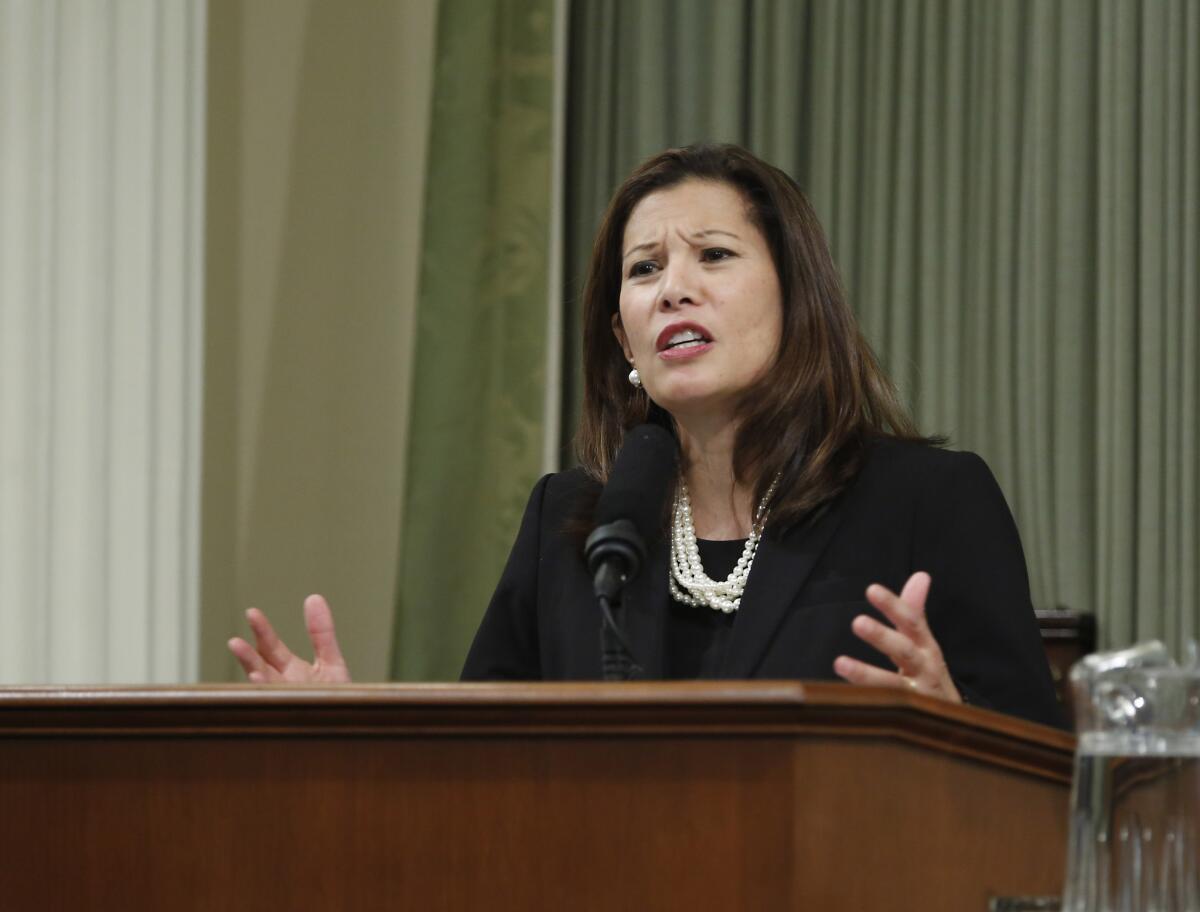
California Supreme Court Chief Justice Tani Cantil-Sakauye on Thursday said she stands by her position that courthouses should be areas where immigration arrests should not occur.
Cantil-Sakauye, a former prosecutor who rose through the judicial ranks as an appointee of Republican governors, drew national attention in March after she blasted the federal government’s expanded immigration actions, among which she said included “stalking” immigrants at courthouses.
Speaking at a Sacramento Press Club luncheon on Thursday, she said the Supreme Court chambers fielded an outpouring of calls and letters after her comments. Some were “profane” and angry, from residents living outside the state. Others came from supporters.
Many said that as a judge, she should not wade into politics. U.S. Atty. Gen. Jeff Sessions and Homeland Security Secretary John F. Kelly admonished her in a letter, spurring California state leaders to respond in defense of state policies.
On Thursday, Cantil-Sakauye stood by her decision to denounce the actions, saying, “If I couldn’t speak out as chief justice, I don’t know who could.”
Courthouses in California have numerous programs to encourage people to come forward and ask questions, seek services and mediate issues, Cantil-Sakauye said.
“If we have a segment [of the population] that is afraid to come, then we are looking at no access to justice, [and] potentially public safety issues, which is antithetical to what the justice system exists for,” she said. “To me, it is a safe zone, and I ask that courthouses be placed on par with school districts and hospitals and churches.”
- Share via
Rep. Darrell Issa says the federal employee insurance program should be expanded to all Americans
Though it wasn’t included in the House Republicans’ healthcare bill, Rep. Darrell Issa (R-Vista) still believes Americans should have access to the same insurance plans federal employees pick from, and he’s hoping the Senate will embrace the idea.
In a letter Thursday, Issa asked the Senate Health Care Working Group to consider opening the Federal Employee Health Benefits Program to more, or all, Americans. It’s a national insurance idea that’s persisted since the program began in 1960, and a proposal Issa has pitched before.
The program allows more than 8 million current and retired federal employees across the country to shop among hundreds of health insurance plans and then apply their employer contribution to whatever plan they choose.
Private insurance companies have pulled out of several state insurance marketplaces, where people whose employers don’t offer insurance can purchase insurance using a federal subsidy. That leaves people with fewer health insurance choices, a common complaint cited by Republicans as a reason to repeal the Affordable Care Act.
“It’s choice. If the government can maximize choice to you and then subsidize where appropriate based on need, then we’ve met the two bases for government involvement,” Issa said.
Issa voted for the American Health Care Act, the GOP bill to roll back much of Obamacare that passed May 4 without Democratic support, but he stresses that he did so just to keep momentum.
“One of the reasons I voted for this in the House was to keep the process alive so we could do reform,” Issa said. “Leveraging business models that work is the goal that somebody like me wants to do. Find out what works and invest in it, find out what doesn’t work and fix it or abandon it.”
On Thursday, the Congressional Budget Office said the bill as passed by the House would cause 23 million fewer people to have health insurance by 2026. The budget office, which Congress relies on to analyze the complex legislation, projected that many additional consumers would see skimpier health coverage and higher deductibles.
The Senate has essentially said it will write its own version of the bill.
Issa’s letter to his Senate colleagues also urges members to protect people with preexisting conditions, safeguard coverage for people with mental illnesses and protect people near retirement age from a spike in their premiums.
“There’s still more to be done. This bill is going to be about compromise, and a down payment on change,” Issa said.
- Share via
Senate President Kevin de Léon is busy raising campaign funds — but for what office?
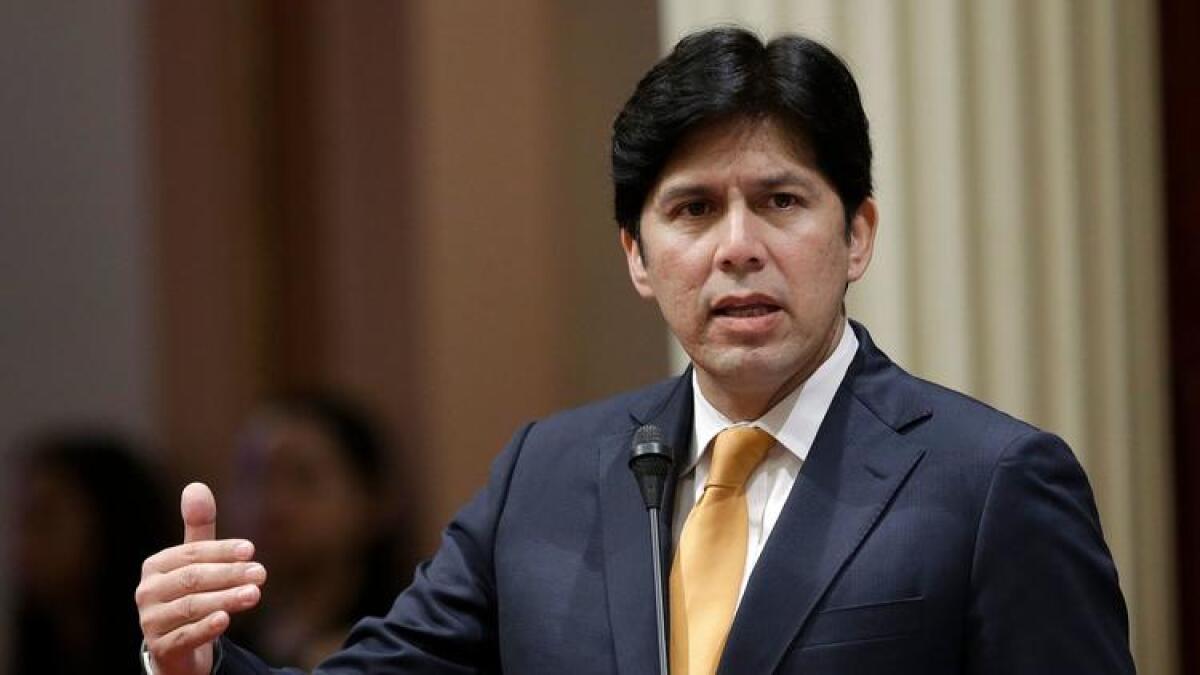
California Senate President Pro Tem Kevin de Léon (D-Los Angeles) stirred up speculation about a possible run for governor or U.S. Senate when he released a slickly produced video just before the California Democratic Party’s convention last weekend, but he has remained coy about his future political plans.
That doesn’t mean he isn’t padding his campaign war chest, though. De León has two fundraisers lined up in Los Angeles in June, presumably for his 2018 campaign for California lieutenant governor.
The question is whether De León actually will run for lieutenant governor. In the past, he has said he hasn’t made a decision. He has also given his supporters the go-ahead to endorse state Sen. Ed Hernandez (D-Azusa), a longtime political ally, in the race.
De Léon’s campaign account for lieutenant governor had $1.7 million in the bank at the end of last year. He raised close to a half-million this year, according to state political financial disclosure reports.
The first fundraiser in June is being hosted by veteran Hollywood executive Peter Guber and his wife, Tara, in Bel Air on June 8, with suggested contributions ranging from $500 to $2,500.
The second is in late June at the Palm in Los Angeles. The fundraiser is hosted by Craig Darian, CEO of the Occidental Entertainment Group, and his wife, Kimberly, as well as Albert Sweet, the founder of the company. The suggested donations are the same as for the earlier fundraiser.
De León made history in 2014 when he was selected by his colleagues as the first Latino to lead the California Senate. The tenure has been marked by significant action on climate change, immigration and gun control.
- Share via
Volkswagen’s clean car plan falls short in low-income neighborhoods, California regulators say

State regulators have asked Volkswagen to revise its plan to invest in zero emission technology in California, a victory for critics who said the automaker wasn’t doing enough in disadvantaged communities.
The investment plan, which will total $800 million over 10 years, is part of Volkswagen’s obligation under a multi-billion settlement for evading pollution rules.
California, which is struggling to get enough zero emission vehicles on the road to meet its goals, is “eager to move forward,” wrote Air Resources Board Executive Officer Richard Corey in a Wednesday letter to Electrify America, a Volkswagen subsidiary.
However, Corey wrote, “we need more information” on how the company will meet its target of spending 35% of its investment in disadvantaged communities, a target set by state regulators in hopes of broadening the adoption of electric vehicles.
Corey also asked Electrify America to consider supporting hydrogen fueling stations, rather than just electric chargers.
Once the company submits an updated version of its plan, state regulators will consider whether to approve it.
Electrify America said it is reviewing the letter.
Dean Florez, a member of the Air Resources Board, said the original investment plan had “significant holes” and “included no real investment in disadvantaged communities.”
He praised the decision to request revisions and said the board should “hold VW’s feet to the fire.”
This story has been updated with additional comments.
- Share via
Lawmakers scrap effort to make it easier to pass local transportation taxes
An effort to boost the chances of local ballot measures raising taxes for transportation needs was quietly killed Thursday in the state Capitol.
The proposal, which would have ultimately required changing the California Constitution through a statewide vote, was in response to the high hurdle set decades ago for local taxes earmarked for specific projects.
Those kinds of taxes in cities and counties require two-thirds of the vote. The constitutional amendment by state Sen. Scott Wiener (D-San Francisco) would have lowered the vote threshold to 55% of ballots cast for any transportation proposal.
Wiener argued the long list of local transportation projects lacking funds won’t completely be erased by the $52-billion transportation plan signed into law last month. And he pointed specifically to examples like a transportation tax plan in the Bay Area last year that garnered 62% of the vote — still slightly shy of the two-thirds mandate.
While the effort can be brought back before lawmakers adjourn the current session in the summer of 2018, Thursday’s action represented a major setback for transportation groups and labor unions that supported it. The measure was opposed by business and anti-tax advocates.
Wiener said he intends to re-introduce the measure in the coming weeks. “We must improve and expand transportation throughout our state, which has suffered from decades of underfunding,” he said in a written statement.
Update 1:29 p.m. This story was modified with additional information regarding constitutional amendments and the legislative process.
Update 4:10 p.m. This story was updated with comment from Sen. Wiener.
- Share via
Bail reform in California moves forward — even with a hefty price tag
- Share via
Sex offenders will not be banned without exception from school grounds after state bill is shelved
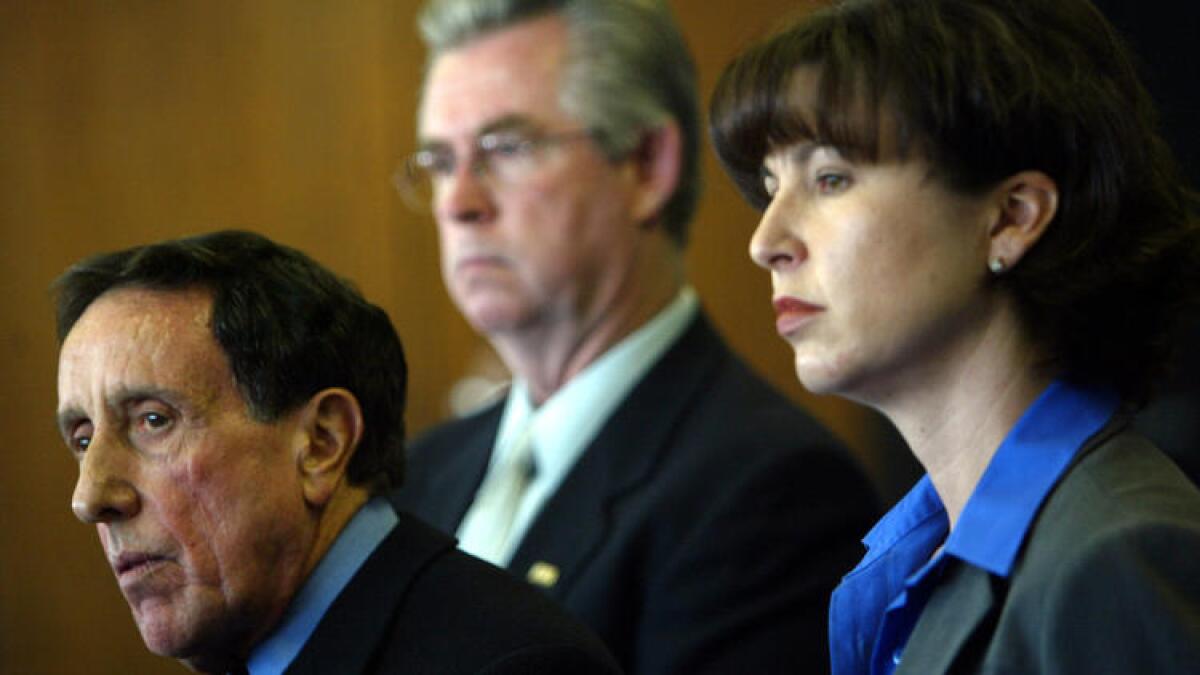
The state Senate Appropriations Committee on Thursday shelved a bill that would have banned all registered sex offenders from school campuses without exception.
Senate Bill 26 by Sen. Connie M. Leyva (D-Chino) would have made it a misdemeanor for a registered sex offender to enter any school building or grounds without lawful business.
State laws keep registered sex offenders from living near schools. But those who have not been convicted of having sex with a minor under age 16 can visit or volunteer with groups or organizations that work with children if they give proper notice, and are granted permission. They cannot work directly with children.
The committee advanced another bill by Leyva that would extend benefits under the Safe at Home initiative to former victims of forced prostitution or labor.
Senate Bill 597, introduced with Secretary of State Alex Padilla, passed with a unanimous 7-0 vote.
- Share via
Effort to end ‘free speech zones’ on California campuses comes up short
- Share via
Single-payer bill advances but big questions on how it would be funded remain
- Share via
Measure to help California students refinance private loans is shelved
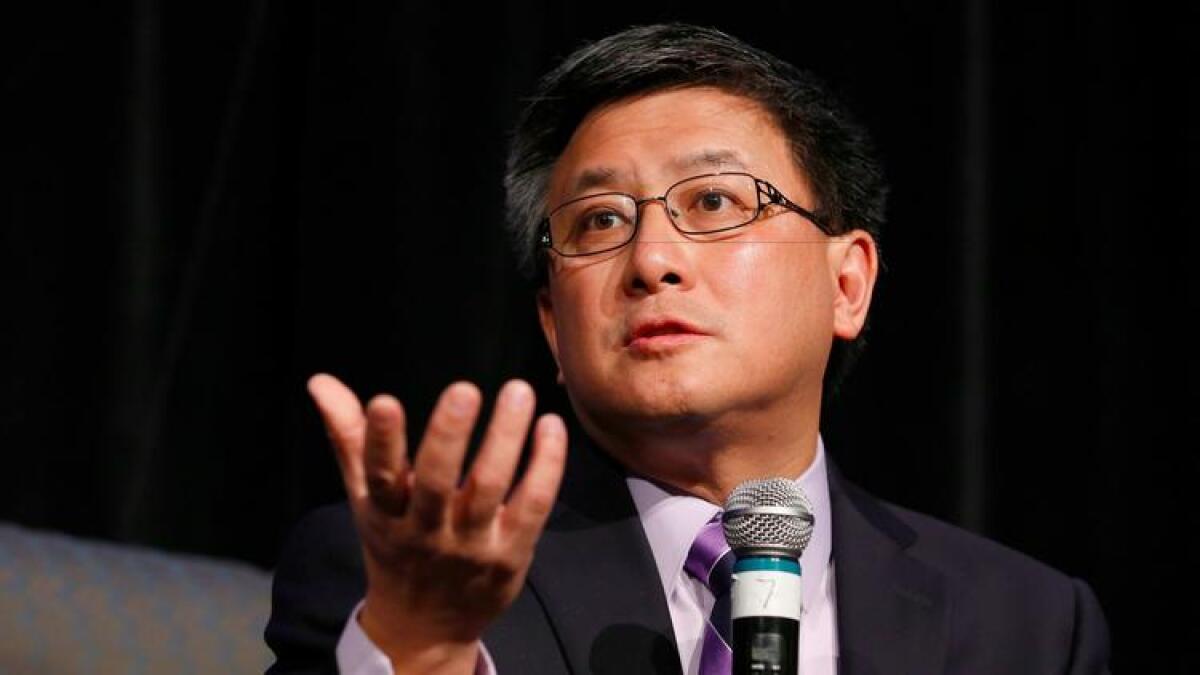
A measure to help Californians saddled with student debt refinance their student loans was shelved in a key fiscal committee on Thursday.
The measure by state Sen. Benjamin Allen (D-Santa Monica) was touted as a way for the state to coax private lenders to offer more favorable interest. The proposal would have carried a $25-million price tag.
“We will continue to push for sensible solutions to the student loan crisis that provide real relief to the millions of Californians saddled with too much debt,” Allen said in a statement.
State Treasurer John Chiang, a 2018 gubernatorial candidate, had championed the bill, SB 674, as a way to “try to get [Californians] out of debt as quickly as possible.”
“College graduation is supposed to be synonymous with opportunity and prosperity and not a detour into a modern-day debtor’s prison,” Chiang said in a statement.
“Although I am disappointed SB 674 will not be moving forward, I will continue to use my position as the state’s banker to invest in California’s young people and its future with innovative solutions that will make it more financially feasible to obtain a higher education,” he added.
3:58 p.m.: This article was updated to add comments from Sen. Benjamin Allen and Treasurer John Chiang.
This article was originally published at 11:17 a.m.
- Share via
State bill to train motel employees to spot signs of human trafficking held in suspense
- Share via
Where bills go to die: Lawmakers begin clearing the ‘suspense file’ with hundreds of measures in limbo
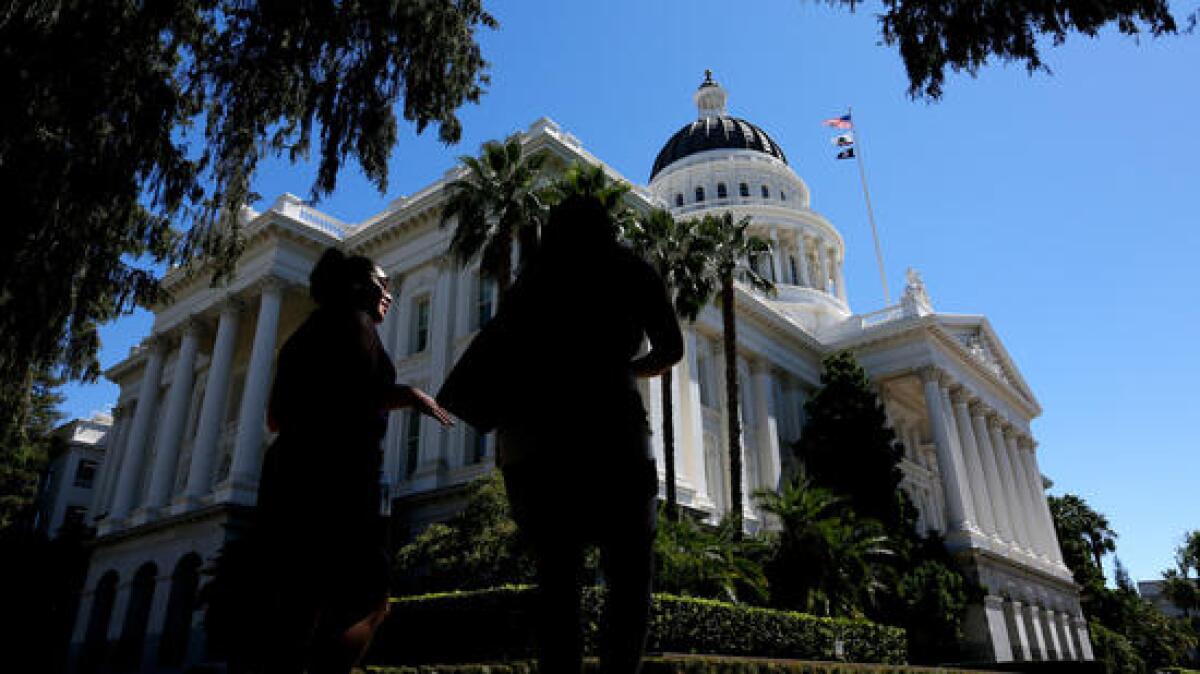
From a sales tax exemption on tampons to healthcare rules and marijuana regulation, a massive stack of proposed laws faces a major deadline Friday morning at the state Capitol.
To survive, they must clear what’s known as the “suspense file” -- the place where bills that would cost taxpayers money are held in legislative limbo.
By law, bills with a fiscal impact must be sent to the floor of the Assembly and Senate by the close of business on Friday. That means it’s decision time for more than 800 pieces of legislation.
The Senate’s fiscal committee will decide the fate of bills on Thursday; the Assembly will do so on Friday.
Bills are generally sent to the “suspense file” if their projected cost to the state is $150,000 or more. The procedural move was widely used during California’s deficit years as a way for lawmakers to weigh the pros and cons of proposals in light of limited resources.
But government watchdog groups have long pointed out that the clearing of the “suspense file” ends up hiding some of the legislative sausage-making from public view.
That’s because bills that don’t clear Friday’s hurdle are essentially killed without a recorded vote.
And neither chamber offers any explanation for why those bills were killed. Decisions on the fate of the “suspense file” are made in private, hours or days before the public hearing.
In the Assembly, the appropriations committee chairperson will simply tell the public that a decision has been made to “hold” the bill. In the Senate committee, killed legislation won’t even be mentioned during Thursday’s hearing.
That means that no one will know for sure whether a bill is really killed because of its price tag or its politics.
- Share via
Rep. Duncan Hunter says Gianforte’s alleged assault was wrong, unless ‘unless the reporter deserved it’
California Rep. Duncan Hunter (R-Alpine) had an interesting take on the alleged assault on a Guardian reporter by the Republican front-runner in Montana’s special election, Greg Gianforte.
Hunter told reporters Thursday, “It’s not appropriate behavior. Unless the reporter deserved it,” according to a tweet posted by the Associated Press’ Mary Clare Jalonick.
Gianforte has been charged with misdemeanor assault after a reporter said he slammed him to the ground for asking a question. The special election is today.
The FBI is currently investigating Hunter for possible campaign finance violations. The Democratic Congressional Campaign Committee recently added Hunter’s San Diego congressional district to its list of 2018 targets.
Hunter wasn’t the only California member commenting on the assault charge Thursday morning.
- Share via
Formal apology sought after U.S. Rep. Maxine Waters was cut off during state convention speech
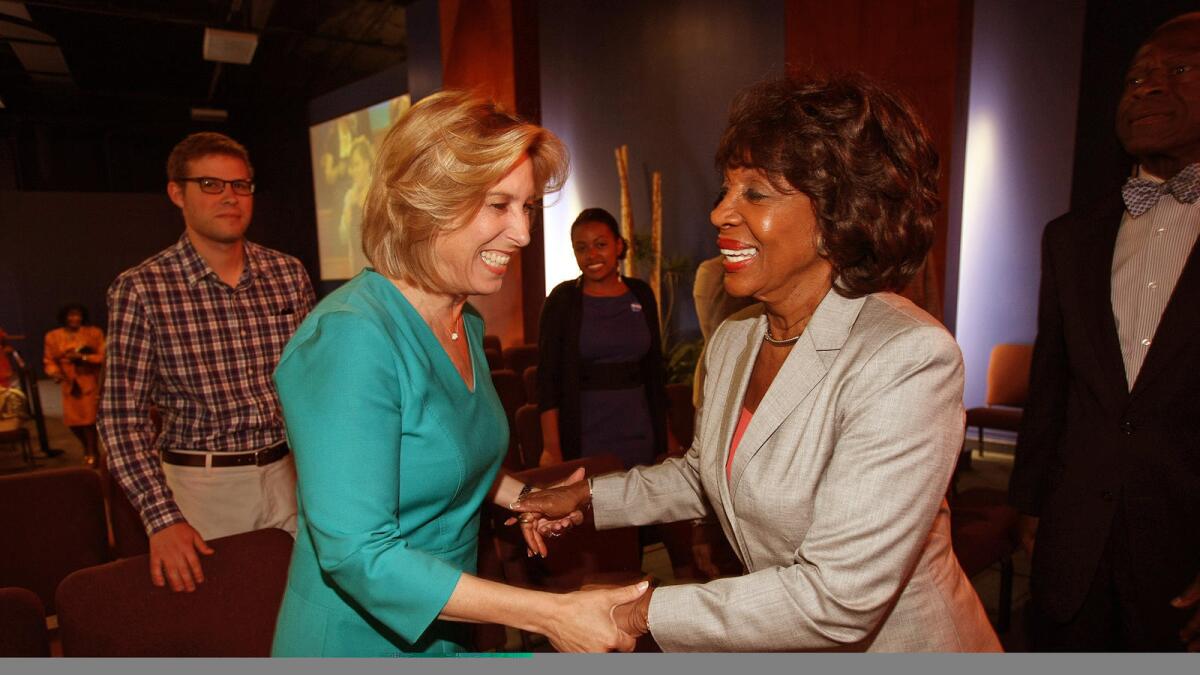
In my 20 years as a Democratic Party leader, I have never experienced such the type of behavior as I did at the Sacramento Convention hall on Saturday evening.
— Darren Parker, longtime chairman of the African American Caucus
The California Democratic Party African American Caucus is asking the state party for a formal apology to U.S. Rep. Maxine Waters and its members for what it called disrespect by a private subcontractor at its weekend state convention.
Waters, a Los Angeles Democrat known for her comments on President Trump, had been speaking at a caucus meeting during the event Saturday night when the sound to her microphone was cut off.
- Share via
California sees a rebound in cap-and-trade auction, bolstering key climate change program
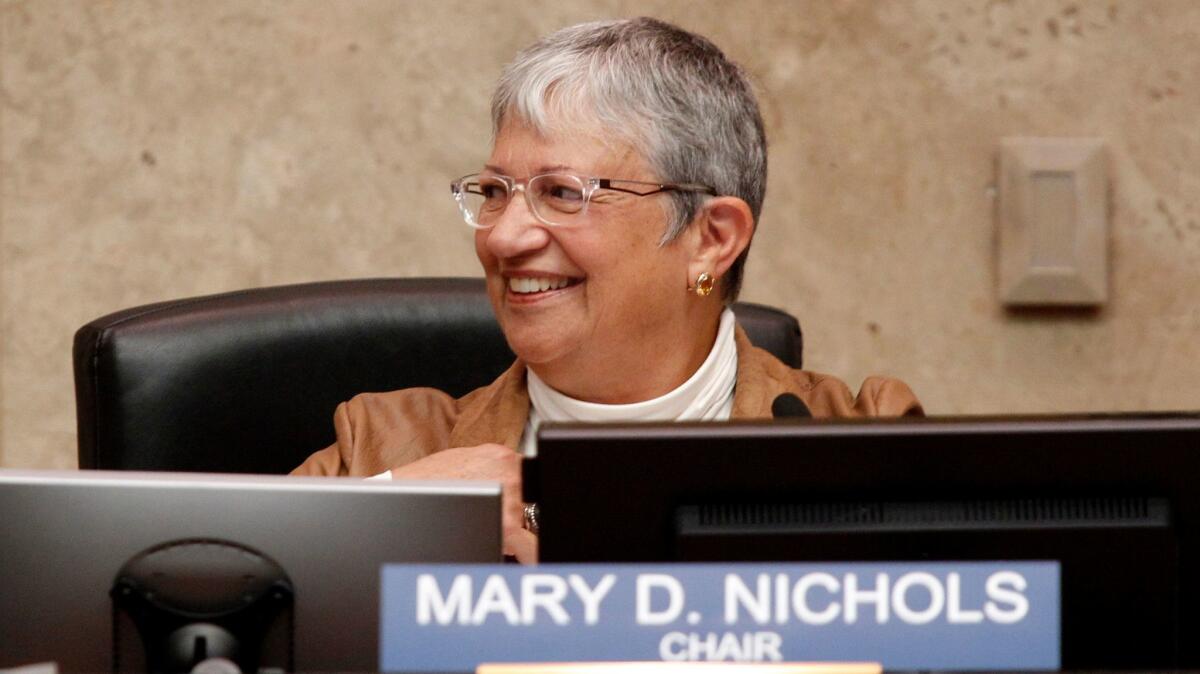
State regulators announced strong results from California’s cap-and-trade program on Wednesday, spurring analysts and supporters to say the system remains solid despite questions about its political future.
The program requires oil refineries, food processors, power plants and other facilities to buy permits to release greenhouse gas emissions. Nearly all of the permits offered by the state in its latest auction were purchased, generating an estimated $500 million in revenue.
That’s a shift from other recent auctions, where most of the permits went unsold, reducing revenue that state leaders have counted on for environmental and infrastructure projects.
But rules governing how the market for permits operates are helping to stabilize the system, said Chris Busch, research director at Energy Innovation. He called it “a triumph of policy design.”
Previous auction results also had been weakened by legal and political troubles involving cap and trade. The state received some relief from the legal problem when an appeals court in Sacramento rejected arguments from business groups that the program functions as an unconstitutional tax.
However, lawmakers are still debating whether to extend the program past 2020. One of the proposals, SB 775, would dramatically overhaul cap and trade, an idea the Environmental Defense Fund opposes.
“California has a strong carbon market design that can weather legal challenges and the inevitable bumps of the political process,” said Erica Morehouse, a senior attorney at the organization.
- Share via
Foster kids spend the day shadowing California members of Congress
Leonardo Jimenez, 21, of Los Angeles said after a lifetime in foster care, he never expected to have his congresswoman speak his name on the House floor, or to become a part of the historical record of the United States.
On Wednesday, Rep. Karen Bass (D-Los Angeles) spoke about Jimenez and the more than 100 other young people participating in the Congressional Foster Youth Shadow Program in a speech on the House floor.
“We have someone that is advocating for us that hasn’t been in our shoes, but is willing to take off her shoes and put herself in our shoes to know our needs, our wants and she’s very involved in our future,” Jimenez said. “She’s given me a voice.”
Bass started the Congressional Foster Youth Shadow Program six years ago, during her first term in Congress. The program has grown and now the National Foster Youth Institute runs the all-expenses-paid program along with several foster support groups.
Nearly 100 members of Congress from more than 30 states participated this year, Bass said. That includes 19 California members of Congress.
“The hope is that they build a long-term relationship with their member of Congress, so they can be the foster care expert, to keep that issue in their ear,” Bass said.
Jimenez said his goal for the trip was to talk with members about life as an LGBTQ foster youth. He graduates soon from West Los Angeles College in Culver City and just found out he’s been accepted to New York University, where he wants to study communications. After that, he wants to open an LGBTQ group home.
The conversation earned him a surprise hug from Rep. John Lewis (D-Ga.), who was the keynote speaker at the foster youth lunch.
Members of Congress who participate are expected to let the young people shadow them for the day, not just leave them with staff or send them on a tour of the Capitol. That means taking them along to vote, attend committee meetings or chat with constituents.
For Rep. Adam Schiff’s two shadows, Demontea Thompson, 23, and Johna Rivers, 24, both of Los Angeles, that included listening to the Burbank Democrat as he was peppered by reporters’ questions at a breakfast hosted by the Christian Science Monitor. Afterward, they hopped in the back seat of his Audi for a ride back to the Capitol.
Jordynn Franklin, 20, of Modesto took over the social media accounts of Rep. Jeff Denham (R-Turlock) as they moved around the Capitol, going to a Transportation and Infrastructure Committee meeting, and sitting down with a few interest groups. She even got a chance to meet Denham’s French bulldog, Lily.
“We ran around like a crazy person all day,” she said.
Franklin asked Denham about creating a federal program where former foster youth help train new foster parents.
“We’ve already decided, we’re going to work together on putting some legislation together,” Denham said.
- Share via
L.A. Daily News endorses Robert Lee Ahn in 34th Congressional District race
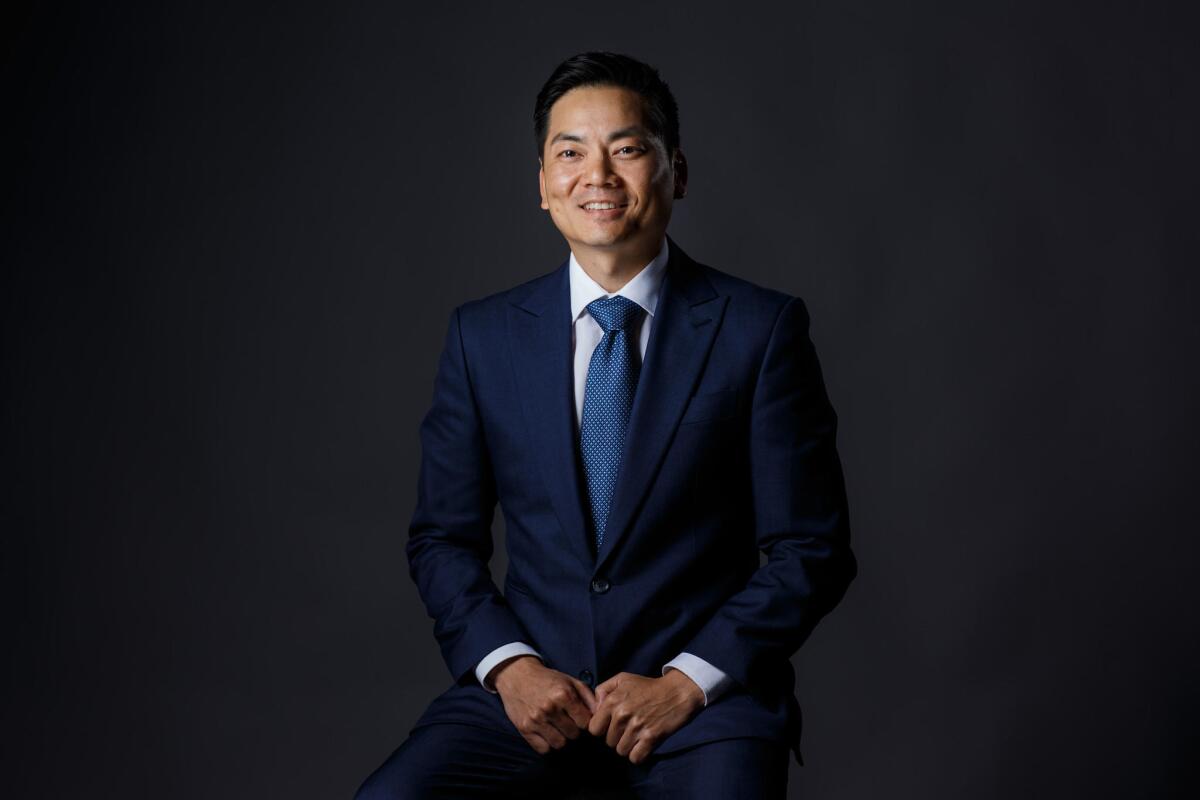
The Los Angeles Daily News has endorsed Robert Lee Ahn in the race to replace Xavier Becerra in Congress. With two Democrats vying for the seat, the newspaper’s editorial board said the race “won’t change much nationally.”
But Ahn, the Daily News says, is “not an assembly-line product of party politics.”
The editorial board wrote that while Ahn and Gomez have similar policy positions, Ahn’s experience in business and as a former L.A. city planning commissioner will “bring something different” to L.A.’s delegation.
Ahn is also backed by Pastor J. Edgar Boyd of First AME Church, L.A. City Councilman David Ryu and retired NBA player Jason Collins.
The Los Angeles Times editorial board endorsed Jimmy Gomez last week.
Becerra stepped down from his House seat to become California’s attorney general.
- Share via
Legislative lawyers suggest Gov. Jerry Brown’s interpretation of a long-standing state spending limit is wrong
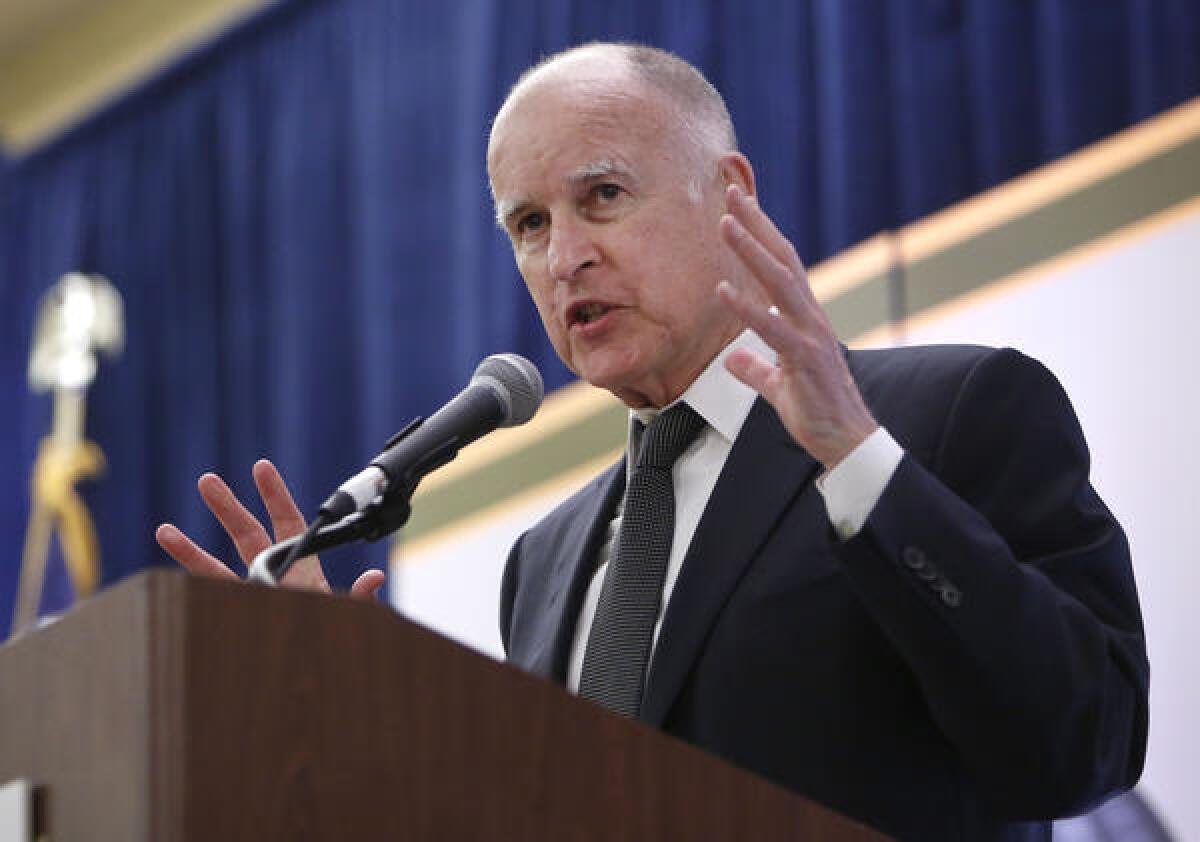
Lawmakers from both sides of the aisle raised concerns Tuesday that Gov. Jerry Brown’s state budget plan relies on a faulty calculation of a spending limit imposed by voters in 1979.
“This is really a big deal,” state Sen. Jim Nielsen (R-Gerber) said during a meeting of the Senate’s budget committee.
At issue is how to interpret a 38-year-old state appropriations limit that, if breached, would require excess revenues to go to schools or be paid to taxpayers as rebates.
An April 28 opinion from the legislative counsel of California, released publicly Tuesday, said that certain appropriations that Brown’s budget looks to exclude from the spending limit “must be included” per the language that voters placed in the California Constitution.
That opinion aligns with a March report by the independent Legislative Analyst’s Office, which criticized Brown’s plan to exclude $22 billion in state spending from counting under what’s known in Sacramento as the Gann limit, named in honor of its author, the late anti-tax activist Paul Gann.
Advisors to Brown told state senators during the budget hearing that they believed the spending limit had been misinterpreted in the past and were simply trying to realign it with the law.
The otherwise arcane issue is of importance because the interpretation by the Legislature’s analysts could force some $1.8 billion in lower spending — which could then trigger unexpected cuts in a variety of programs even as tax revenues are generally outpacing projections.
The committee ultimately went along with Brown’s framework, though the topic may come up again before a final spending plan is ratified next month.
“I have to say I’m concerned,” said state Sen. Richard Roth (D-Riverside) after asking a series of detailed questions about the impact to the state’s finances if the legal spending limit is breached.
Whether lawmakers ultimately agree to Brown’s interpretation may not be the last word on the issue, as the law makes clear that California courts could impose a final interpretation.
- Share via
Examination of ballots cast in race for California Democratic Party leader begins in Sacramento
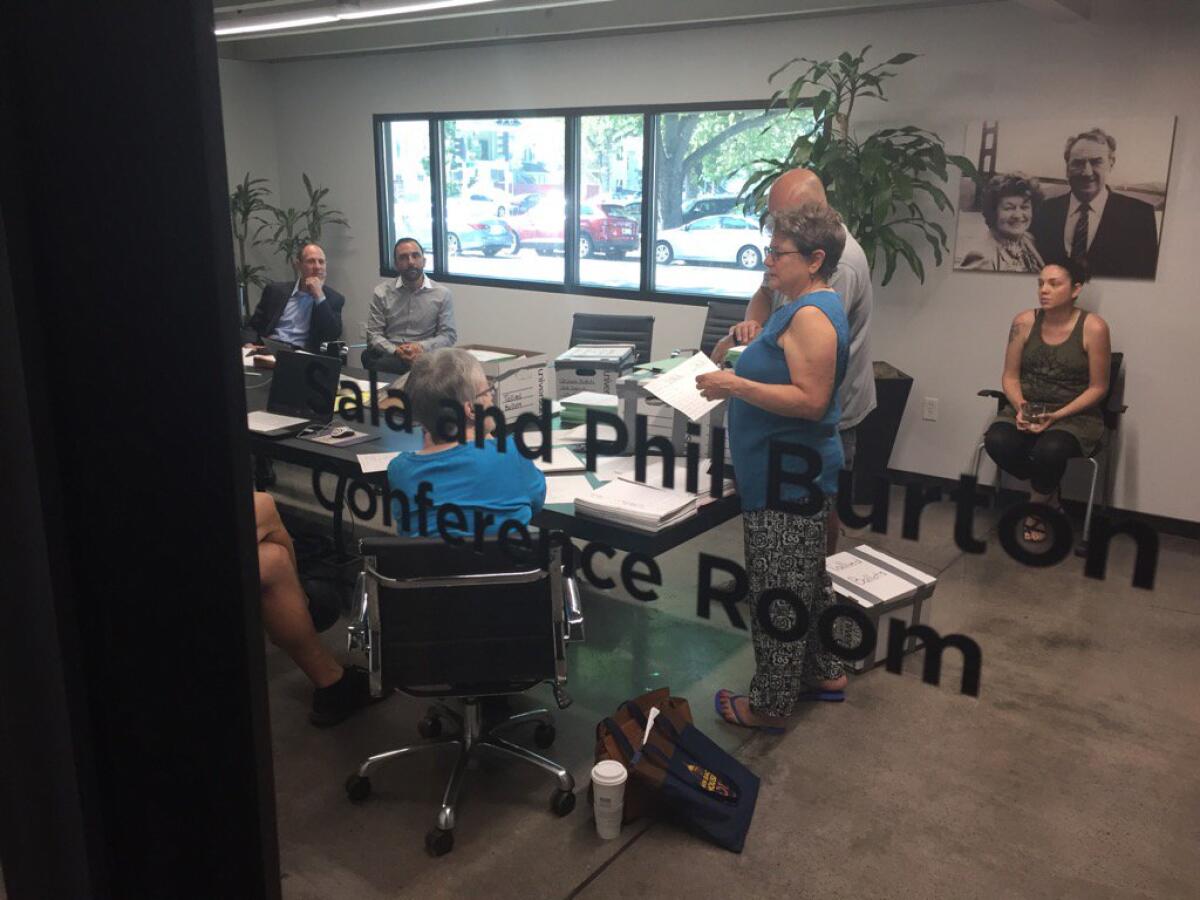
Supporters of Kimberly Ellis, who lost her bid to lead the California Democratic Party by a razor-thin margin last weekend, started sifting through boxes of ballots at the state party headquarters in Sacramento on Tuesday to see if there were any voting irregularities.
Los Angeles County Democratic Party Chairman Eric Bauman was elected Saturday by party delegates to be the new state party chairman, beating Ellis by just more than 60 votes.
After the election, Ellis called for an audit of the ballots. Some of her supporters questioned whether all the votes came from credentialed party delegates.
On Tuesday morning, representatives from the Ellis and Bauman campaigns started reviewing the ballots, delegate credentialing records and other documents from the election. State party staff members also are in the room to monitor the process.
Neither side is allowed to copy or photograph the ballots, or remove any of the material from the room, said state party spokesman Steve Maviglio.
A spokesman for the Ellis campaign said it may take three or four days to examine all the records.
Ellis said Sunday that she will make a final statement after she has reviewed all the election material. She has not conceded.
She was the director of Emerge California, a Bay Area nonprofit organization that trains Democratic women to run for office.
Bauman officially took over as chairperson on Sunday and met on Monday with staff of outgoing chair John Burton to plan the transition.
“Our new California Democratic Party team is dedicated to empowering the grassroots and making our Party even stronger,” Bauman said in a statement released Monday. “That begins with organizational structure, staff and financial decisions to make this goal a reality. We are rolling up our sleeves on day one and getting right to work to ensure a smooth transition after eight years of outstanding service from Chairman Burton and his team.”
- Share via
Gov. Brown on President Trump’s budget proposal: ‘It’s unconscionable and un-American’
This budget proposal is based on utterly bogus economic assumptions. It gives a massive tax break to the wealthiest, while imposing painful and debilitating burdens on tens of millions of decent and hard-working people. It’s unconscionable and un-American.
— Gov. Jerry Brown
- Share via
Conservative group runs ads thanking California GOP for health care vote
A conservative advocacy group will run television ads thanking six California Republicans for voting for the GOP bill to roll back the Affordable Care Act.
All 14 Republicans in California’s congressional delegation voted for the bill, called the Affordable Health Care Act, when it passed the House without Democratic support last month. Democrats have pledged to make it a campaign issue.
Starting today, and running for two weeks, the ads produced by the nonprofit American Action Network target constituents of Reps. Jeff Denham of Turlock, David Valadao of Hanford, Steve Knight of Palmdale, Ed Royce of Fullerton, Darrell Issa of Vista and House Majority Leader Kevin McCarthy of Bakersfield.
All but McCarthy represent districts that voted for Hillary Clinton in 2016 and are targets of the national Democratic Party as it tries to reclaim control of the House in 2018. American Action Network members also run the Congressional Leadership Fund Super PAC, which is focused on preserving Republicans’ majority.
The ad features Elizabeth Jacinto, a mother of four from Issa’s district who lost her health insurance and had to switch doctors under the Affordable Care Act, often called Obamacare. Similar ads are running in 15 other congressional districts across the country as part of a $2-million ad buy.
- Share via
California Assembly Democrats launch progressive caucus
Riding a wave of activism in state politics, nearly two dozen Assembly Democrats have formed a progressive caucus to prop up the party’s left flank in the Legislature.
The formation of the group, which held a private audience with hip-hop star Common during last weekend’s California Democratic Party convention, speaks to the ideological fissures that exist within the Democratic supermajority in the Capitol.
Assemblyman Reggie Jones-Sawyer (D-Los Angeles), who chairs the group, said several members have contemplated a formal caucus for years.
“We all have the same ideology, which is basically that we value people more than money,” Jones-Sawyer said. “We noticed our voting patterns were very, very similar, but we had never met.”
“It’s good for us to know where everyone is, and hopefully we can help each other push a more progressive agenda,” he added.
The caucus hopes to be a counterweight to the informal group of centrist, business-aligned Democrats that has been a pivotal bloc of votes on bills on taxes and environmental regulation.
But unlike the so-called Mod caucus — for moderate Democrats — the progressive group has made its membership public. Twenty-two Assembly Democrats have signed on to the group’s roster.
Jones-Sawyer said taking on mass incarceration, climate change, women’s and civil rights, and immigration issues are among the group’s top priorities.
With a newly energized cadre of progressive activists turning their attention to state politics, Jones-Sawyer said the caucus’ existence would help identify which legislators are allied with that grass-roots movement.
“We’ve done quite a bit of progressive legislation, but some people don’t believe we’re progressive,” Jones-Sawyer said. “In fact, a lot of times people have called us ‘establishment,’ and we’re wondering, ‘Have you seen my voting record?’”
The caucus has not yet decided if it will designate priority legislation or other trappings of traditional caucuses, such as the women’s or Latino caucuses. But the members are planning to band together in one key way to boost their influence: fundraising as a group.
- Share via
Transportation Department releases Caltrain electrification project funding
Transportation Secretary Elaine Chao signed off on the funding agreement for the Caltrain electrification project Monday, and will release $100 million for the San Francisco-area project.
In a recent spending bill, Congress directed the administration to fully fund the Caltrain Peninsula Corridor Electrification Project, but it dragged its feet on releasing the funds, saying the president might not ask for funding to complete the project in future years. Chao’s move Monday also commits the Department of Transportation to prioritizing an additional $408 million in appropriations for the project in the future.
In February, President Trump delayed making a final decision on the project after the 14 Republicans in the California congressional delegation asked him to, a move that frustrated the governor’s office and local leaders.
Democrats in the California delegation pressured Chao to release the money, with Sen. Dianne Feinstein (D-Calif.) pledging to oppose all Transportation Department nominees, and Sen. Kamala Harris (D-Calif.) pushing Chao on the issue during public hearings on Capitol Hill.
“Secretary Chao has done the right thing and committed the federal government to fulfill its obligation to see this project through completion,” Harris said in a statement Monday.
Caltrain CEO Jim Hartnett said in a statement that signing the funding agreement leads the way to starting the electrification project after years of work.
“Over the last few years, more than $1.3 billion was secured from local, regional and state commitments, and contracts were awarded to design, and eventually construct the project. This agreement commits the final funding needed to start construction of a project that will transform and improve the way people travel along one of the region’s most congested corridors,” he said.
Electrification would allow Caltrain to replace its diesel locomotives with electric trains and is a crucial step for the future of the bullet train, which several Republicans in the delegation oppose.
“This is like moving from a Model T to a Tesla. Each is beloved on its own terms, but only one can do the modern job of moving America forward,” Rep. Jackie Speier (D-Hillsborough) said in a statement. “More commuters are going to love faster and more frequent service at Caltrain stations, almost no pollution and quieter rides.”
Rep. Jeff Denham (R-Turlock) is among the California members who oppose the project. He called it a “bait and switch” in a statement Monday.
“Caltrain is not, nor will it ever be, ‘high speed’ and should not be funded with high-speed rail dollars, especially when that project has yet to prove its own financial viability. California’s — and America’s — taxpayers have a right to know where their money is going,” he said.
------------
UPDATES
3:11 p.m.: This article was updated with a statement from Rep. Jeff Denham (R-Turlock).
This article was originally published at 2:30 p.m.
------------
- Share via
Gov. Jerry Brown’s budget chief temporarily steps aside because of health problems
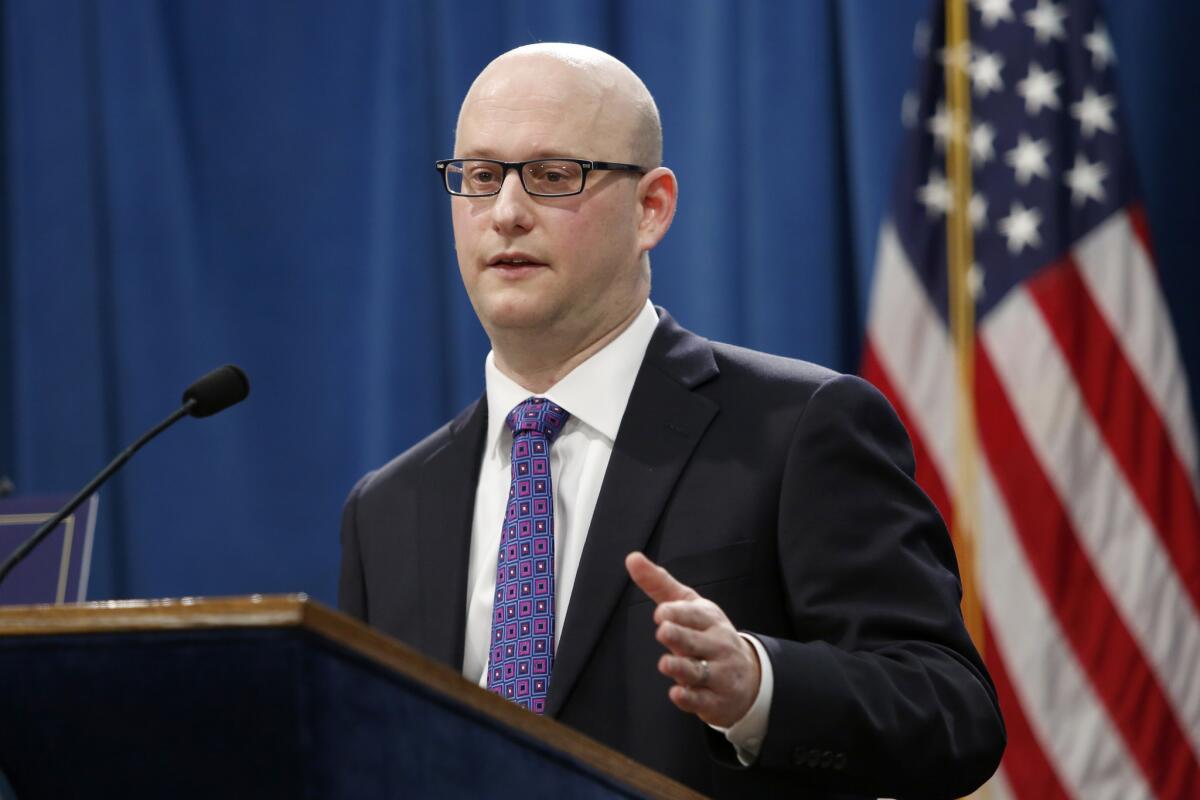
Gov. Jerry Brown’s budget director has left his duties after what was described as a “unexpected hospitalization” less than a month before lawmakers are scheduled to finalize a new state spending plan.
A memo distributed to staff on Monday said that Michael Cohen would be taking “an extended leave of absence following a serious health issue that led to his unexpected hospitalization late last week.”
The governor’s office declined to comment beyond the memo, which did not offer a timeline for Cohen’s return.
Cohen, 44, was appointed director of the California Department of Finance in fall 2013. He had previously served as Brown’s deputy director, and he served for 13 years prior to that with the independent Legislative Analyst’s Office.
“Michael is receiving excellent medical care, his condition is stable and he’s recovering well,” said the memo, signed by Brown’s top advisor, Nancy McFadden, and his cabinet secretary, Keely Bosler.
- Share via
National Democrats name California GOP Reps. Devin Nunes and Duncan Hunter targets in 2018 election
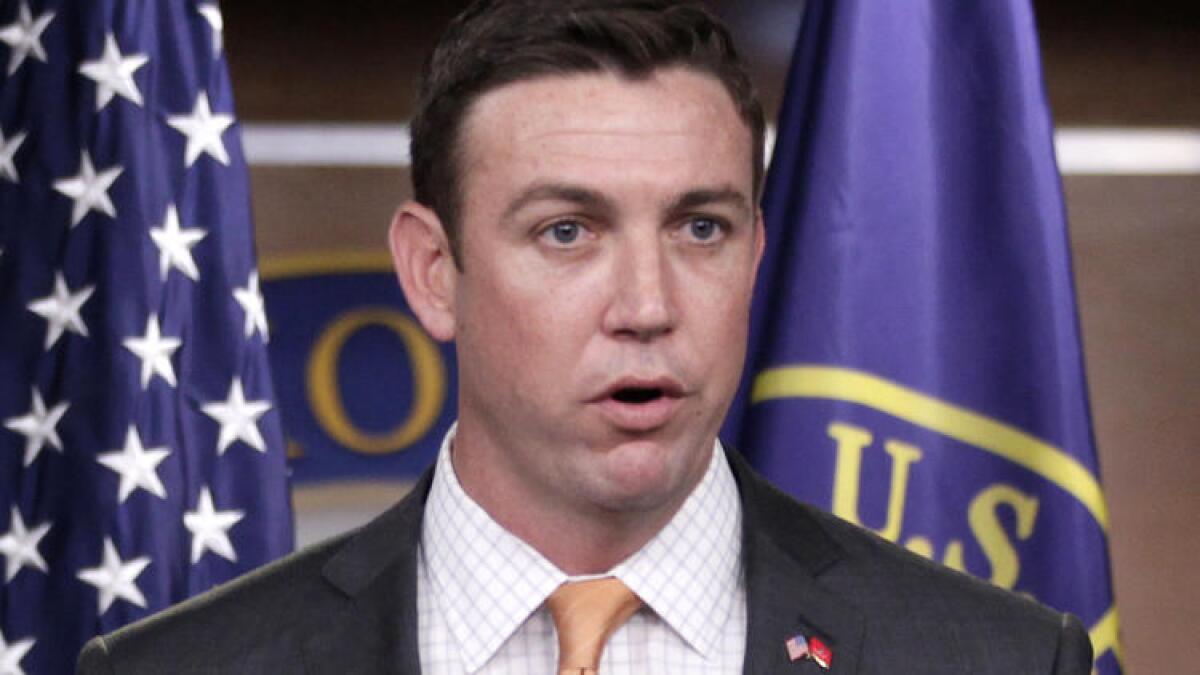
The Democratic Congressional Campaign Committee added congressional districts held by Reps. Devin Nunes (R-Tulare) and Duncan Hunter (R-Alpine) to their list of 2018 targets on Monday.
Both represent traditionally strong Republican districts and have consistently won reelection by large margins, but Hunter and Nunes are facing ethics questions.
Five Democrats have announced challenges to Hunter: Pierre Beauregard, Josh Butner, Ammar Campa-Najjar, Gloria Chadwick and Patrick Malloy. Hunter was elected in 2008 to replace his father in the San Diego-area district and has won reelection with at least 60% of the vote each election since. He beat Malloy in 2016 with 63.5% of the vote.
Hunter has reimbursed more than $60,000 in mistaken, personal or undocumented expenditures to his campaign since the Federal Election Commission and the San Diego Union-Tribune began questioning his expenses a year ago.
Recently the House Ethics Committee announced it would halt an inquiry into Hunter’s spending in deference to a federal criminal investigation.
On Friday, the nonpartisan analytics website Inside Elections changed the ranking of Hunter’s district, noting it would likely stay in Republican hands. Nunes’ district remains rated “solid Republican.”
Just one Democrat has announced a bid against Nunes, Democratic Fresno County Deputy Dist. Atty. Andrew Janz. Nunes has gotten more than two-thirds of the vote in all but one of his eight congressional elections in the Central Valley district. In 2016, he beat Democrat Louie Campos with 68.2% of the vote.
Nunes is chairman of the House Select Intelligence Committee but stepped aside from leading the House investigation into Russian interference in the 2016 election over questions about whether he mishandled classified information.
With the added districts, the party plans to focus time and money on nine of 14, or nearly two-thirds of seats Republicans hold in the California delegation. Nationally, Democrats are targeting 79 Republican-held districts. They need to win 24 seats to regain control of the House.
The seven other Republican-held California districts Democrats have focused on all backed Hillary Clinton for president in 2016. They are:
- CA-10: Jeff Denham (R-Turlock)
- CA-21: David Valadao (R-Hanford)
- CA-25: Steve Knight (R-Palmdale)
- CA-39: Ed Royce (R-Fullerton)
- CA-45: Mimi Walters (R-Irvine)
- CA-48: Dana Rohrabacher (R-Costa Mesa)
- CA-49: Darrell Issa (R-Vista)
Democratic Congressional Campaign Committee spokeswoman Meredith Kelly said in a statement that “House Republicans started the 2018 cycle in a defensive crouch as part of the President’s party in his first midterm. But what has transpired since is much more disturbing and damaging. Through self-inflicted wounds, chaos, ethical issues and a trail of betrayals and broken promises to voters, House Republicans and President Trump have made their long 2018 slog even more difficult.”
National Republican Congressional Committee spokesman Jack Pandol said in a statement that Democrats are overreaching by going after solidly Republican districts.
“Devin Nunes and Duncan Hunter are well-known and respected as trusted fighters for California families. We have no doubt Congressmen Nunes and Hunter will continue to enjoy the confidence of voters who have consistently sent them to fight on their behalf,” he said.
2:25 p.m. This article has been updated with comment from the national political parties.
It was originally published at 12:07 p.m.
- Share via
Single-payer healthcare could cost $400 billion to implement in California

A single-payer healthcare system in California — a galvanizing cause among the state’s progressive flank — would cost $400 billion annually, according to a legislative analysis released on Monday.
The analysis, released in advance of the proposal’s hearing in a key fiscal committee, fills in what has so far been the biggest unanswered question concerning the plan to dramatically overhaul California’s healthcare coverage.
The analysis found that the proposal would require:
- A total cost of $400 billion per year to cover all healthcare and administrative costs.
- Of that, $200 billion of existing federal, state and local funds could be repurposed to go toward the single-payer system.
- The additional $200 billion would need to be raised from new taxes.
The analysis proposes one scenario in which a new payroll tax on employers — with a rate of 15% of earned income — could supply the new revenue. But the measure itself does not contain a specific tax proposal, and therefore would not, at this point, need a two-thirds vote to approve a new tax.
The write-up also notes that a universal healthcare proposal would likely reduce spending by employers and employees statewide, which currently ranges between $100 billion and $150 billion annually. Therefore, the total new spending under the bill would be between $50 billion and $100 billion each year.
Under the bill, the state would cover medical care for every resident in California, including those without legal immigration status. Enrollees would not have to pay premiums, co-payments or deductibles.
The analysis cautions that the single-payer bill, SB 562 by Sens. Ricardo Lara (D-Bell Gardens) and Toni Atkins (D-San Diego), would required “unprecedented changes to a mature healthcare system.”
“Therefore, there is tremendous uncertainty in how such a system would be developed, how the transition to the new system would occur, and how participants in the new system would behave,” it notes.
- Share via
African American Caucus leaders want to know why U.S. Rep. Maxine Waters was cut off during state convention speech

Rep. Maxine Waters was in the middle of a rousing speech at the California Democratic Party state convention when she was interrupted and then had her mic cut off.
The head of the California Democratic Party African American Caucus said Monday he was working with state party officials to determine who was responsible for cutting off the sound to U.S. Rep. Maxine Waters’ microphone as she spoke to the group at the party’s convention on Saturday.
“This is a very unusual situation, and we are collectively trying to figure out a path forward to address what happened and make sure these things do not happen in the future,” Caucus Chairman Darren Parker said.
Waters, a Los Angeles Democrat whose acerbic comments on President Trump have brought her national attention in her 14th term, was in the middle of a rousing speech against Trump on Saturday night when she was approached by a man who appeared to work for the convention center.
“Hey, leave her alone,” audience members shouted as he interrupted to speak to her privately, prompting Parker to show the man away.
“That’s all right, that’s OK — they try to shut me up all the time,” Waters quipped to loud cheers as she continued to speak.
But the sound from her microphone was cut off shortly thereafter, sending the room of about 300 people into confusion. That didn’t stop Waters. As a few voices shouted in anger, she got down from the podium, telling the audience they could still have a conversation.
She finished her speech from the floor, as the crowd chanted “Impeach 45.”
A manager for the Sacramento Convention Center told The Times on Monday that the contractors who pulled the plug on the event were not center employees. Parker said the caucus had initially believed the man to be a convention staff or city employee. But after working with a Sacramento City Council member over the weekend, caucus leaders determined the audio was provided by an outside firm hired by the state Democratic Party.
The audio company has not been identified, he said, and a look into what happened is ongoing. Parker called the incident unusual and disrespectful.
The caucus meeting ran late. When an event has run over its time slot in the past, Parker said, the caucus has been billed for the extra expenses.
“We are working directly with statewide officers to make sure that these outside contractors are properly instructed on how to act and how to treat our guests,” he said.
- Share via
Kimberly Ellis calls for an audit of the election for California Democratic Party leader

Democratic organizer Kimberly Ellis, who lost her bid to lead the California Democratic by a razor-thin margin, on Sunday questioned the validity of the election and called for an audit of the vote.
Los Angeles County Democratic Party chairman Eric Bauman eked out a victory Saturday to be the next state party chairman, beating Ellis by just more than 60 votes, according to the state party.
Close to 3,000 party delegates voted in the election on Saturday at the party’s annual convention in Sacramento
“I will not concede this race until we have validated the results,” Ellis said.
A crowd of a couple hundred Ellis supporters gathered at Cesar Chavez Plaza in downtown Sacramento after the convention ended Sunday afternoon to hear Ellis speak. She climbed up to the stage, forgoing a bullhorn, and thanked everyone for their support.
Ellis said she met with California Democratic Party staff and executives and “shared with them some concerns” with some of the voters that were cast. Ellis supporters are questioning whether all the votes came from credentialed party delegates.
“One of the things that party cannot be is a party that’s just like Trump and the Republicans,” Ellis told the crowd. “A party that operates in closed rooms, smoked-filled rooms, behind curtains, in secrecy and shadow. It is time for this party to be a transparent party.”
Ellis, who lives in Richmond, said she and her advisors plan to stay in Sacramento for the next few days to review each and every ballot cast. They will compare them to them delegate registration forms to see if they match. All ballots and other election documents are being kept at the state party’s Sacramento headquarters.
Ellis said she will make a final statement after she has reviewed all the election material.
“This fight is not over,” she said. “When I say this fight, I mean this movement we have created together. It is growing stronger, and louder and more powerful each and every day.”
Ellis was the director of Emerge California, a Bay Area nonprofit organization that trains Democratic women to run for office.
- Share via
Election of new California Democratic Party leader may face legal challenge
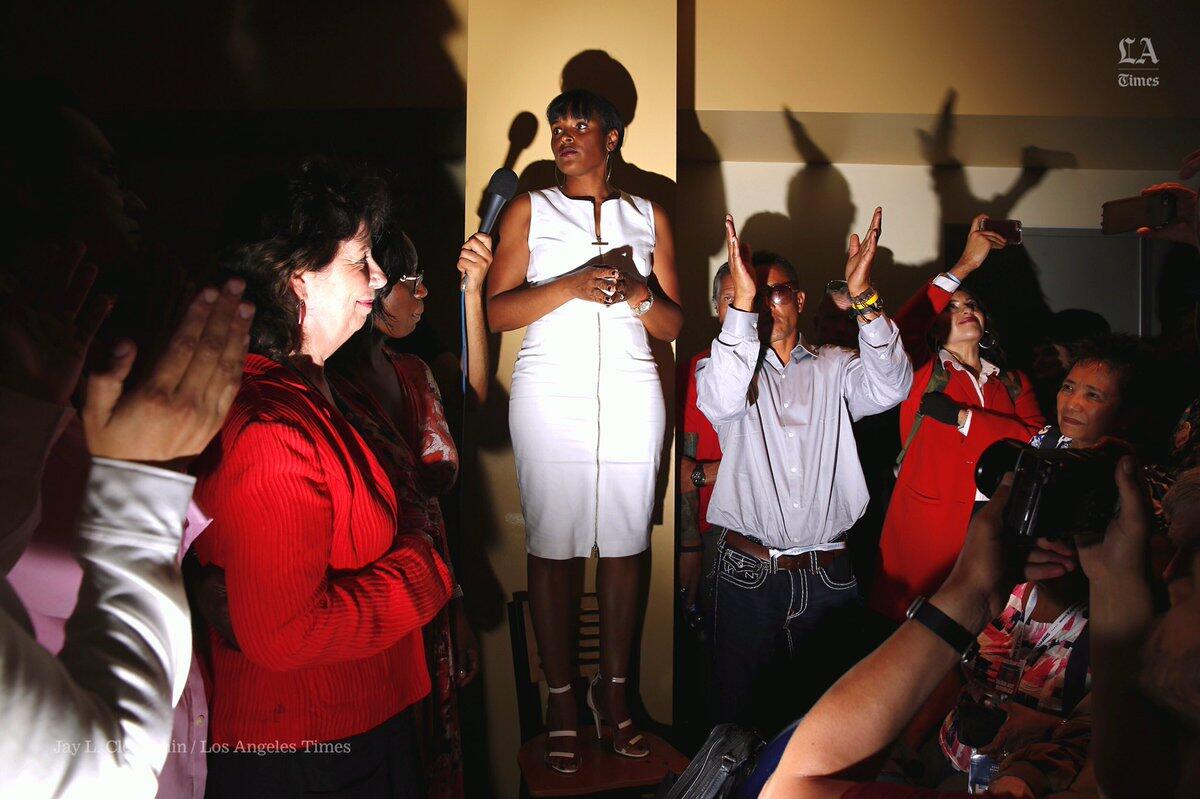
Lawyers are now involved in the California Democratic Party’s election of a new chairperson.
Los Angeles County Democratic Party Chairman Eric Bauman won a razor-thin victory Saturday to be elected the party’s next chairman, beating rival Kimberly Ellis by just more than 60 votes, according to the state party.
Ellis has yet to concede, and a campaign spokesman said they are reviewing their legal options. Some of her supporters are questioning the integrity of the votes cast by nearly 3,000 delegates at the state party’s convention in Sacramento.
“We’re going to have Eric Bauman’s lawyer meet with the Democratic Party lawyer and Kimberly’s lawyer and let them figure it out,” the outgoing party chairman, John Burton, said Sunday morning. “They could be meeting as we speak.”
Burton said some Ellis supporters alleged that delegate ballots may have been counted twice. But no evidence of that has been presented to him, he said.
Some Ellis supporters are demanding a recount, but the party bylaws do not have any provisions for a recount in officer elections, Burton said. On Saturday night, the ballots were counted two separate times.
“I don’t know what the complaint is except that she lost,” Burton said. “I told one of her people to show me some evidence that people were double voting or whatever it was.”
- Share via
Anger, protests erupt over results of the California Democratic Party’s election of a new leader
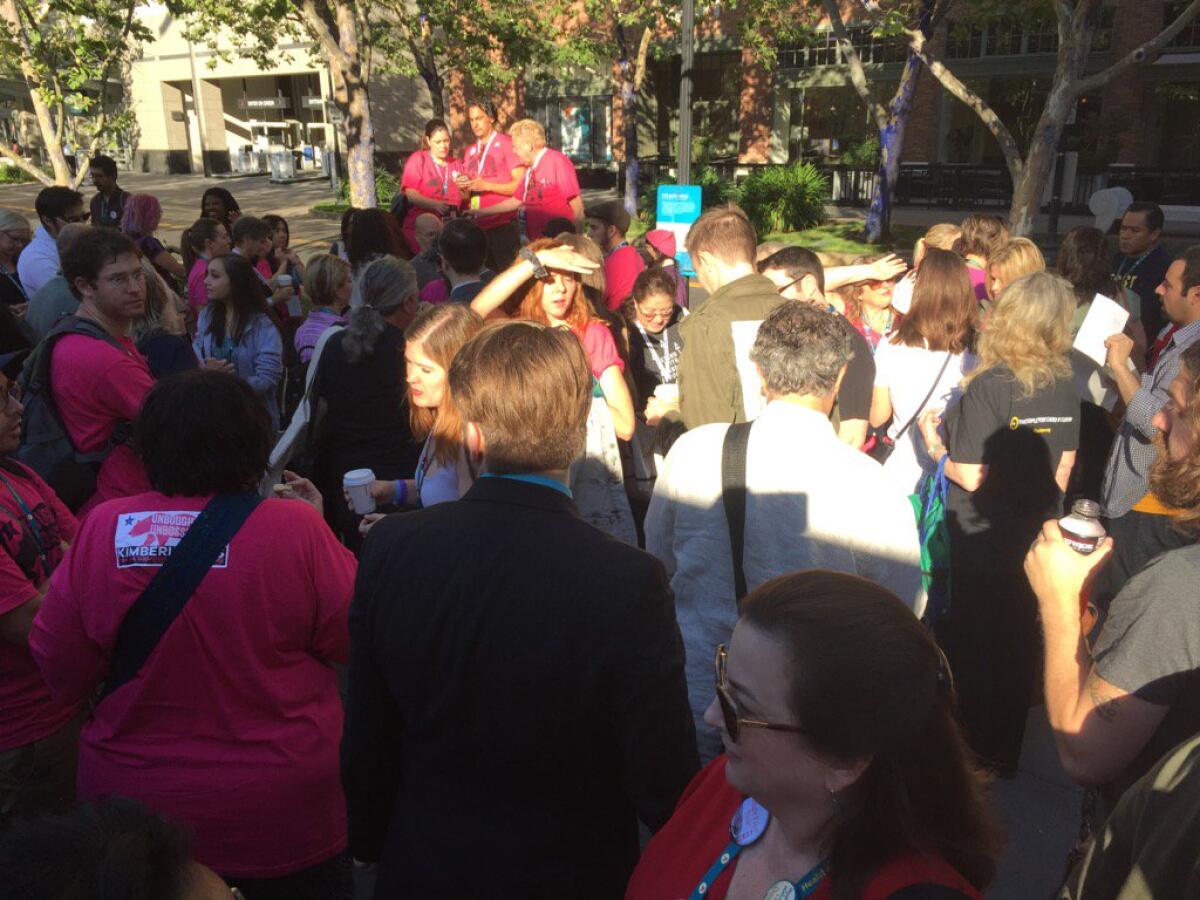
Supporters of the losing candidate in the California Democratic Party’s race for chairperson were out en masse early Sunday morning at the state convention in Sacramento, many calling for an investigation of the party’s voting process.
Longtime Democratic leader Eric Bauman eked out a victory Saturday to be the party’s next chairman, beating rival Kimberly Ellis by just more than 60 votes, according to the state party.
A spokesman for the Ellis campaign on Sunday said they are consulting with legal counsel to determine their options. Ellis has not conceded.
The race, between a party insider and a progressive organizer, was a heated battle between divergent forces that are racking the Democratic Party nationwide. Bauman was a favorite of the party establishment, while Ellis drew the backing of liberals who supported Sen. Bernie Sanders in last year’s presidential primary.
Party delegates are scheduled to meet Sunday morning at the convention, a meeting expected to grow testy.
Ellis supporters were gathering outside the Sacramento Convention Center just after 7 a.m., many expressing outrage about the outcome and demanding a recount.
“We got shafted,” said Alexis Edelstein, founder of Berniecrats of California.
Mani Kang, 41, a Democratic delegate from Orange and another Bernie Sanders supporter, said the result was too similar to the presidential race. Sanders supporters blamed the leadership of the Democratic Party, including former party chair Debbie Wasserman Schultz, of undercutting the Sanders campaign in favor of Hillary Clinton.
Kang said the Democratic Party establishment did the same to Rep. Keith Ellison of Minnesota, a favorite of Bernie supporters who ran for Democratic National Committee chair but lost to former Obama administration Labor Secretary Tom Perez.
“First it happened to Bernie in Philadelphia. Then it happened to Ellison. Now this is the third attempt,” Kang said. “Kimberly had all the momentum in the last few weeks. This is a big deal. We need more transparency in the process.”
A few Ellis supporters complained that Democratic Party officials did not check identification when delegates were voting.
Ellis was the director of Emerge California, a Bay Area nonprofit organization that trains Democratic women to run for office.
- Share via
Rep. Maxine Waters was cut off while speaking at the California Democratic Party convention. Her audience wasn’t happy
- Share via
Eric Bauman named new chairman of the California Democratic Party — but his rival refuses to concede
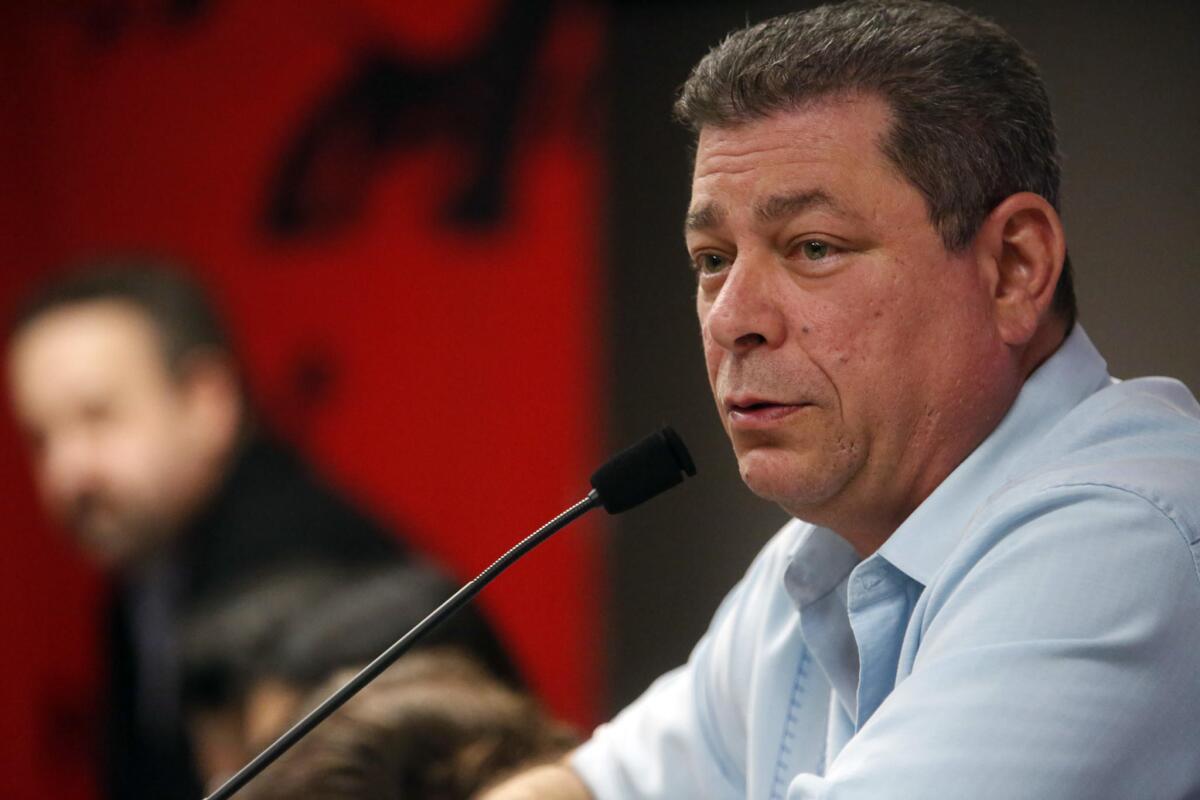
Longtime Democratic leader Eric Bauman won a razor’s-edge victory Saturday to be elected chairman of the California Democratic Party, beating rival Kimberly Ellis by just more than 60 votes, according to the state party.
But Ellis did not concede, saying late Saturday night that she had been in touch with attorneys.
“This race is not done,” she told hundreds of chanting supporters who were calling for a recount in the hallway of the convention center where the state party convention was being held. “We will see you all in the morning.”
Bauman, a long-time party leader, said he was humbled by the win. He reached out to Ellis supporters in his victory message.
“There is no denying that there is a problem when so many of our hardworking activists feel that they are not welcome within our Party and that they have been slighted and shut out of the process,” he said in statement. “We cannot win the vital elections in 2018 and beyond without the energy, commitment and participation of every part of our Democratic family.”
The race, between a party insider and a progressive organizer, was a heated battle between divergent forces that are racking the Democratic Party nationwide. Bauman was a favorite of the party establishment, while Ellis drew the backing of liberals who supported Sen. Bernie Sanders in last year’s presidential primary. She has worked to train Democratic women to run for office.
Earlier in the night, Ellis supporters had gathered in a meeting hall of the convention center as rumors of victory circulated, drawing cheers and hugs and victorious speeches. As it became clear that Ellis had not won, a woman led the crowd in singing, “We shall not be moved.”
RoseAnn DeMoro, the executive director of the California Nurses Assn., which backed Ellis, told the crowd that she doubted a recount would change the outcome.
“It is what it is. I’m sorry to tell you that. But you know what? It has very little to do with what you do out in the field, with what we do as an organization out in the field,” DeMoro said. “So let’s talk about this where do you go from here. You don’t give up. You double down.”
Bauman, who has led the L.A. County party since 2000 and been a state party vice chairman since 2009, was initially expected to cruise to an easy victory in the chairperson’s race. But Ellis was a surprisingly strong rival, her candidacy driven by her dynamism on the stump and by the support of liberal activists who were tired of a party establishment that they believed failed them in the 2016 presidential campaign.
10:31 p.m.: This article has been updated to note that Kimberly Ellis has not conceded the race.
This article was originally published at 9:59 p.m.
- Share via
Rep. Adam Schiff calls for Democratic unity in speech that suggests an ambitious future for himself
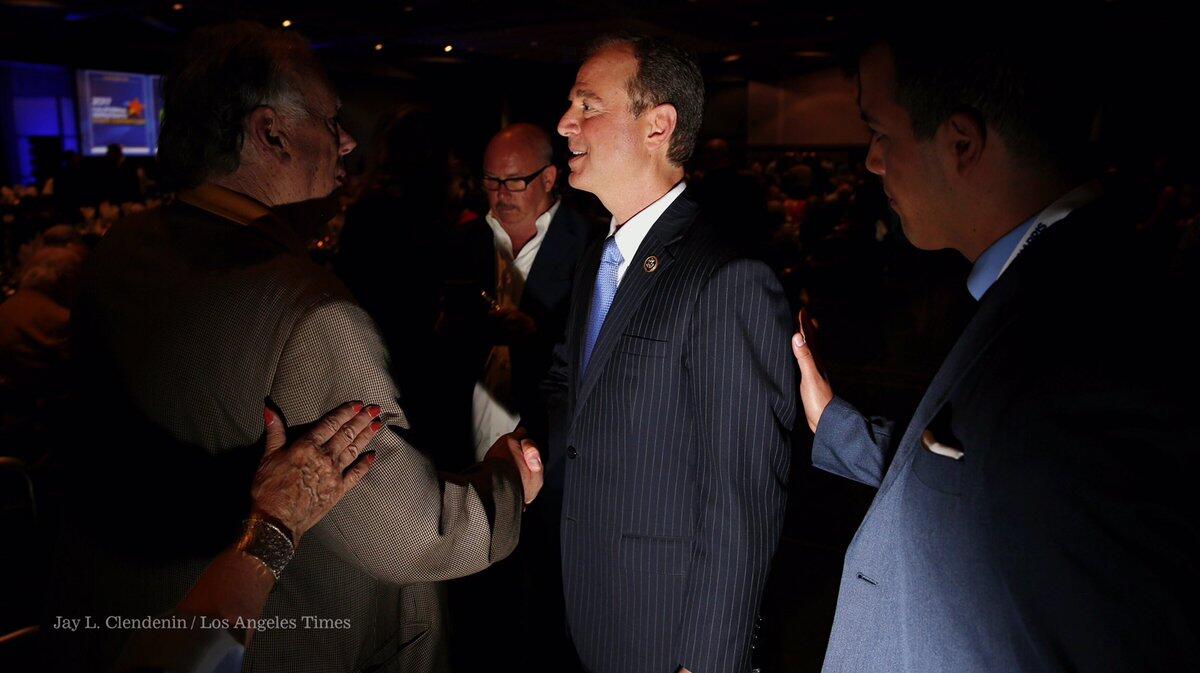
Rep. Adam B. Schiff has been one of President Trump’s most able tormenters in Washington as the ranking Democrat on the House committee looking into the involvement of Russia in the 2016 presidential election.
In the process, the congressman from Burbank has also vaulted himself into the top ranks of California Democrats. On Saturday night he delivered to party members at their state convention a speech that spoke of ambitions for them — and, none too subtly, himself.
Schiff was blistering in his condemnation of Trump, asserting that he’d violated American norms and a sense of decency that had previously defined even the most unsuccessful politicians.
“Over the last 120 days we have come to see what an acute threat to our democracy can come from a president who lacks that central quality and who is instead profoundly indecent,” he said of Trump.
Schiff defended the House investigation and the FBI director recently fired by Trump, an action that ultimately caused the Department of Justice to name a special counsel to examine whether the Trump campaign in any way cooperated with the Russian effort to deny the presidency to Hillary Clinton.
“This is not about re-litigating the election as the president claims; it is not ‘fake news,’” Schiff said.
He alluded to criticism of former FBI Director James B. Comey that Trump was reported to have uttered to Russian diplomats during an Oval Office meeting the day after the firing.
“Jim Comey was many things,” Schiff said, “but he was not a ‘nut job.’”
Beyond his castigation of the president, however, the speech was notable for its ambitious pitch.
Schiff has been high on the list of Democrats considered interested in a run for the U.S. Senate if incumbent Democrat Dianne Feinstein were to announce that she will not seek another term in 2018. (So far, she has said she’s running.)
Schiff’s nationally televised interrogations of Russian investigation figures and his frequent appearances on cable news shows have helped him gain followers in parts of California where he was previously unknown. It has also shot his national image from something close to anonymity to wider prominence, an assist in whatever race he might run in the future.
His options appeared open. Not by accident did he refer to men and women in coal country and steel manufacturing areas and other rural Americans — zones in the country where traditionally Democratic voters went for Trump. (He also lauded Bernie Sanders and Hillary Clinton, the two combatants in last year’s Democratic primaries, and Howard Dean, who in 2004 sparked an earlier Sanders-style infusion of enthusiasm in the party.)
“We love you,” a fan in the crowd shouted as he began to speak Saturday night.
“And I love you too,” he said, a call-and-response heard more often in presidential campaigns.
Schiff detailed several freedoms — a rhetorical flourish that updated President Franklin D. Roosevelt’s “Four Freedoms” — that he said form the American canon. Among them: freedom from want, from fear, of liberty and of faith.
“We are for the liberty to live as we choose as long as we do not hurt others,” he said, to “walk as we will, talk as we will, and yes, within reason, even smoke what we will.”
“Well, at least you can,” the congressman joked.
At a convention that has been riven by sniping between liberal and even-more-liberal Democrats, Schiff took no side on some of the dicier issues.
He said he backed “universal” healthcare, for instance, but did not offer an opinion on a state Senate measure proposing Medicare-style healthcare for all in California. That measure has been a hot-button issue throughout the weekend convention.
Instead, he called for Democratic unity, regardless of differing views on some issues.
“We cannot afford division when the fate of the republic is at stake,” he said. “Our people are stronger united, our party is stronger together.”
- Share via
Activists intent on flushing oil money out of Democrats’ campaigns stage a rally outside governor’s mansion
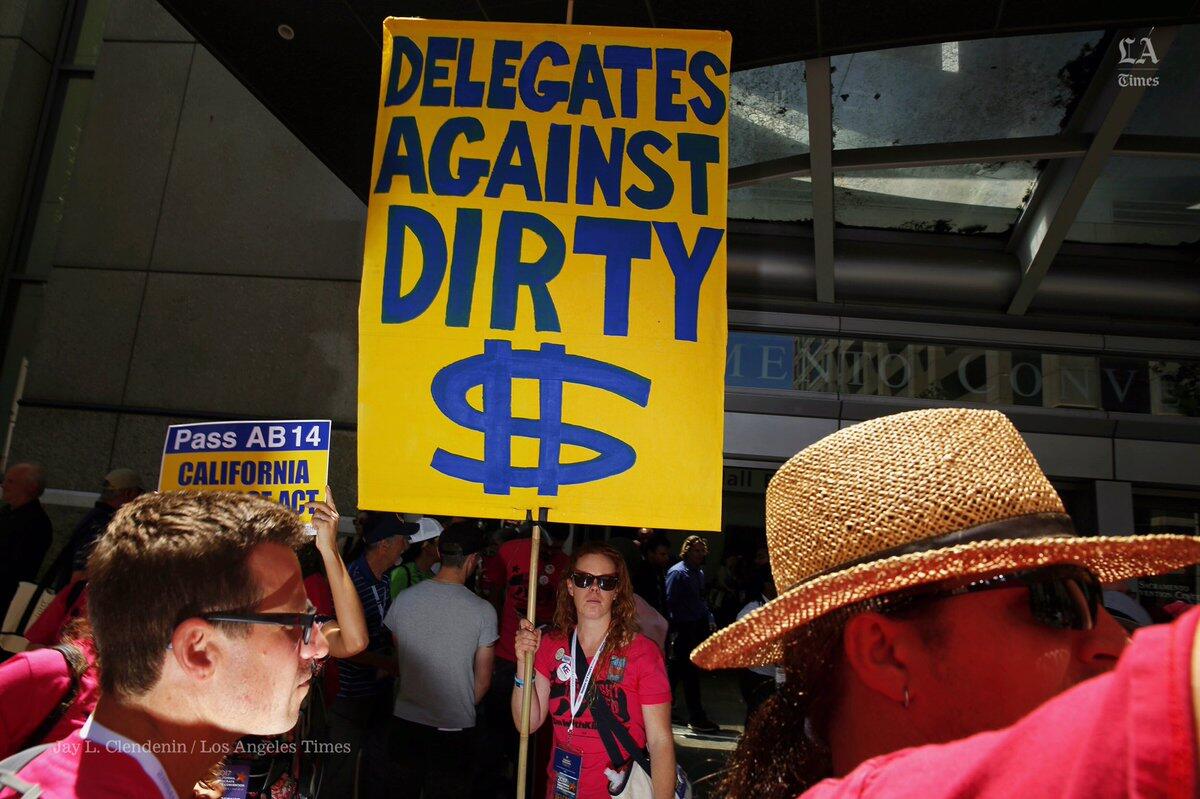
A few dozen protesters, many of them state Democratic Party delegates, marched to Gov. Jerry Brown’s downtown Sacramento mansion Saturday to demand that politicians stop taking campaign money from oil companies.
The protest, called the Delegates Against Dirty Money march, came on the second day of the California Democratic Party convention. Many of the progressives who have led protests, chants and demonstrations at the event are newcomers to the internal politics of the party.
This weekend some state party delegates are trying to pass a resolution that would “publicly condemn corporations and lobbyists that finance political campaigns” and pressure candidates and officials to sign a pledge that they won’t take contributions of more than $200 from oil companies.
“Just because you are a Democrat is not good enough for me,” one protester said into a bullhorn, as others held signs that read “Oil Money Out.” “Those big Democrats in there that are putting money first, they’re fighting against us...and we’re going to hold them accountable.”
Protest leaders criticized Brown for taking nearly $10 million in campaign contributions from oil companies in the last several years, a point that was publicized in a report by a consumer group last year.
“This is the guy that was the Bernie Sanders of the ‘90s,” said activist David Braun, referring to Brown’s run for president against Bill Clinton, when he vowed not to take contributions of more than $100. “That guy’s long gone, but we need him back. Jerry Brown, we need you!”
Brown was not home, spending the weekend instead at a family reunion on his Northern California ranch.
- Share via
Los Angeles Mayor Eric Garcetti vows to fight President Trump’s policies: ‘The California bear don’t scare’
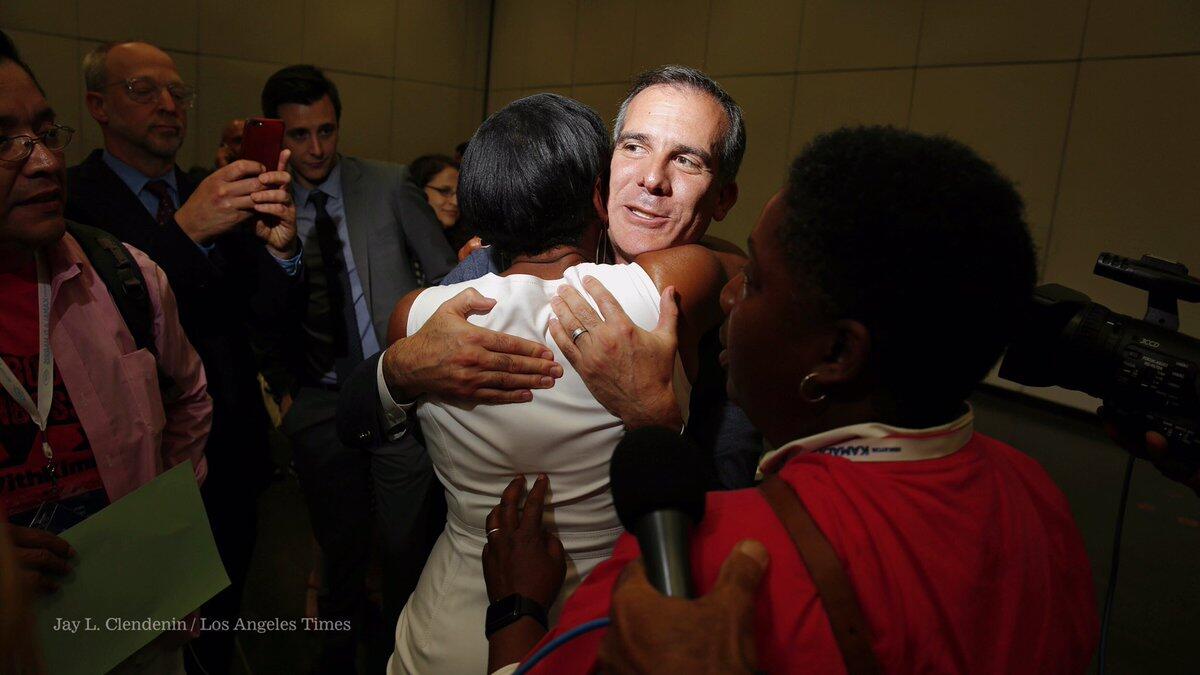
Los Angeles Mayor Eric Garcetti was the final scheduled speaker Saturday at the California Democratic Party convention after more than two dozen others addressed a marathon session. The crowd awaiting Garcetti, mayor of the nation’s second largest city, was thin — shortly before he took the stage, delegates rushed the exits as voting opened in the hotly contested chairperson’s race.
Still, he was good-natured as he stepped up and surveyed the largely empty convention center hall, saying that he was reminded of a quote by Winston Churchill.
“Everything that needs to be said has been said, but it hasn’t been said by everybody,” Garcetti said. “So here I am.”
Since being handily reelected mayor in March, rumors have been swirling about Garcetti possibly launching a gubernatorial bid. He did not mention his political future during his remarks on Saturday. Two days earlier he sidestepped questions about a possible run for governor — or any other higher political office — but didn’t totally dismiss the idea.
Like many of the speakers who came before him at the state party convention, Garcetti railed against President Trump and vowed to fight his policies including healthcare, immigration, the environment and education that he said ran counter to California’s values.
“The California bear don’t scare,” Garcetti said. “You can’t take away our optimism, you can’t take away our rights. You won’t take away our progress.”
Garcetti touted progress made in Los Angeles, such as working to end the city utility’s reliance on coal, and passing a $120-billion county infrastructure measure. And he said both the city and the state could continue to fight Trump’s efforts to override their policies.
“We will take to the streets and we will win. We will take to the courts and we will win. And we will continue moving an American agenda forward,” Garcetti said.
- Share via
Delaine Eastin says she has the ‘brass backbone’ required to govern California
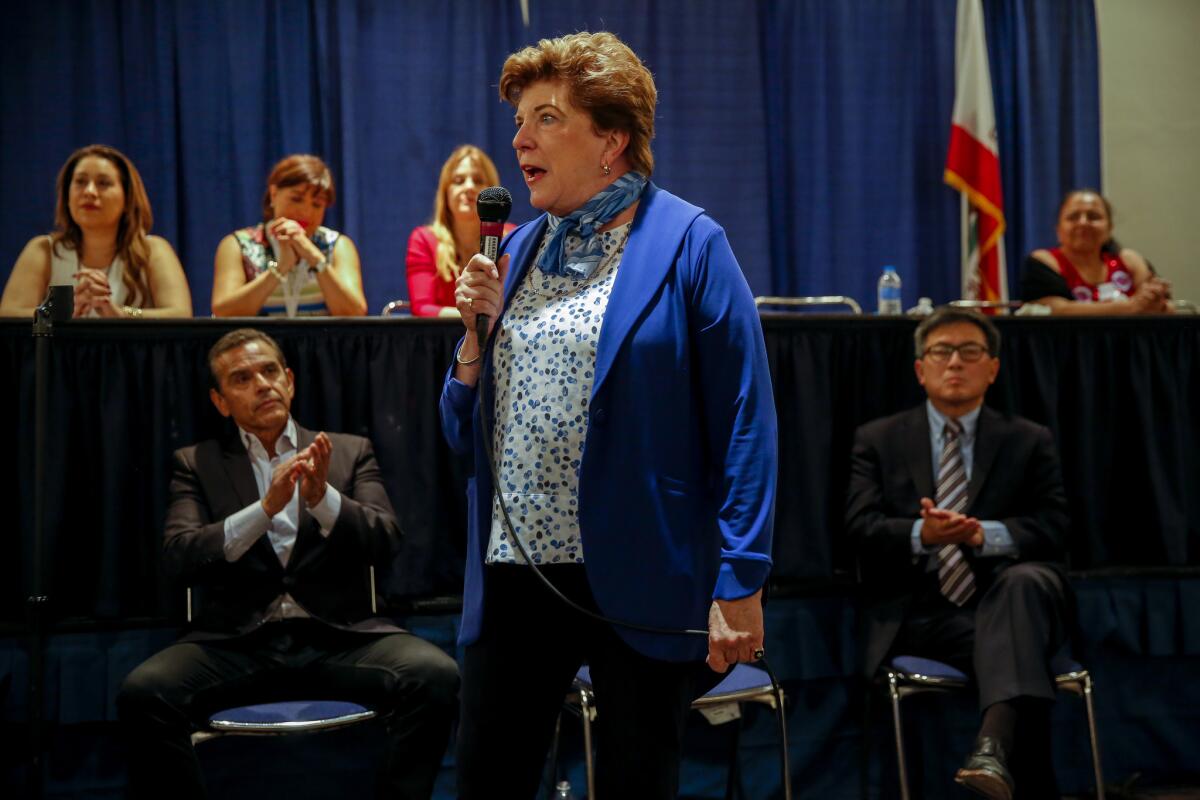
Former state schools chief Delaine Eastin said Saturday that her gubernatorial bid is founded on righting California’s priorities so that the economy serves all the state’s residents, regardless of class.
“California needs a governor with a brass backbone, and that is why I am running, because I know a budget is a statement of values, and I want ours to reflect the priorities of the people I see here today,” Eastin told delegates at the California Democratic Party’s annual convention.
Eastin, who also served in the state Legislature but has not held elected office for 14 years, outlined her agenda, which includes making college tuition free, enacting universal healthcare, banning fracking and increasing housing affordability.
But she also warned about a broader concern – the state of the nation’s democracy.
“Thank you for lending your voice and your time to fight the thug in the White House and stand up for Democratic values,” Eastin said. “I don’t have to tell you our democracy is in trouble. This isn’t just Trump threatening us. It is a lack of participation in our civil society and a lack of faith in government.”
Eastin said the key to holding the democracy together was for people such as the convention attendees to band together.
- Share via
Villaraigosa tells Democrats to focus less on people who drive Teslas and more on Californians who ride the bus
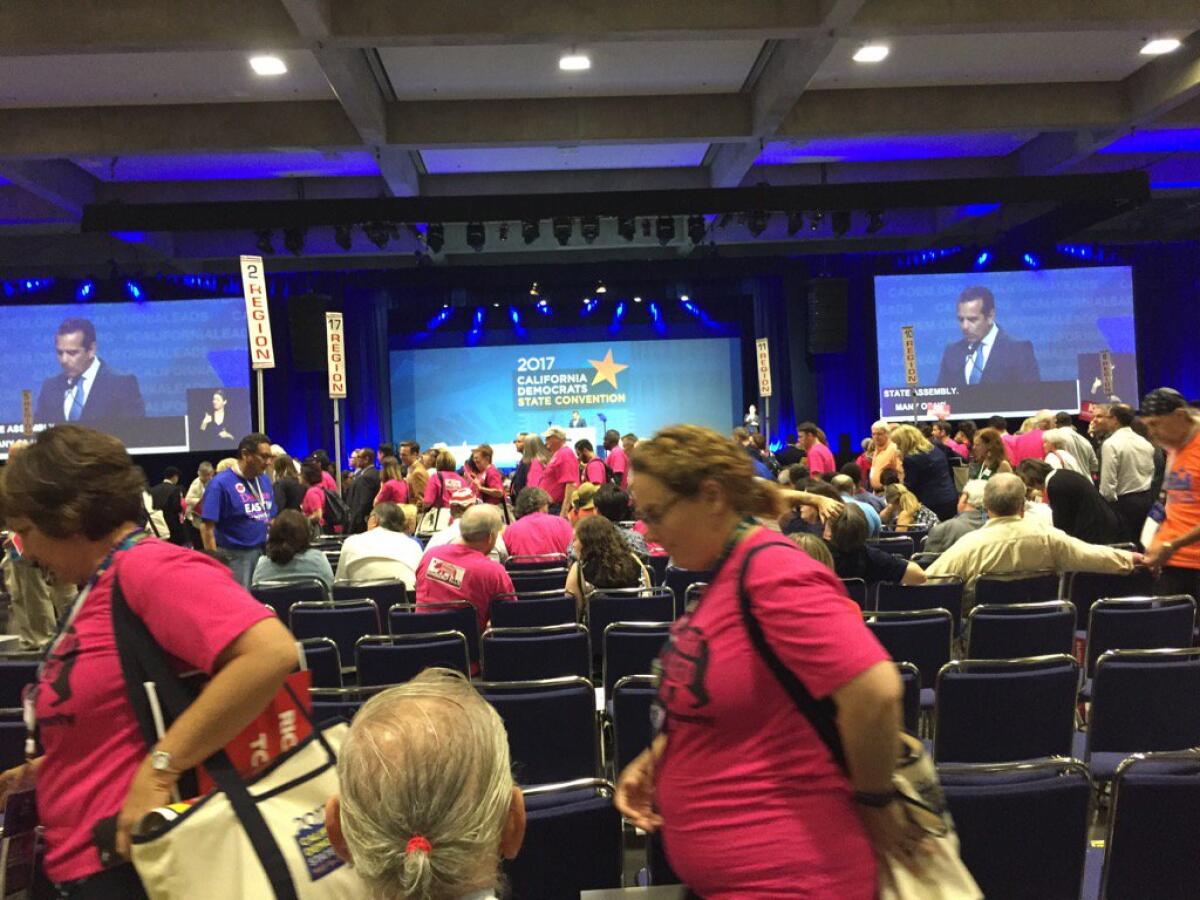
Former Los Angeles Mayor Antonio Villaraigosa told California Democrats at their convention Saturday that too many people in the state have been left behind in the economic recovery, saying the party needs to “look in the mirror” and bring a renewed effort to creating jobs and improving public schools.
Villaraigosa, a 2018 candidate for governor, called on California to lead the resistance against President Trump and the Republican Congress, saying the nation was looking to the state to lead the way to protect immigrants, religious freedoms and civil rights.
“We’re here today to fight for the soul of our party and our most cherished values,” Villaraigosa told party delegates gathered inside the cavernous Sacramento Convention Center. “Standing up to Trump takes more than talk and tweets. It takes action.”
Villaraigosa, who launched his campaign in November, hewed toward the central themes of his campaign, economic opportunity and education, saying both are pivotal if California hopes to help those parts of the state still in financial despair.
He also chided party members, saying it needed to focus less on people who drive Teslas and more on Californians who take the bus.
Villaraigosa had the misfortune of speaking just after candidates in the hotly contested race for state party chairperson delivered their speeches. Hundreds of delegates started heading for the exits during Villaraigosa’s speech, creating a clamor that made it difficult to hear.
“My time is up,” he said at the end of his remarks, “but I ask you to support a candidate who has been in the trenches his whole life, fighting for working people.”
- Share via
Ahead of showdown over who will lead California Democrats, ‘Berniecrats’ have a message: ‘We don’t have to behave’
Voting will soon be underway in the contentious race to decide who will be the next chair of the California Democratic Party.
The race, between progressive-backed Kimberly Ellis and Los Angeles County Democratic Party Chairman Eric Bauman, who is seen as the establishment-backed candidate, is being framed as an old-school-versus-new-school battle.
Voting is scheduled to begin at 4 p.m. Saturday.
Many of the “Berniecrats” convened at a dinner Friday night that served as a reunion of sorts for Bernie Sanders delegates who’d met at last year’s Democratic National Convention.
“Tomorrow, when we’re in that hall ... they’re going to be telling you how bad Trump is and how we should all be OK with them because Trump’s so bad,” said RoseAnn DeMoro, executive director of the California Nurses Assn./National Nurses United, and a prominent Sanders backer. “Tomorrow, you guys are going to want to boo. There’s a lot of good people to boo.”
Nina Turner, a former state senator from Ohio who has frequently warmed up crowds at Sanders rallies, said, “The way we show the corporate [Democrats] that we are not playing games with them, starting right here in California, is to make sure that we get Kimberly Ellis elected as chair!”
Turner went on to skewer Democrats for remaining hyper-focused on the controversy surrounding the investigation into White House ties with Russia and not on issues such as criminal justice reform and income inequality.
Adding that she believed that there is no longer any difference between the nation’s two major parties, Turner urged delegates to turn out to protest and vote in the party’s elections.
“You can’t be absent. We’ve all got to be in pocket tomorrow,” Turner said. “They’re going to get the memo tomorrow.”
- Share via
Lt. Gov. Gavin Newsom: ‘Usually I’m scooping Jerry Brown’s ice cream’
Gubernatorial candidate Gavin Newsom mused about his duties as lieutenant governor as he courted Democratic delegates by scooping ice cream for them on a blazing hot Saturday.
“People ask what does a lieutenant governor do. What do they do? This is it,” he said in an exchange with a man in the crowd surrounding his ice cream tent outside the California Democratic Party convention. “See, know your job. Usually I’m scooping Jerry Brown’s ice cream.”
After delivering a lengthy speech painting California as the resistance to Trump, Newsom wooed delegates, took selfies and donned a plastic red nose to raise awareness about childhood poverty.
As he passed out ice creamm, Newsom was approached by Harmesh Kumar, a Democrat who has also filed to run for governor.
“Let’s have our first debate,” Newsom said to Kumar. “Rocky road or chocolate chip, which one? This is big moment. People want to know, they have a right to know.”
Newsom handed Kumar an ice cream cone before adding, “This is called sucking up to your opposition.”
- Share via
Single-payer healthcare backers disrupt California Assembly Speaker Anthony Rendon’s convention speech
Assembly Speaker Anthony Rendon (D-Paramount) introduced himself to convention-goers as a “slacker turned professor” now representing a southeast Los Angeles district in need of “environmental justice... social justice... economic justice” from progressive Democrats.
But his address was soon drowned out by chanters calling for single-payer healthcare, an emerging litmus test for the left that has inspired a number of outbursts at the Democratic gathering this weekend.
As single-payer cries grew, Democratic Party Chair John Burton interrupted to chastise the chanters with an expletive-laced plea to show respect.
With exasperation, he derided the interrupters for acting “like single-payer is controversial among Democrats.”
In fact, although most Democratic legislators like to express their support for the concept of single-payer healthcare, many, including Rendon, have expressed concern about how such an overhaul would be financed.
- Share via
Senate leader Kevin de Léon, as promised, stays mum on his 2018 plans
After a week of heightened speculation about his future plans, California Senate President pro Tem Kevin de Léon offered no hints on a potential run for governor during his Saturday afternoon convention speech, instead returning to familiar themes of jabbing at President Trump and touting California’s economy.
Still, the slick campaign-style video preceding his speech and “Run Kevin Run” signs distributed in the hall ensured that the 2018 guessing game is not going away any time soon.
De Léon laced into Trump, his perpetual foil, throughout the speech.
“In our state, we celebrate diversity. We don’t deport it,” de Léon said “We don’t ban it. And we sure as hell don’t wall it off.”
Portraying California as the counterweight to GOP-led Washington, de Léon boasted, “Our Democratic-led Senate and Assembly have earned their highest approval ratings in three decades, while Republicans in Congress follow Trump over a cliff. They have lower ratings than the taco bowls at Trump Tower.”
- Share via
Sen. Kevin de Léon swipes at Trump’s infamous Cinco de Mayo ‘taco bowl’ tweet
- Share via
California’s top elections officer calls Trump voter fraud allegations a ‘smokescreen’ to distract from Russia charges
California’s secretary of state told delegates to the state Democratic Party’s convention that President Trump’s allegations of voter fraud last year are an effort to divert attention away from questions about his own presidential campaign.
“It’s been a smokescreen to distract from the investigation into Trump’s ties to Russia,” said Secretary of State Alex Padilla in his convention speech Saturday.
Padilla has been a persistent critic of Trump’s assertion, first made last November, that he lost the popular vote because millions of illegal votes were cast in the presidential race. And the president singled out California and two other states, even though no evidence exists of widespread illegal voting.
“The only mass fraud against the people of the United States of America are the lies being perpetrated by the president of the United States of America,” Padilla said.
The state’s chief elections officer urged Democrats to focus on voting rights as a key issue in 2018. And he pointed to a handful of new California laws — including expanded automated voter registration at the DMV and a sweeping law that will replace polling places with more absentee voting — as steps in the right direction.
“Make defense of voting rights essential to who we are as a party,” he urged delegates. “Voter participation is the oxygen to our democracy.”
- Share via
Lt. Gov. Gavin Newsom calls on California Democrats to be the ‘resistance’ to Trump
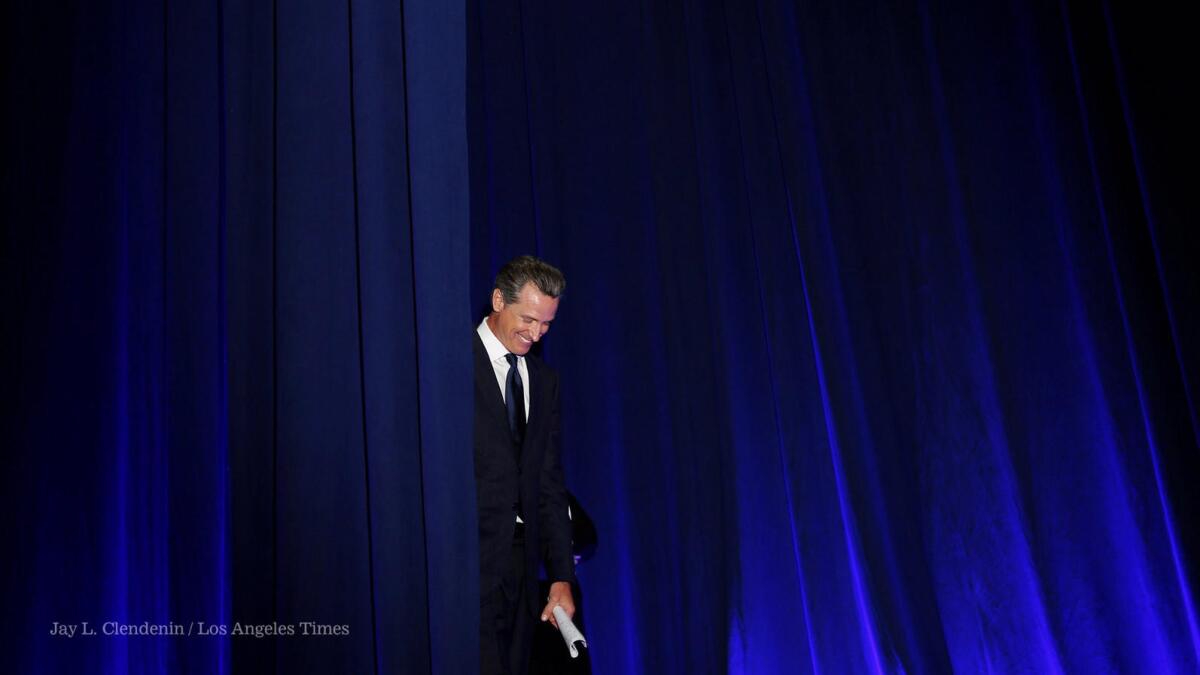
Lt. Gov. Gavin Newsom told California Democrats on Saturday that they must be the resistance to President Trump and offer an alternative vision for the rest of the world.
“We are all Californians. Wear it with pride. This is our moment,” the gubernatorial candidate said to thousands of delegates and activists gathered at the state party’s annual convention in Sacramento. “California Democrats: Let’s show the world that Donald Trump is the last vestige of a darker, obsolete past and offer a bold, new vision for a progressive and prosperous future.”
Newsom laid out an agenda that he said he would adopt if elected governor next year. He said ending childhood poverty in the state would be his “north star.” He also called for the expansion of early-childhood education, creating full-service community schools, making community college free for all of the state’s students, creating 500,000 apprenticeships by 2027, implementing universal healthcare and reforming the state’s justice system, including repealing the death penalty.
He said Trump’s policies were at odds with California on issues such as immigration, the environment, healthcare and the treatment of the LGBTQ community.
“It’s time to reject timidity, set ambitious sights and take real chances,” he said, pointing to his fight with President George W. Bush’s administration when he issued same-sex marriage licenses when he was mayor of San Francisco.
The move was controversial even among some Democrats at the time, but it is among the reasons Newsom is popular with party activists today.
“I believed then, as I do now, that it’s never the wrong time to do the right thing, and it’s always better to change the polls than to chase them,” Newsom said.
- Share via
State Treasurer John Chiang says California will take ‘a different road’ than the Trump administration
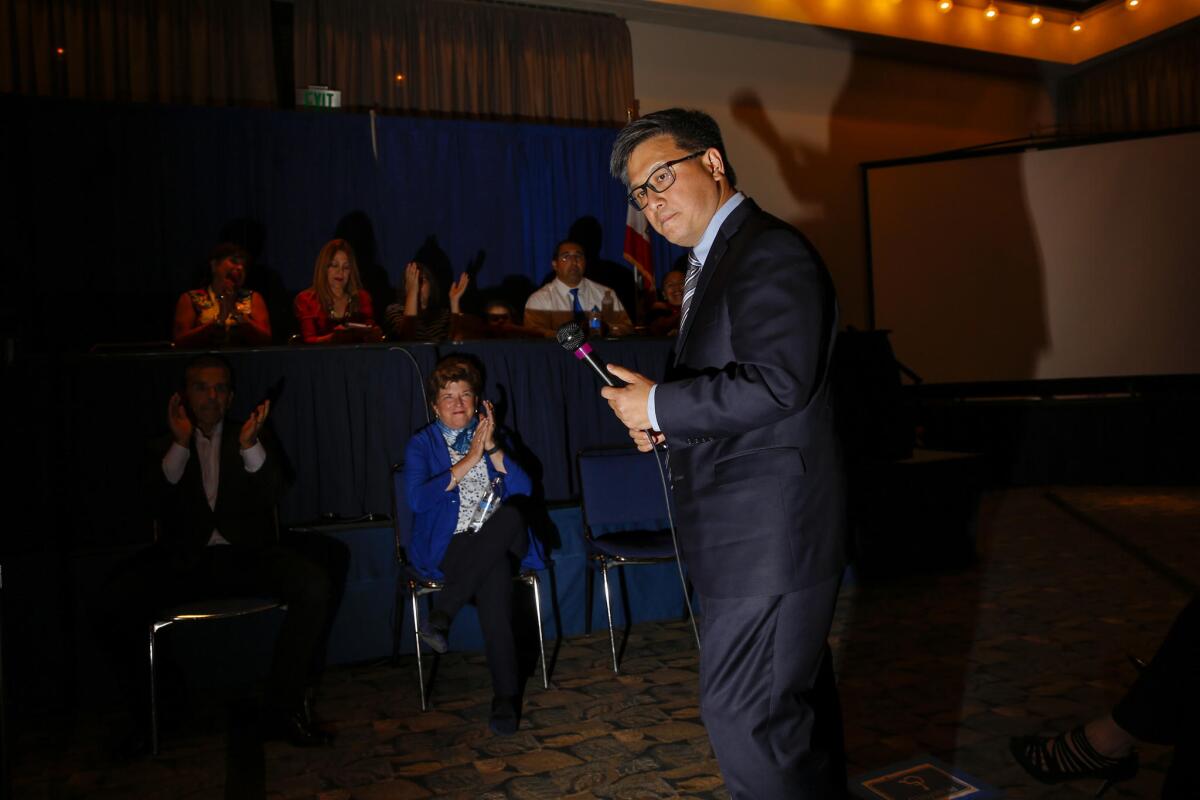
State Treasurer John Chiang told California Democrats on Saturday that the state is charting its own course, different from the one taken by President Trump and Republicans in Washington.
“Together we will propose a different road for California,” Chiang said to applause from the delegates attending the California Democratic Party convention.
Chiang, who announced his candidacy for governor last spring, said the state must take an active role in opposing Trump on a range of issues, including immigration crackdowns and a rollback of existing climate change policies.
“Every hour since Donald Trump took office, I find myself saying ‘Not on our watch,’ ” Chiang said.
The 54-year-old Democrat from Los Angeles served eight years as the state’s controller before being elected treasurer in 2014. He reminded the convention crowd of his fights with former Gov. Arnold Schwarzenegger during the state’s economic crisis, including a 2008 showdown over whether Chiang should issue paychecks to hundreds of thousands of state workers.
“I know the ins and outs of how to run this state responsibly,” he said. “I have a track record of getting the job done.”
- Share via
California Democrats say farewell to party leader John Burton. To no one’s surprise, he responded with profanity
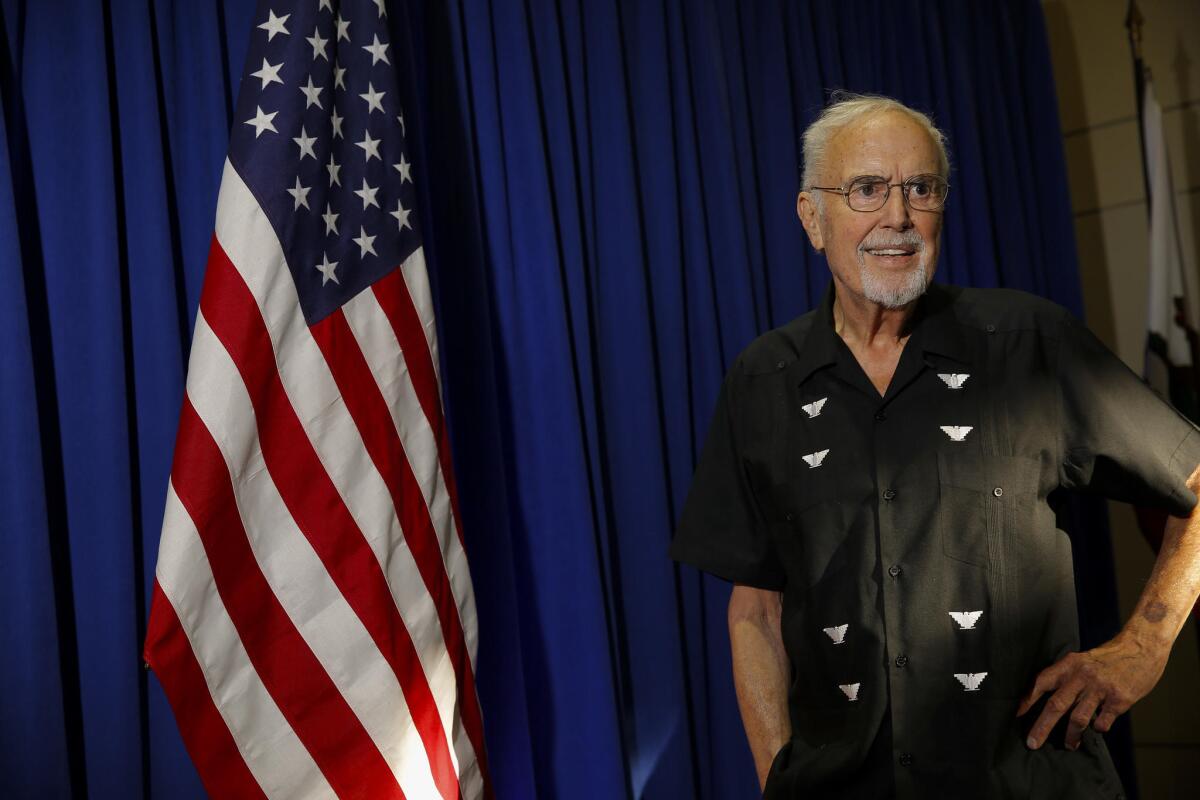
California Democrats said farewell to chairman John Burton on Saturday, and John Burton said farewell to Democrats, in his usual fashion.
Most of it cannot be printed.
Burton, a fixture in state Democratic politics for half a century even before he took the party’s top position eight years ago, offered up an expletive-speckled thank you to party members that was characteristic of his tenure. After a crowd of Democrats, one after another, lauded him in speeches and a video shown to delegates in Sacramento’s convention center, Burton came to the microphone.
“Holy ... ,” he said.
It has been a rocky convention for Burton so far. On Friday night, his welcoming remarks to delegates were interrupted by shouts and chants from protesters demanding that party members back a state measure that would provide healthcare for all. (Not surprisingly, Burton, 84, gave back with vigor.)
Burton opened the general session Saturday with what seemed to be an effort to tamp down dissent, leading delegates in a chant supporting universal healthcare. He said he hoped that would forestall protests against others this weekend.
Many of those who jeered Burton were born well after he helped drive protests against the Vietnam War and for farm workers in the Central Valley, and spent decades seeking aid for the homeless and other needy Californians. The farewell that came shortly after the session’s opening provided something of a reminder of Burton’s legacy and his inimitable, if profane, style. It was a word even friends used to describe him in their remarks.
“He should walk around with a T-shirt with a warning label on it,” Lt. Gov. Gavin Newsom said in the video, which featured nearly every prominent California Democrat for the last several decades.
But they also spoke of his years of work on behalf of liberal policies. Onstage with Burton on Saturday were officeholders he’s plucked from anonymity and helped propel into office, and politicians who had benefited from his protection in the 35 years he served in the House, state Assembly and state Senate.
Former state Sen. Martha Escutia broke into tears as Burton stood behind her.
“John was the safety net I never had growing up,” she said, then broke into a song of affection in Spanish.
Burton, never at a loss for words, seemed to have almost reached that point when it was his turn.
“I’m the man who made Martha Escutia cry,” he said with visible surprise. “She’s one of the toughest people I’ve ever known in my life.”
Burton seemed near tears himself as he recounted walking as a child in his native San Francisco with his father, who doled out whatever money he had to the poor.
When young John asked why, Burton recalled, “He put his finger in my face and told me he never every wanted me to walk past some guy in bad circumstances without leaving something in the cup.
“That’s what Democrats do. …There’s a lot of people out there that if we don’t fight for them, nobody’s going to fight for them because they don’t have any power,” he said.
Burton regained his typically cantankerous posture when he closed his farewell by addressing President Trump — bluntly, directly and defiantly.
“Now, all together,” he told the delegates, preparing to hurl an F-bomb. “[Expletive] Donald Trump.”
He raised both middle fingers toward the crowd.
For a moment, protests were forgotten, and the audience roared.
- Share via
Sen. Kamala Harris on Republicans who voted to repeal Obamacare: ‘You need to lose your job’
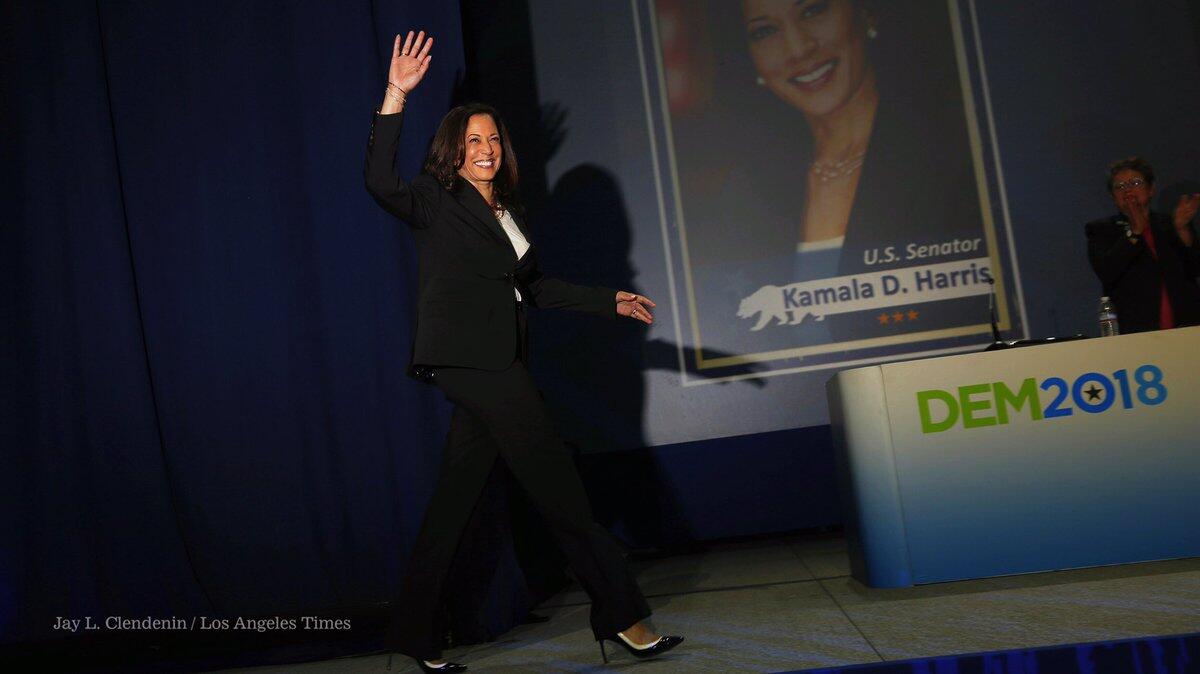
California’s junior U.S. senator told California Democrats on Saturday that they should focus on defeating Republicans in the state’s congressional delegation who voted to repeal the Affordable Care Act.
“Let’s go to San Diego and Orange County and the Central Valley,” said Sen. Kamala Harris of the districts represented by some of those Republicans. “If you vote for people to lose their healthcare, then you need to lose your job.”
Harris’ speech to the California Democratic Party convention was a broadside critique of most of the agenda promoted by Republican leaders in Congress and President Trump. She called the president’s Cabinet a “billionaire boys’ club” and said he had put a “target on California’s back” on issues ranging from immigration to the environment.
But she encouraged rank-and-file Democrats to use their relative strength in California politics to defeat Republican House members who represent some of the state’s swing districts. Seven Republicans represent congressional districts where Democrat Hillary Clinton beat Trump on election day last November.
“We win when we fight for the value that healthcare is a fundamental human right,” Harris said. “Let’s hold these Republicans accountable in their districts.”
- Share via
Pelosi tells Democrats that GOP is ‘stonewalling’ on the investigation into Russia and Trump
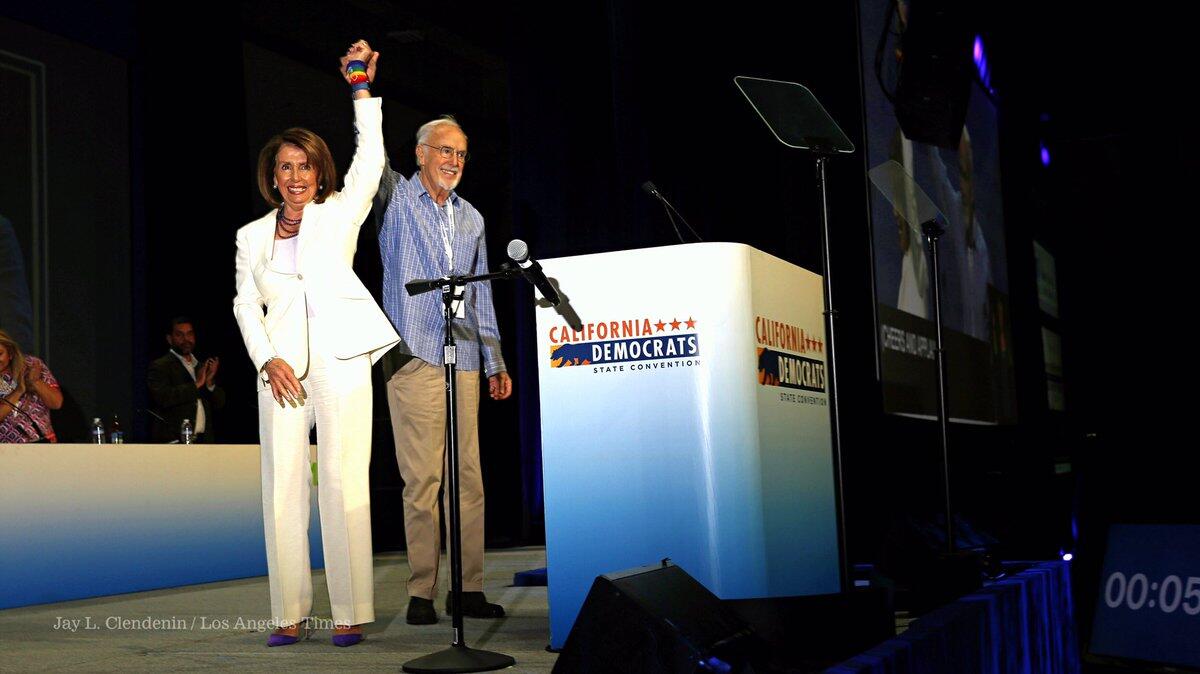
House Minority Leader Nancy Pelosi said on Saturday that Republicans in Washington are blocking efforts to investigate allegations of Russian influence in the election of President Trump.
“Trump and the Republicans in Congress must stop stonewalling our quest for the facts,” Pelosi told delegates to the California Democratic Party convention in Sacramento.
On Wednesday, a special counsel was appointed to investigate Russian meddling in the 2016 election and possible collusion between Russian agents and associates of President Trump. The president later called the effort a “witch hunt” and said there was no collusion between his campaign and Russian officials.
Pelosi told delegates to the convention that the selection of Robert S. Mueller III as special prosecutor isn’t enough to determine exactly what happened.
“We must continue to press for an independent outside commission to get the truth for the American people,” Pelosi said to applause.
The San Francisco Democrat also took jabs at what she called the “cruel agenda” of Trump and congressional Republicans, singling out efforts to repeal the Affordable Care Act.
“California Democrats confront the Trump agenda with a party that is strong, dynamic and growing,” she said.
- Share via
Rallies, F-bombs and a raucous start to the California Democratic Party convention
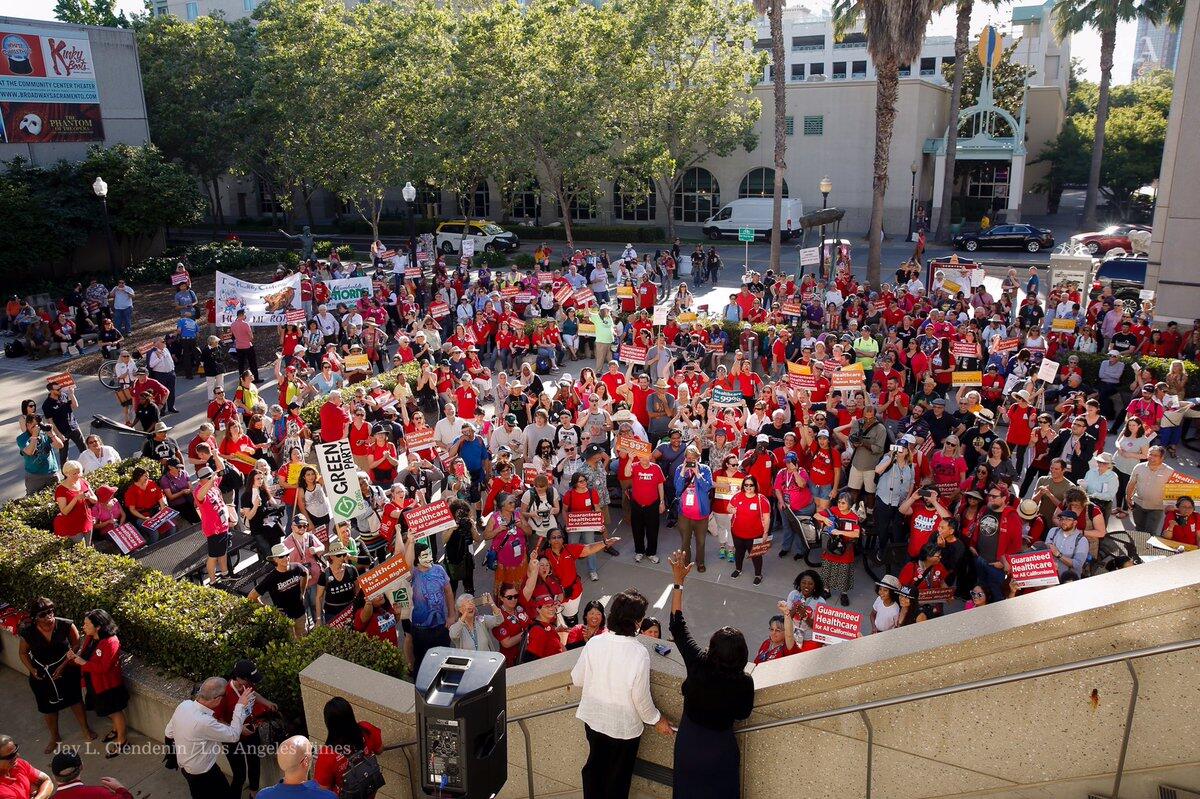
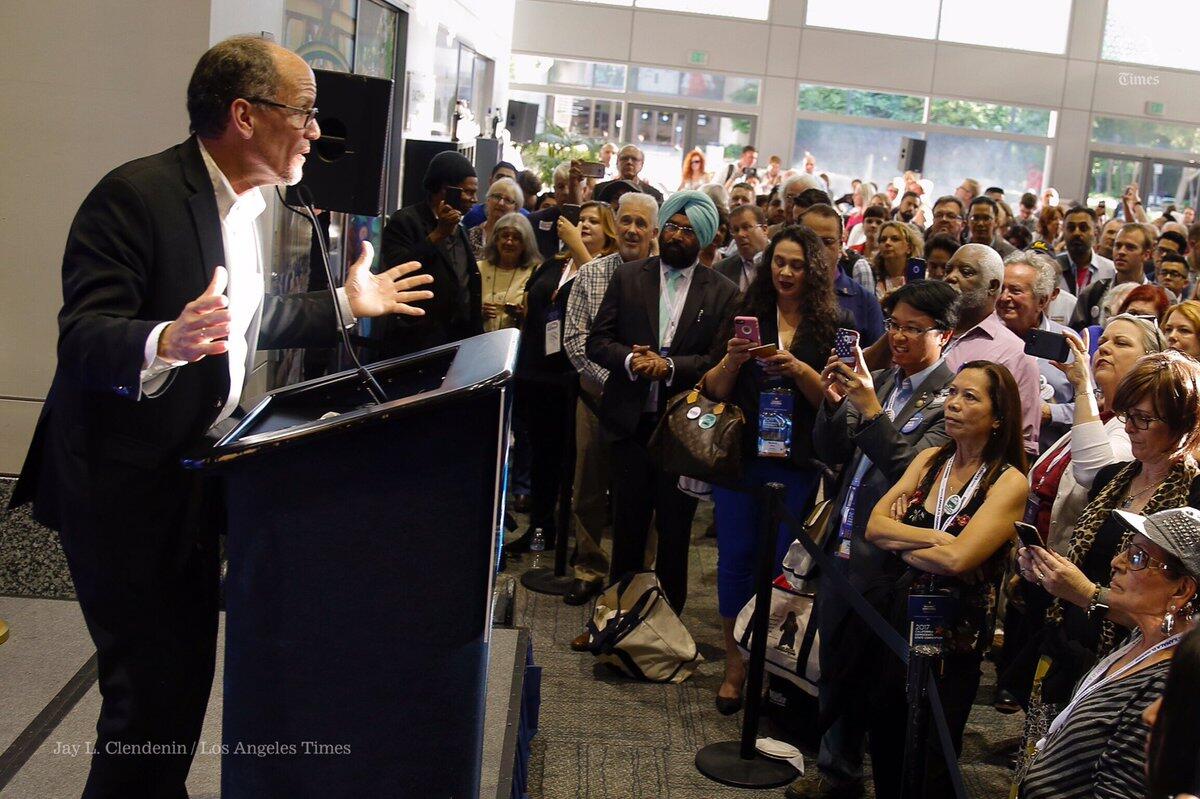
The California Democratic Party convention started with a bang Friday night, with protesters disrupting speeches at the official kickoff and state party Chairman John Burton unleashing a series of F-bombs aimed at the demonstrators.
The chanting began when Sacramento Mayor Darrell Steinberg and Burton stepped up to the podium in a cavernous hall at the state capital’s convention center, with protesters shouting demands that the party reject corporate donations and work to implement a single-payer healthcare system.
Burton, known for his salty language, lashed out quickly. He told protesters that the Democratic Party had been fighting for single-payer healthcare “since before you were born.”
“Hey, shut the ... up or go outside,” Burton said.
“Parade all you want, but unless we put it on the ballot or elect new Democrats you can walk up and down the street and people still aren’t going to have decent healthcare. So let’s get with it.”
Democratic National Committee Chairman Tom Perez headlined the kickoff event and, seemingly accustomed to such a reception, delivered his speech in almost a thunderous shout — loud enough to drown out the chants.
Perez compared the atmosphere to holiday dinner with his extended family and told the hundreds of Democratic delegates in the crowd that, just like family, now was the time for all of them to come together.
“We have a raucous Thanksgiving dinner. We talk about politics. I’m Dominican. So we talk about the other thing, which is baseball,” Perez said. “And then at the end of the day, we get together and talk about our shared values.”
Most of his speech was a pointed rebuke of President Trump, ridiculing the Republican president for his “bromance” with Russian President Vladimir Putin and his push to repeal the Affordable Care Act
“Here’s one big thing we agree on. Donald Trump is an anathema to our values. Donald Trump is the most dangerous president in American history,” said Perez, who served as Labor secretary in the Obama administration. “Donald Trump has to go. And that is why we must work together as Democrats.”
Perez took over as chairman of the Democratic National Committee in February in the wake of the November election, which gave the GOP the White House, both houses of Congress and most of the nation’s governorships and state legislative chambers.
Perez was considered the establishment liberal in his hotly contested race with Rep. Keith Ellison of Minnesota, the choice of the Bernie Sanders wing of the party.
Rick Deutsch, a business professor at the College of the Desert in Palm Desert, was among the protesters shouting loudest. He says Democratic Party leaders haven’t done enough to make single-payer healthcare a reality, even when it had the opportunity. He had no love for Perez.
“When the Democrats had full control of the House and Senate and presidency, we still ended up with a Republican healthcare plan,” Deutsch said. “I don’t want to hear from Tom Perez. Once again, the only thing we hear from him is platitudes.”
But Teddy Gray King, a Piedmont councilwoman and Democratic delegate, wasn’t too happy about the protests — especially those aimed at Burton — saying there is “no greater progressive in California.”
“Our country is hurting right now, and those of us in the Democratic Party believe strongly that our election was stolen from us,” King said. “We’re like a family. We’re taking it out on each other. It angers me. It saddens me.”
- Share via
California Politics Podcast: Here’s what we’re watching at the California Democratic Party convention
Thousands of Democrats are gathering in Sacramento this weekend for a convention full of political questions, perhaps more than at any time in a generation.
On this week’s California Politics Podcast, we take a closer look at some of the biggest items to watch. That includes a fascinating -- and intense -- race for leader of the state party, and how Democratic candidates for governor will be seeking some early support from key constituencies in Sacramento.
I’m joined by Times staff writer Melanie Mason and Marisa Lagos of KQED News.
- Share via
Tom Steyer says (again) he’s not running for California governor — but he’s in retail politics mode
Billionaire environmentalist Tom Steyer was one of several declared and potential candidates for governor seen roaming the halls of the Sacramento Convention Center on Friday, the opening day of the California Democrats’ three-day convention.
But, like many others, he remained coy about his plans, saying, “We are considering our options.”
He rushed off after answering a couple questions from reporters, but stopped when he was approached by political activist Basil Kimbrew, who asked for Steyer’s help in tackling veteran homelessness.
“I’ve been reading a lot about him and what he does and how sincere he is,” said Kimbrew, 63, of La Puente. “I’m very impressed that he did take the time.”
- Share via
Democratic leaders may be forced to disclose outside political consulting contracts
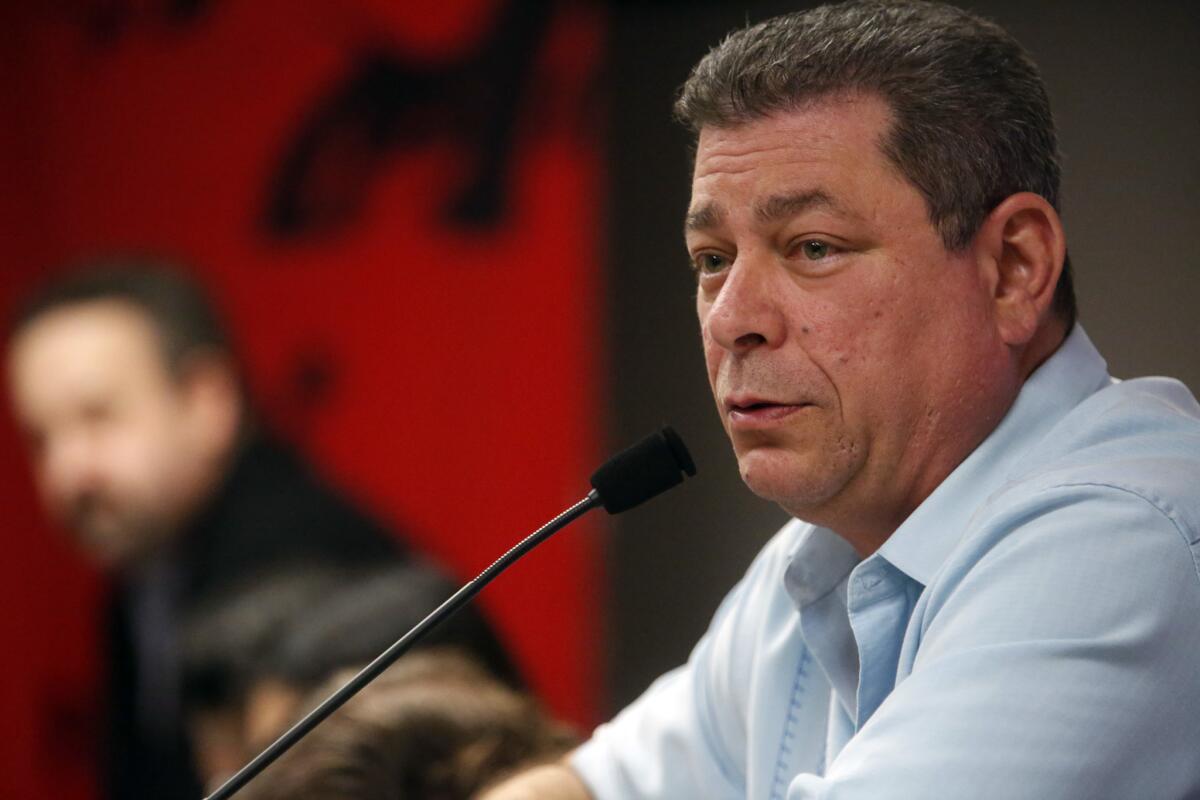
The California Democratic Party on Friday came closer to adopting a new policy that would require party leaders to fully disclose any compensation they receive to advocate for a statewide ballot initiative or candidate for state office.
The push for transparency comes after Eric Bauman, chairman of the Los Angeles County Democratic Party and a candidate for state party chair, faced criticism after his political consulting firm was paid by opponents of Proposition 61, which voters rejected on Nov. 8.
The contract has become a pivotal issue in the party’s contentious race for party chair between Bauman and Kimberly Ellis, a Democratic organizer who has become the favored candidate among many Bernie Sanders supporters.
Democratic delegates are scheduled to vote on a new party chairperson on Saturday.
Democrat Susie Shannon of Los Angeles said the new policy would show that party leaders “are not for hire.”
Bauman’s firm, Victoryland Partners in North Hollywood, received more than $100,000 from the pharmaceutical industry that opposed the statewide ballot measure. The proposition sought to lower prescription drug prices by requiring that state agencies pay no more for medicines than the federal Department of Veterans Affairs.
The measure requiring disclosure came before the rules committee at the California Democratic Party’s annual convention in Sacramento Friday, and could be adopted by party’s executive committee meeting this summer.
“What is at the core of this party is transparency,” said Shannon, who proposed the measure. “We have a right to know when we’re being lobbied by executive board members.”
Under the rule, party officers will be required to file quarterly financial disclosures that list compensation they receive working for candidates or ballot measures. All party leaders would be required to disclose those contracts when contacting party officials, including members of county central committees and other delegates.
When the proposal was first introduced at a party meeting in November, Bauman said he was “100%” in favor of the measure.
- Share via
Delegates gather at the California Democratic Party convention
- Share via
‘Calexit’ supporters to take another shot at securing California independence
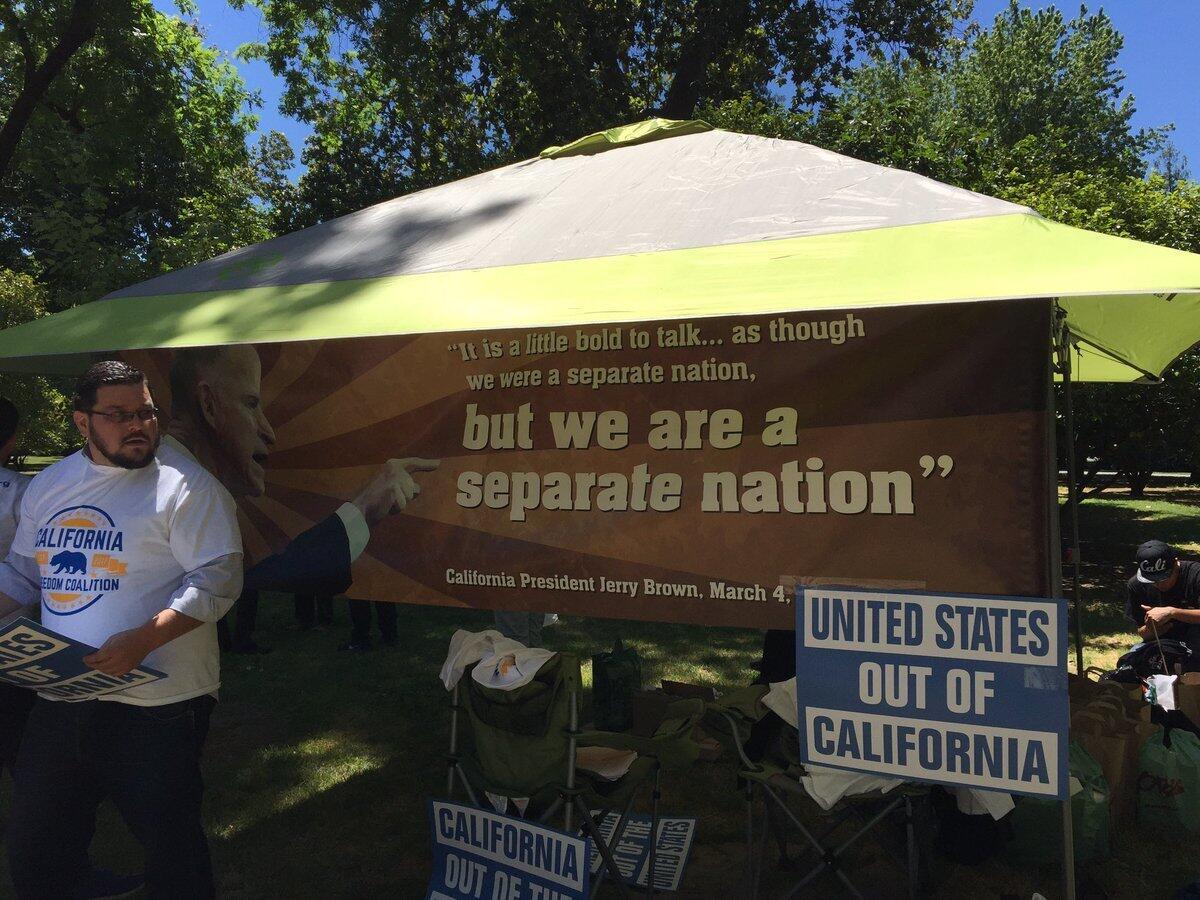
Supporters of a bid for California independence are again submitting plans for a 2018 statewide ballot measure to potentially leave the United States.
Members of the California Freedom Coalition gathered outside the state Capitol on Friday before turning in their proposed initiative to the state attorney general’s office for review.
Cindy Sheehan, who gained international attention as an anti-war protestor after her son died during the Iraq war in 2004, told the Los Angeles Times at the gathering that the state should stop subsidizing a federal government that she characterized as out of step with California values.
“We don’t feel like we have a say 3,000 miles away in Washington,” Sheehan said.
The petition, known informally as Calexit, is the second formal bid that secessionists have made since President Trump’s election in November, though numerous organizations have attempted similar efforts over the years. Backers pulled the first initiative after substantial infighting within groups advocating for independence.
The current initiative wouldn’t necessarily result in the state exiting the country, but could allow California to be a “fully functioning sovereign and autonomous nation” within the United States.
After receiving the ballot measure, the attorney general’s office will give it a title and summary. Backers will need to collect nearly 600,000 valid voter signatures on petitions to place it on the ballot.
- Share via
Gov. Jerry Brown is skipping this weekend’s California Democratic Party convention
- Share via
‘Am I getting money from Russia? No,’ Rep. Dana Rohrabacher says
Rep. Dana Rohrabacher laughed when a reporter from The Hill newspaper asked Friday whether he is getting paid by Russia.
“Am I getting money from Russia? No,” the Huntington Beach Republican said.
The question stemmed from a Washington Post story this week that disclosed an audio recording from last year in which House Majority Leader Kevin McCarthy (R-Bakersfield) said he thought Rohrabacher and then-candidate Donald Trump were being paid by Russian President Vladimir Putin.
A transcript of the tape notes McCarthy and others in the room were laughing, and McCarthy’s staff has said it was meant as a joke and it landed poorly.
“That was a joke that didn’t make it,” Rohrabacher told The Hill, adding that he and McCarthy are friends.
For decades, Rohrabacher’s willingness to work with Russia has made him a bit of an outlier within the Republican Party, and people have questioned his stance repeatedly.
Rohrabacher told The Hill that McCarthy has apologized for the joke and for the attention it has caused. Rohrabacher’s Orange County district is a target for Democrats in the midterms.
And Rohrabacher’s 2018 opponents have jumped on the congressman’s longstanding friendliness toward Russia as a campaign issue, with one, Democrat Harley Rouda, even sending a letter asking the FBI to investigate.
The New York Times reported Friday that the FBI warned Rohrabacher a few years ago that Russian spies were trying to recruit him.
Rohrabacher told the New York Times that he appreciated the warning but didn’t need it.
“Any time you meet a Russian member of their Foreign Ministry or the Russian government, you assume those people have something to do with Russian intelligence,” he said.